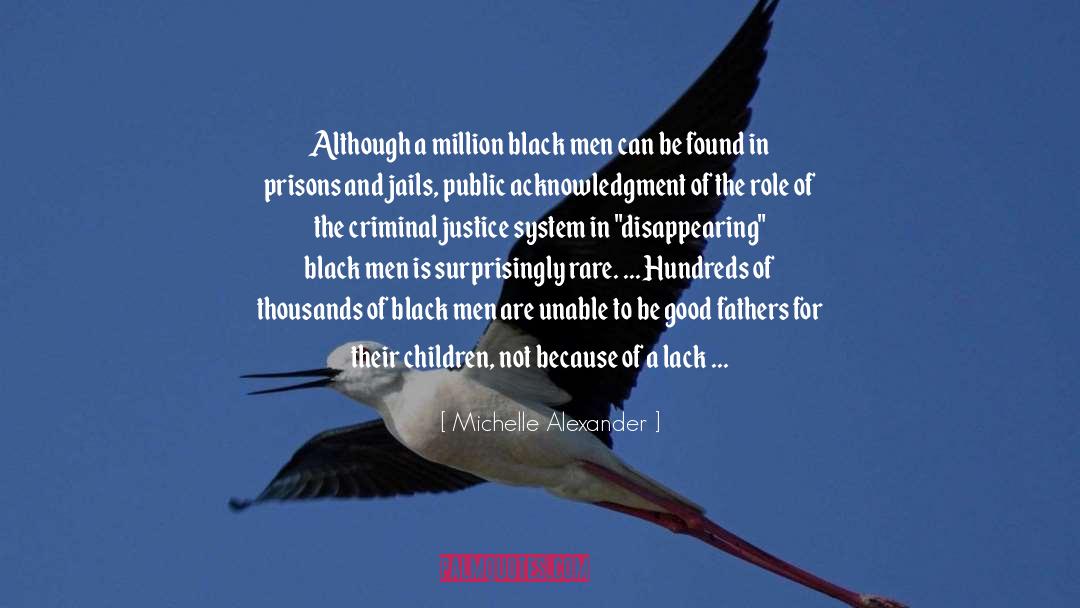Michelle Alexander Famous Quotes
Reading Michelle Alexander quotes, download and share images of famous quotes by Michelle Alexander. Righ click to see or save pictures of Michelle Alexander quotes that you can use as your wallpaper for free.
The NYPD began collecting data on pedestrian stops following the shooting of Amadou Diallo, an African immigrant who died in a hail of police bullets on the front steps of his own home in February 1999. Diallo was followed to his apartment building by four white police officers - members of the elite Street Crime Unit - who viewed him as suspicious and wanted to interrogate him. They ordered him to stop, but, according to the officers, Diallo did not respond immediately. He walked a bit farther to his apartment building, opened the door, and retrieved his wallet - probably to produce identification. The officers said they thought the wallet was a gun, and fired forty-one times. Amadou Diallo died at the age of twenty-two. He was unarmed and had no criminal record.
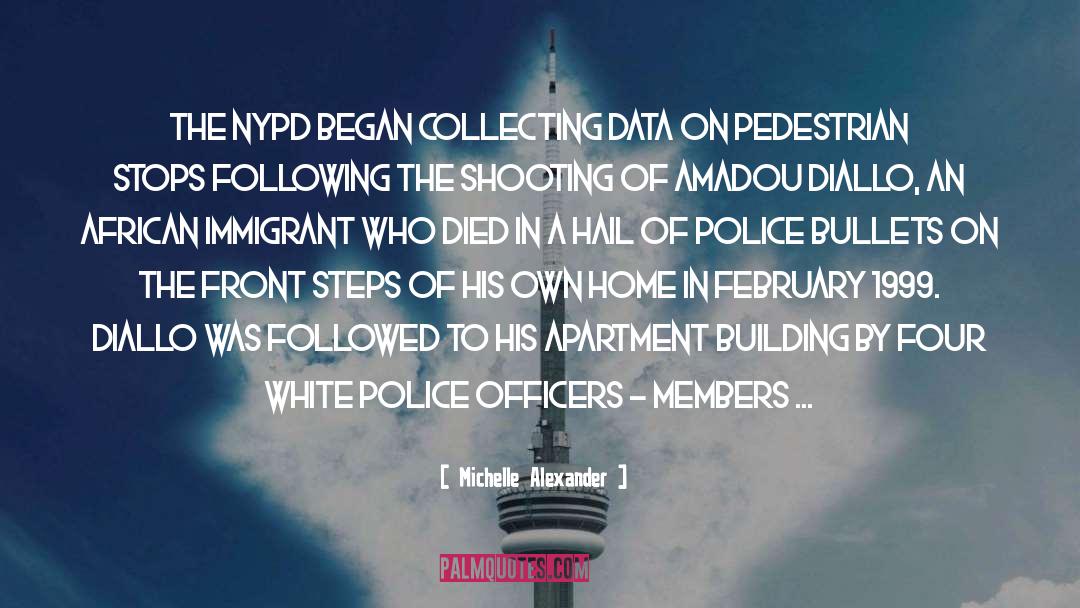
The same drug that had been considered fearsome twenty years earlier, when associated with African Americans and Latinos, was refashioned as a relatively harmless drug when associated with whites.
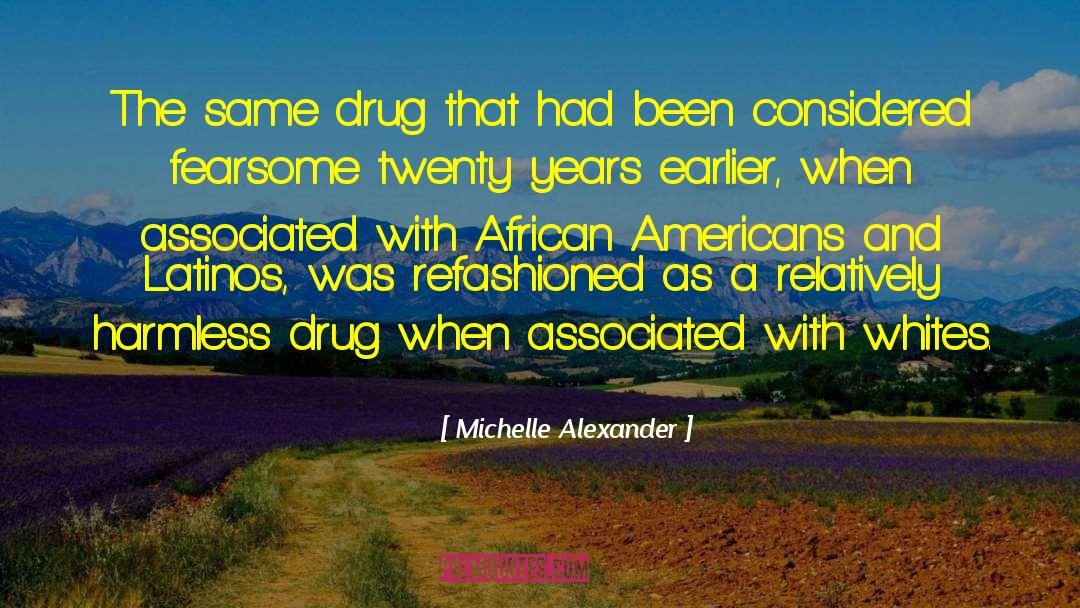
As recently as the mid-1970s, the most well-respected criminologists were predicting that the prison system would soon fade away. Prison did not deter crime significantly, many experts concluded. Those who had meaningful economic and social opportunities were unlikely to commit crimes regardless of the penalty, while those who went to prison were far more likely to commit crimes again in the future.
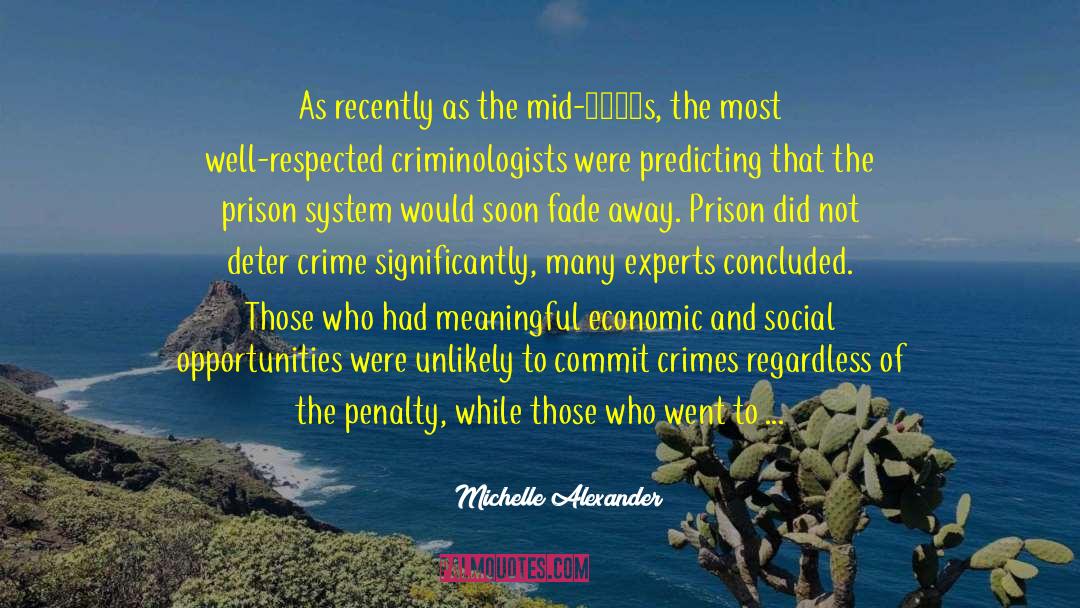
If shackling former prisoners with a lifetime of debt and authorizing discrimination against them in employment, housing, education, and public benefits is not enough to send the message that they are not wanted and not even considered full citizens, then stripping voting rights from those labeled criminals surely gets the point across.
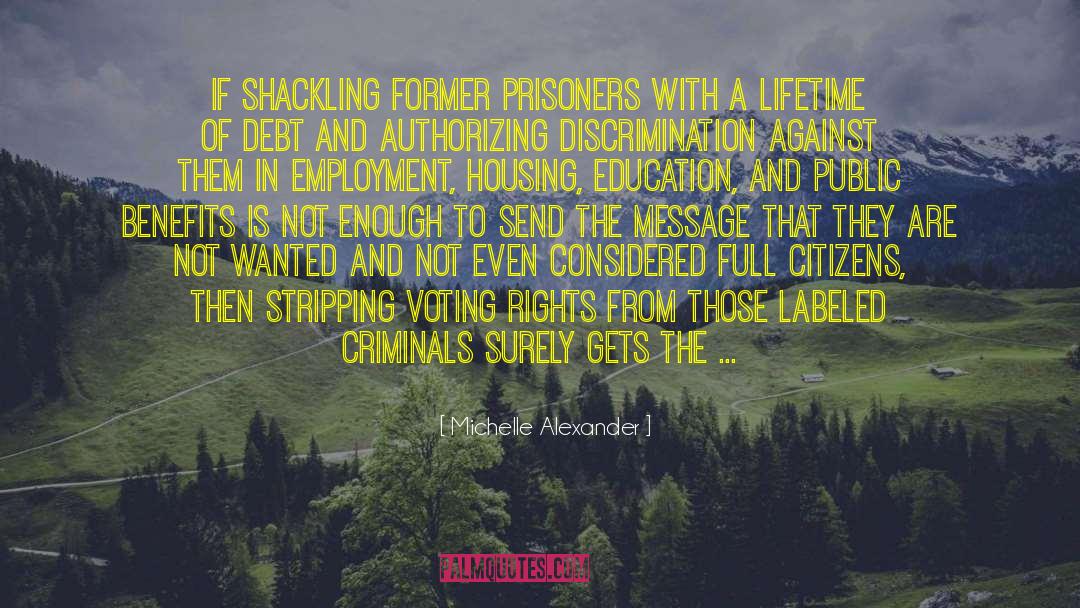
If we continue to tell ourselves the popular myths about racial progress or, worse yet, if we say to ourselves that the problem of mass incarceration is just too big, too daunting for us to do anything about and that we should instead direct our energies to battles that might be more easily won, history will judge us harshly. A human rights nightmare is occurring on our watch.
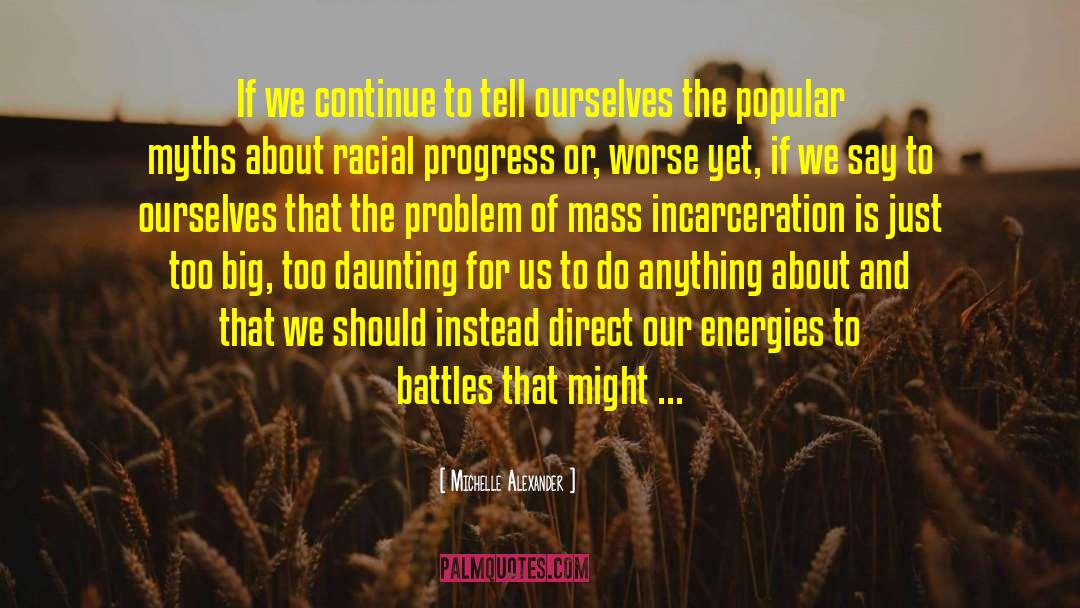
Whiteness mitigates crime, whereas blackness defines the criminal.
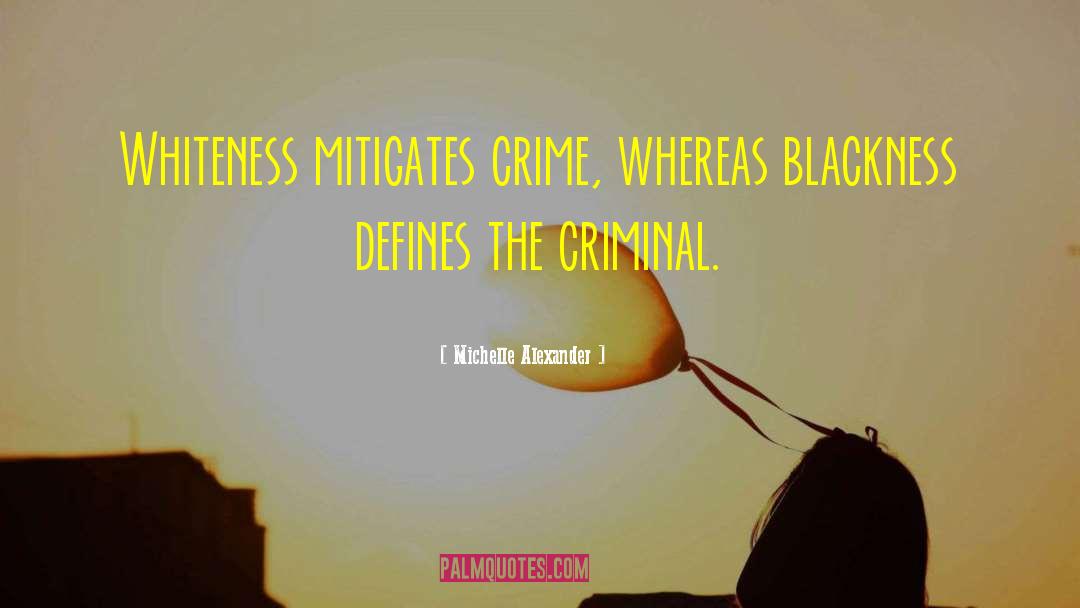
Prior to the Reform Act, the Supreme Court had ruled that the guilt or innocence of the property's owner was irrelevant to the property's guilt - a ruling based on the archaic legal fiction that a piece of property could be "guilty" of a crime. The act remedied this insanity to some extent; it provides an "innocent owner" defense to those whose property has been seized.
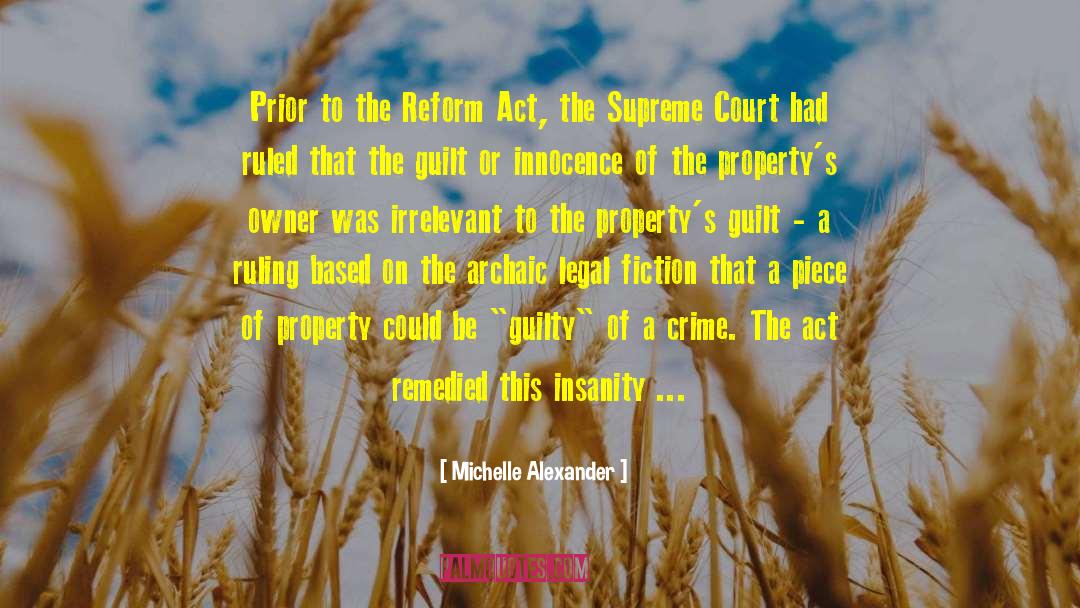
Unless the number of people who are labeled felons is dramatically reduced, and unless the laws and policies that keep ex-offenders marginalized from the mainstream society and economy are eliminated, the system will continue to create and maintain an enormous undercaste.
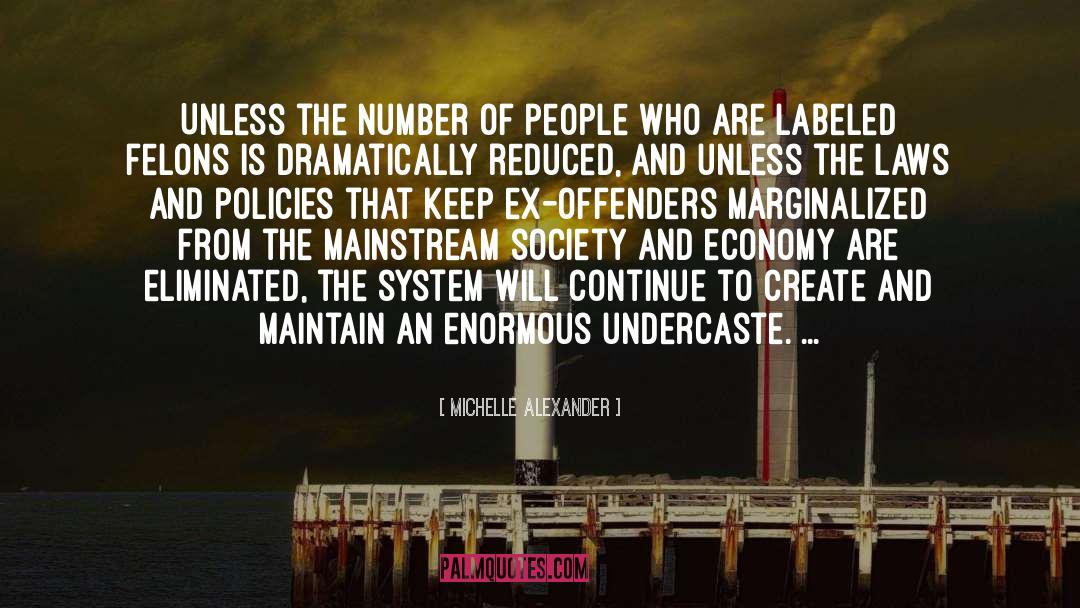
The fact that police are legally allowed to engage in a wholesale roundup of nonviolent drug offenders does not answer the question why they would choose to do so, particularly when most police departments have far more serious crimes to prevent and solve. Why would police prioritize drug-law enforcement?
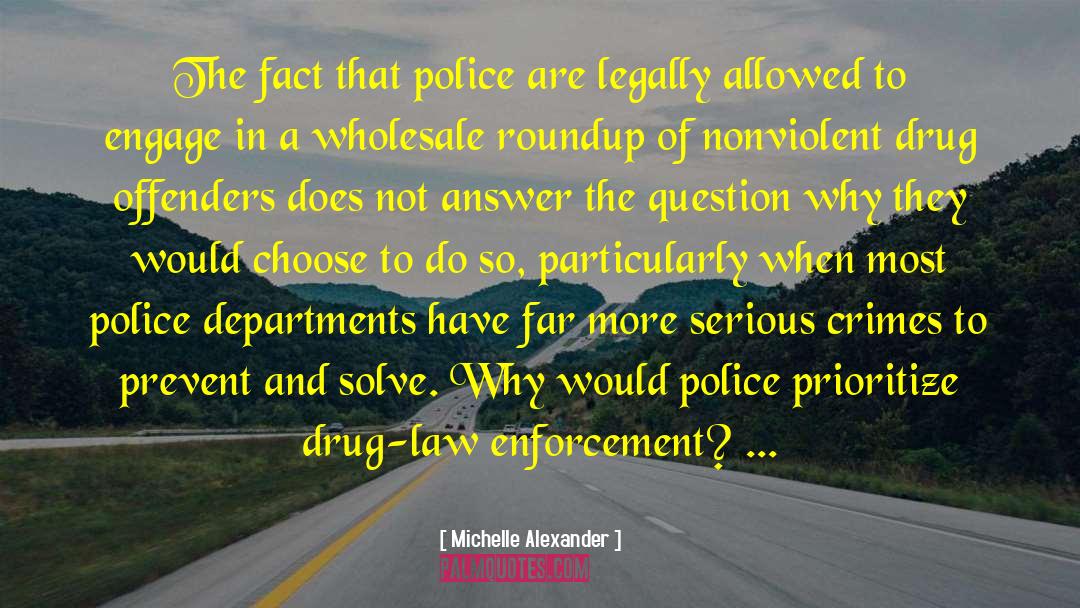
What a growing number of sociologists have found ought to be common sense: by locking millions of people out of the mainstream legal economy, by making it difficult or impossible for people to find housing or feed themselves, and by destroying familial bonds by warehousing millions for minor crimes, we make crime more - not less - likely in the most vulnerable communities.
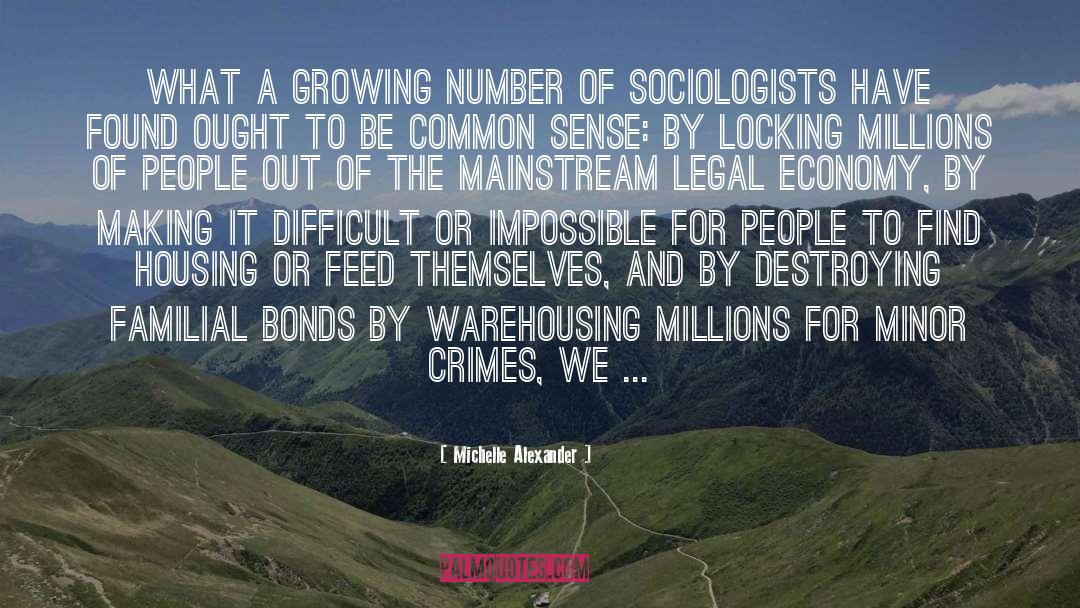
In 1985, in Batson v. Kentucky, the Court held that the Fourteenth Amendment prohibits prosecutors from discriminating on the basis of race when selecting juries, a ruling hailed as an important safeguard against all-white juries locking up African Americans based on racial biases and stereotypes.
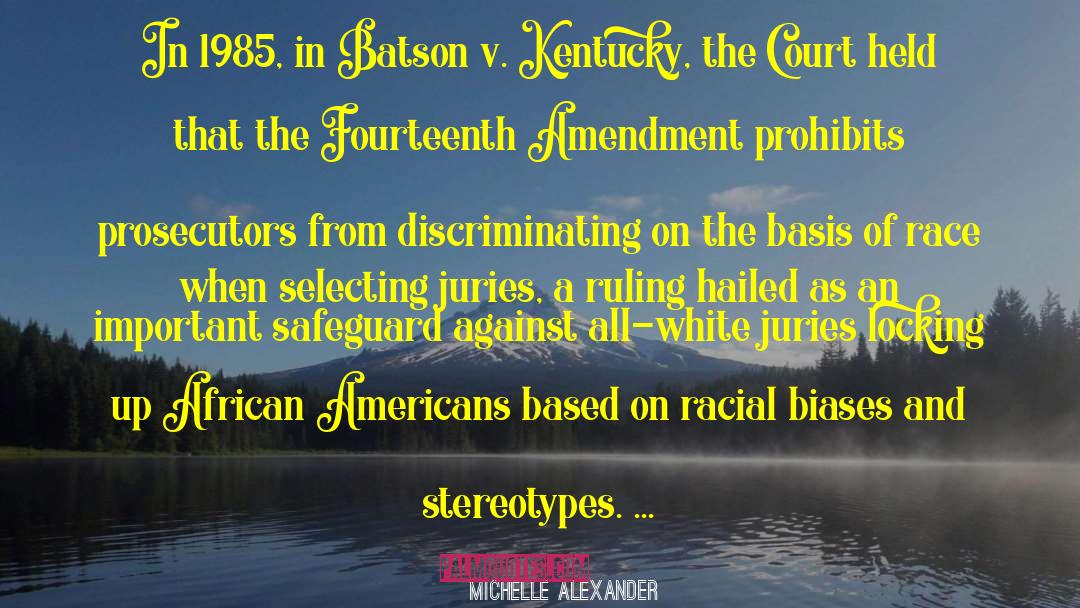
In 'United States v. Brignoni-Ponce,' the Court concluded that it was permissible under the equal protection clause of the Fourteenth Amendment for the police to use race as a factor in making decisions about which motorists to stop and search. In that case, the Court concluded that the police could take a person's Mexican appearance into account when developing reasonable suspicion that a vehicle may contain undocumented immigrants. The Court said that "the likelihood that any person of Mexican ancestry is an alien is high enough to make Mexican appearance a relevant factor." Some commentators have argued that 'Brignoni-Ponce' may be limited to the immigration context; the Court might not apply the same principle to drug-law enforcement. It is not obvious what the rational basis would be for limiting overt race discrimination by police to immigration. The likelihood that a person of Mexican ancestry is an "alien" could not be significantly higher than the likelihood that any black person is a drug criminal.
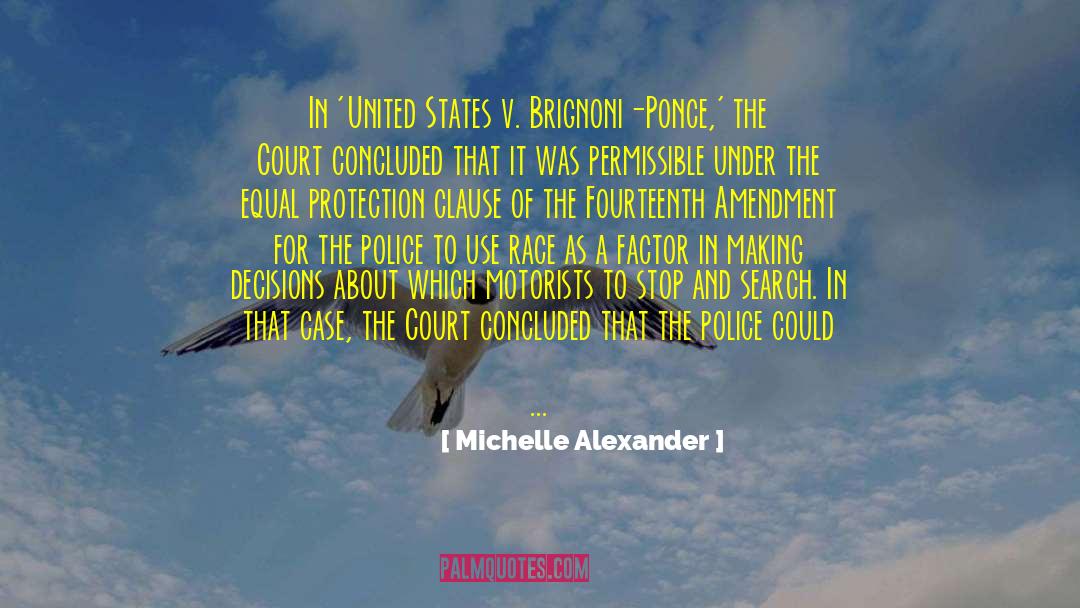
Viewed as a whole, the relevant research by cognitive and social psychologists to date suggests that racial bias in the drug war was inevitable, once a public consensus was constructed by political and media elites that drug crime is black and brown.
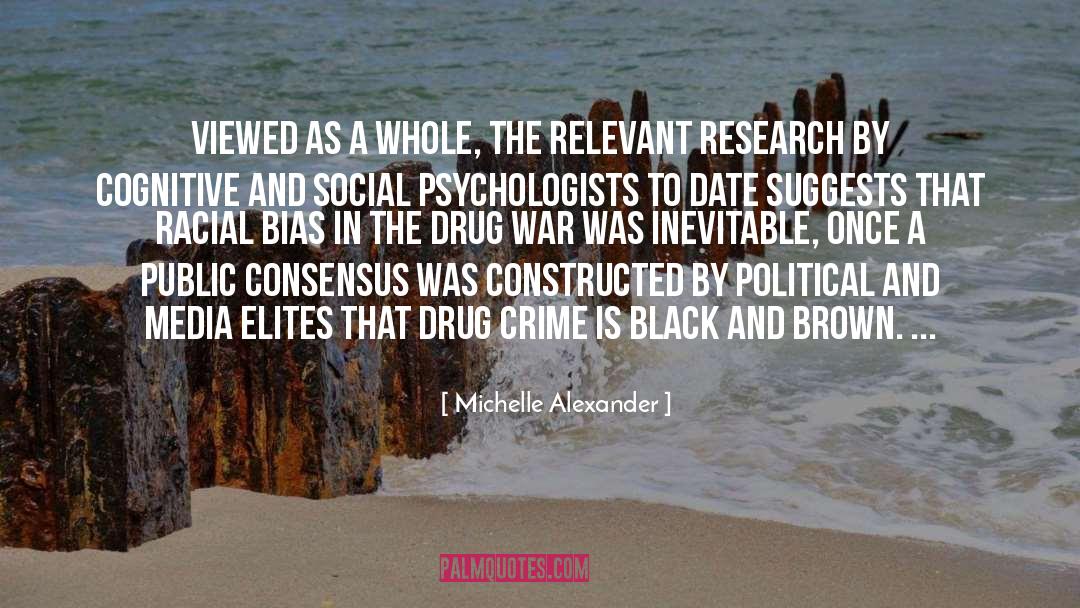
As historian Gerald McKnight observes, "King was proposing nothing less than a radical transformation of the Civil Rights Movement into a populist crusade calling for redistribution of economic and political power. America's only civil rights leader was now focusing on class issues and was planning to descend on Washington with an army of poor to shake the foundations of the power structure and force the government to respond to the needs of the ignored underclass.
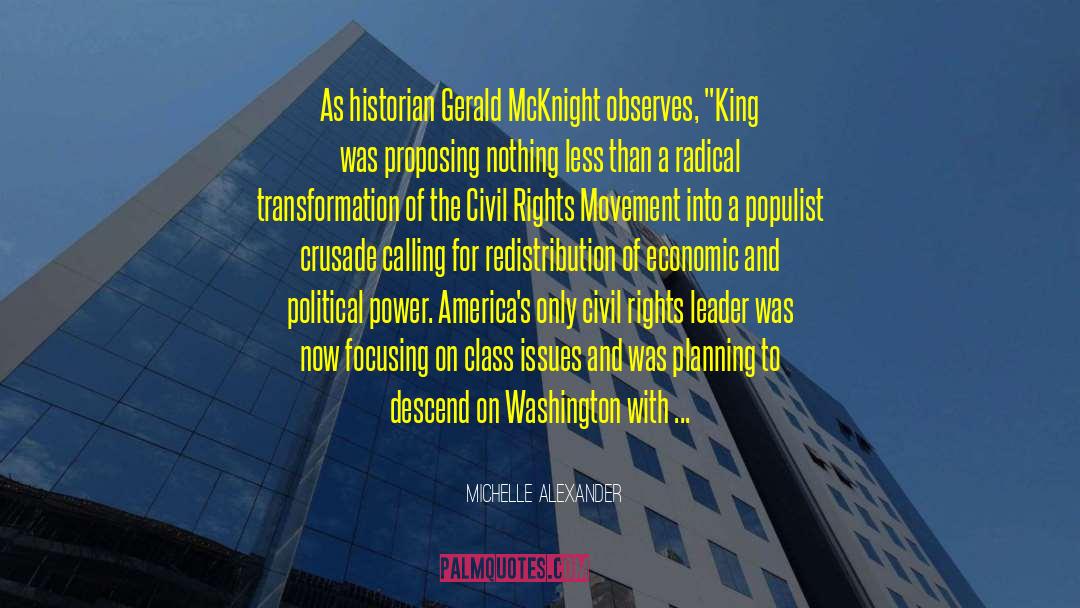
This feat has been achieved largely by appealing to the racism and vulnerability of lower-class whites, a group of people who are understandably eager to ensure that they never find themselves trapped at the bottom of the American totem pole.
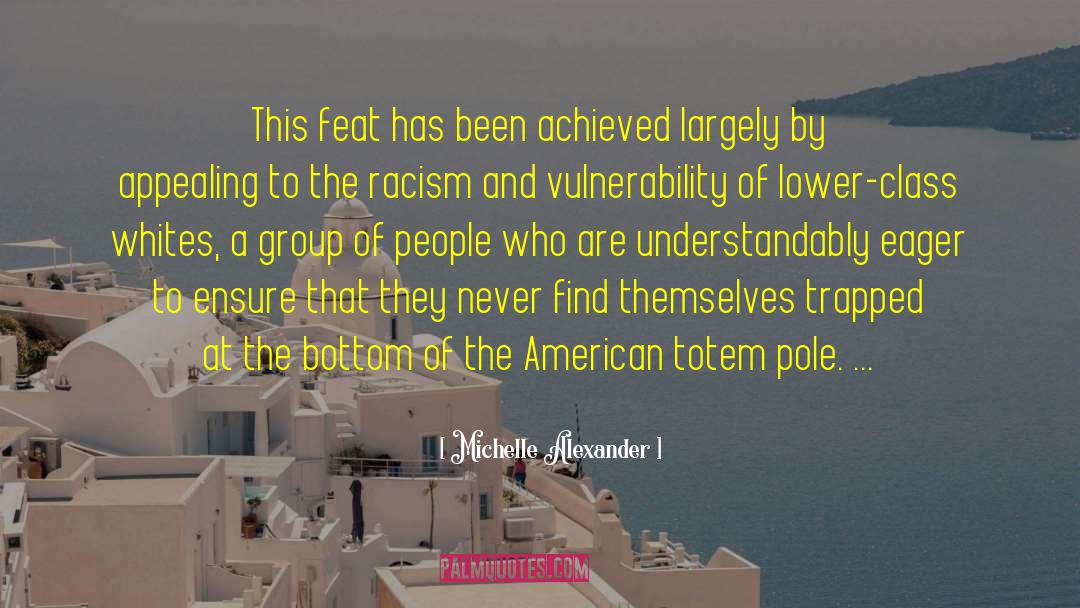
Parents and schoolteachers counsel black children that, if they ever hope to escape this system and avoid prison time, they must be on their best behavior, raise their arms and spread their legs for the police without complaint, stay in failing schools, pull up their pants, and refuse all forms of illegal work and moneymaking activity, even if jobs in the legal economy are impossible to find. Girls are told not to have children until they are married to a "good" black man who can help provide for a family with a legal job. They are told to wait and wait for Mr. Right even if that means, in a jobless ghetto, never having children at all.
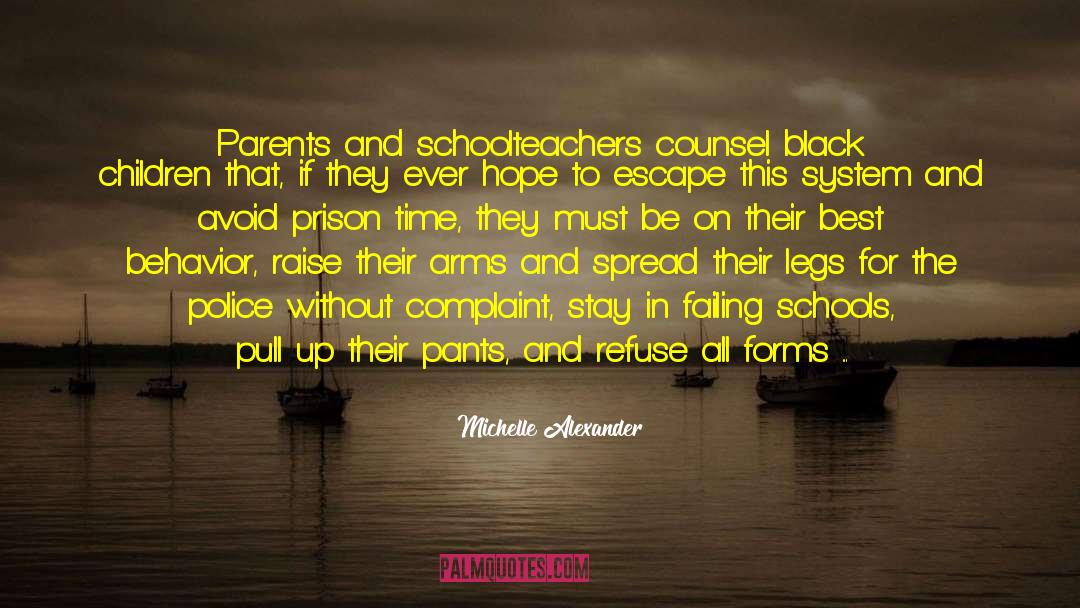
In the words of then - vice president Richard Nixon, the increasing crime rate "can be traced directly to the spread of the corrosive doctrine that every citizen possesses an inherent right to decide for himself which laws to obey and when to disobey them."37
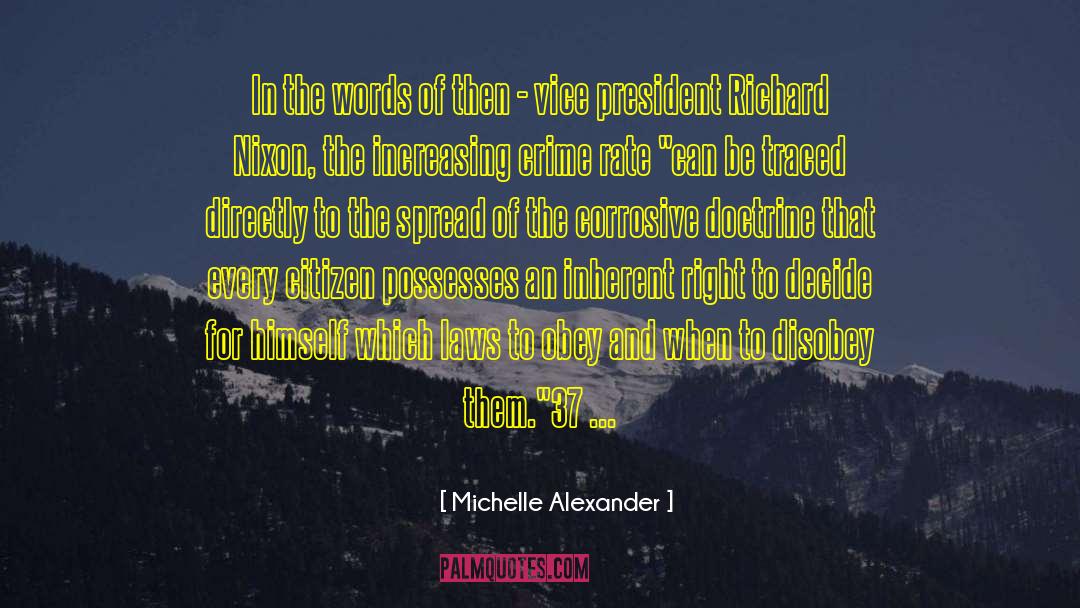
Perhaps most heroic are those who, upon release, launch social justice organizations that challenge the discrimination ex-offenders face and provide desperately needed support for those newly released from prison.
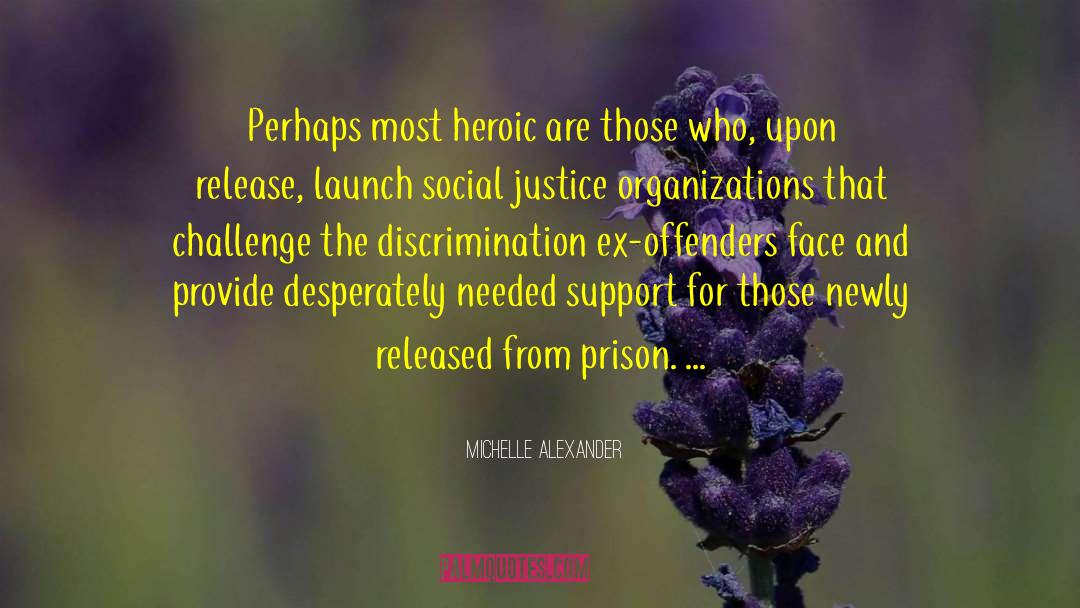
All people make mistakes. All of us are sinners. All of us are criminals. All of us violate the law at some point in our lives. In
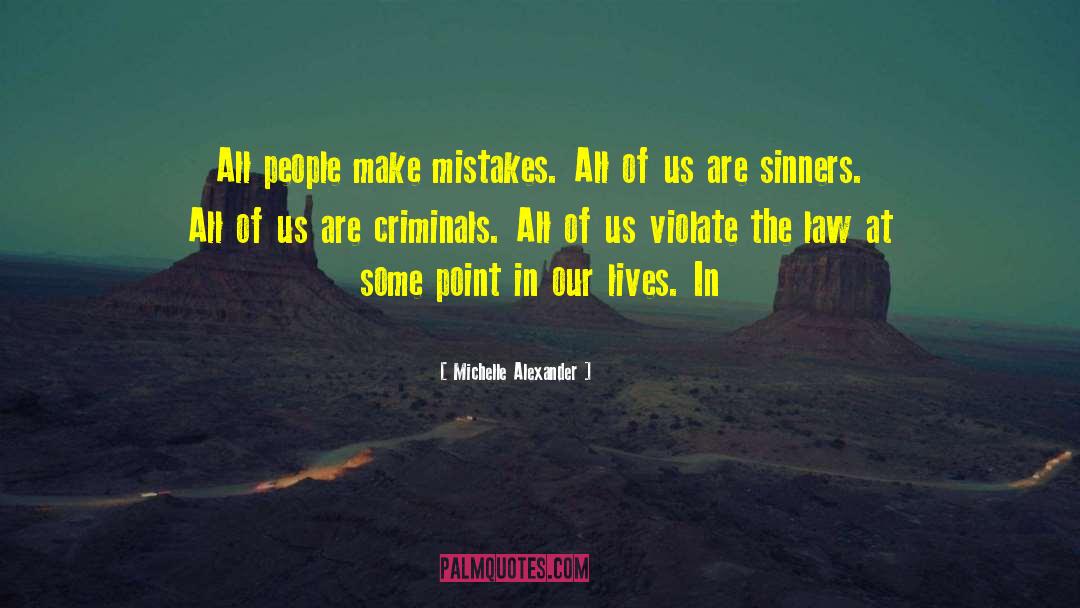
No other country in the world disenfranchises people who are released from prison in a manner even remotely resembling the United States. In fact, the United Nations Human Rights Committee has charged that U.S. disenfranchisement policies are discriminatory and violate international law.
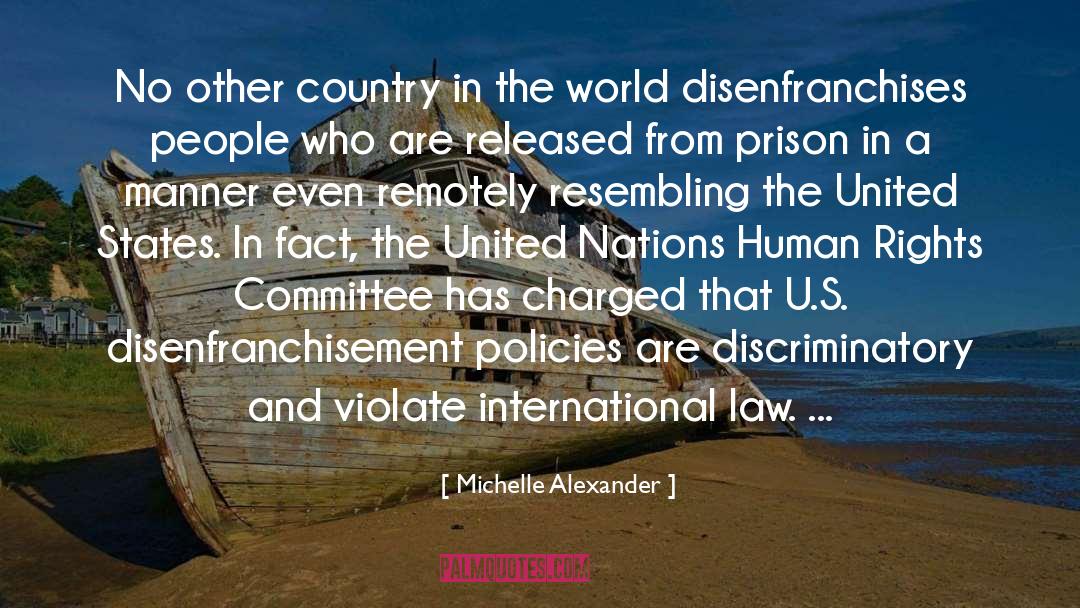
The majority of black women are unmarried today, including 70 percent of professional black women.
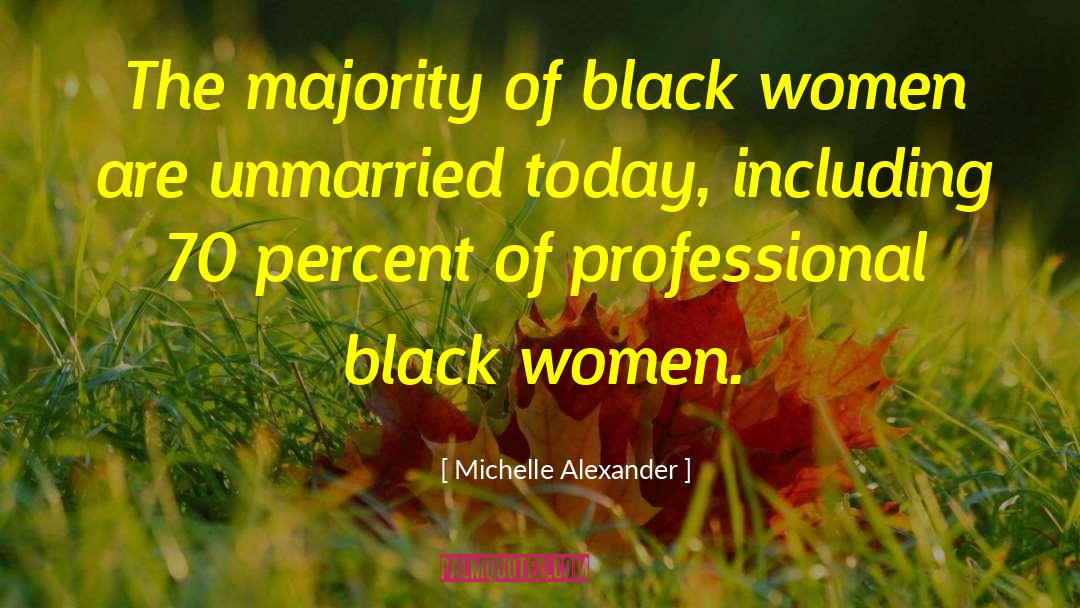
As a society, our collective understanding of racism has been powerfully influenced by the shocking images of the Jim Crow era and the struggle for civil rights. When we think of racism we think of Governor Wallace of Alabama blocking the schoolhouse door; we think of water hoses, lynchings, racial epithets, and "whites only" signs. These images make it easy to forget that many wonderful, good-hearted white people who were generous to others, respectful of their neighbors, and even kind to their black maids, gardeners, or shoe shiners - and wished them well - nevertheless went to the polls and voted for racial segregation.
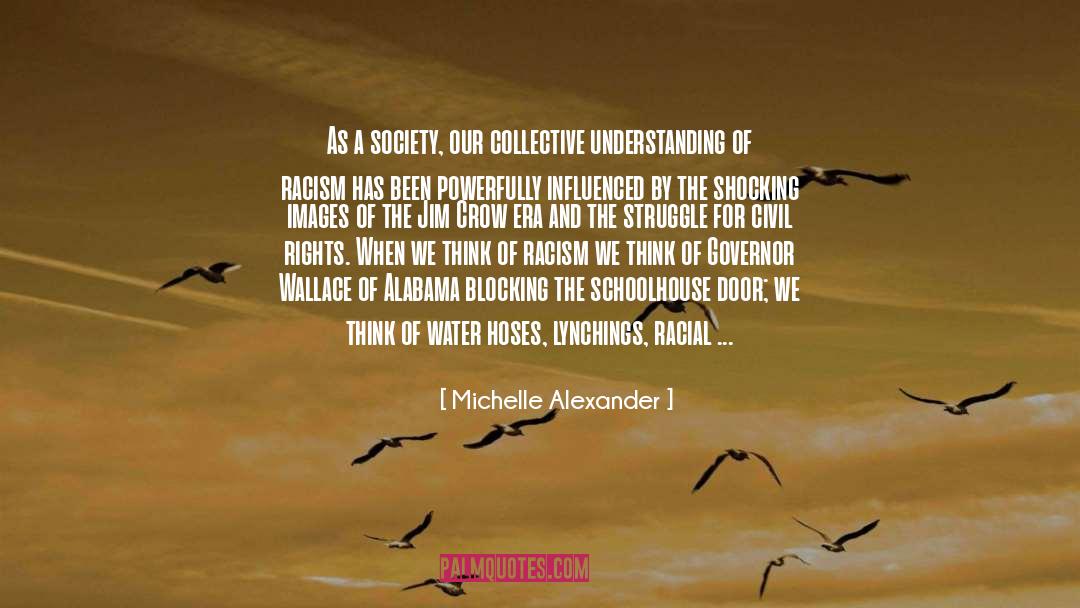
Our understanding of racism is therefore shaped by the most extreme expressions of individual bigotry, not by the way in which it functions naturally, almost invisibly (and sometimes with genuinely benign intent), when it is embedded in the structure of a social system. The
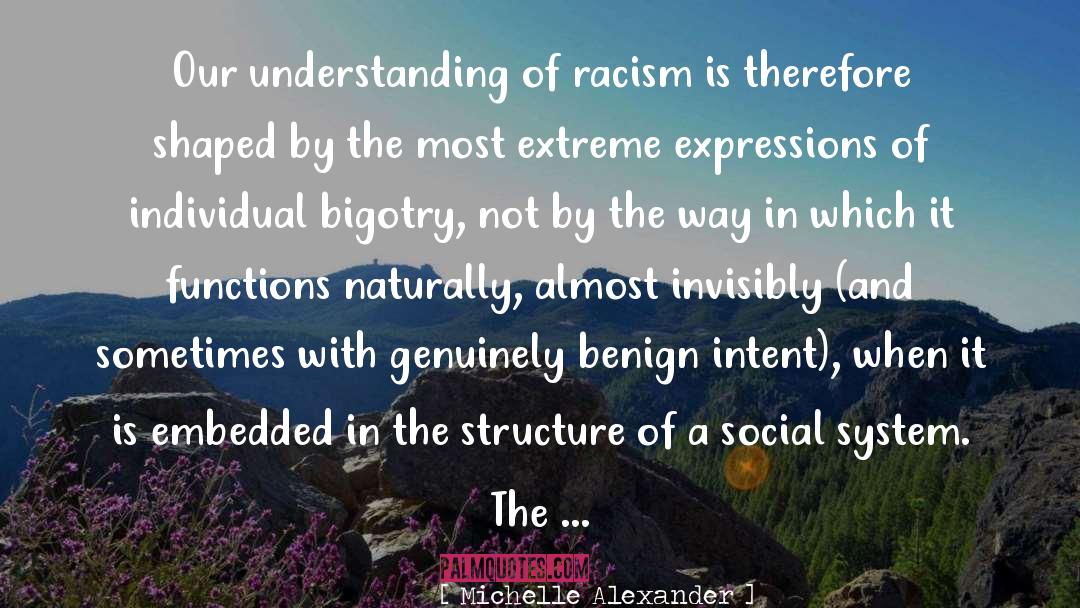
Yet in 1995, a few brave souls challenged the implementation of Georgia's "two strikes and you're out" sentencing scheme, which imposes life imprisonment for a second drug offense. Georgia's district attorneys, who have unbridled discretion to decide whether to seek this harsh penalty, had invoked it against only 1 percent of white defendants facing a second drug conviction but against 16 percent of black defendants. The result was that 98.4 percent of those serving life sentences under the provision were black.
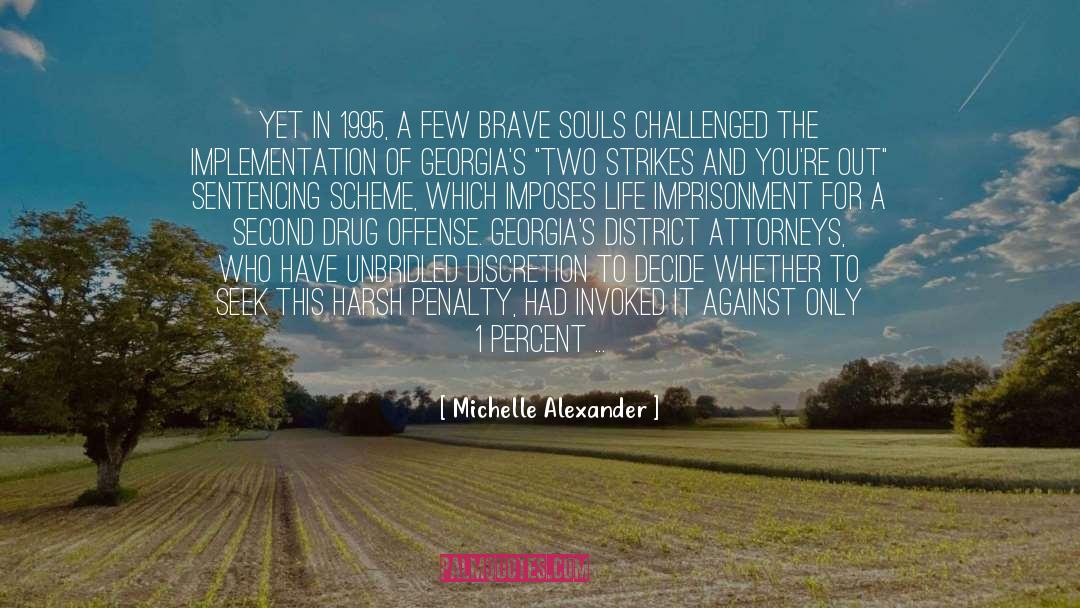
More recently, civil rights groups around the country have helped to launch legal attacks and vobramf campaigns against felon disenfranchisement laws and have strenuously opposed discriminatory crack sentencing laws and guidelines, as well as "zero tolerance" policies that effectively funnel youth of color from schools to jails.
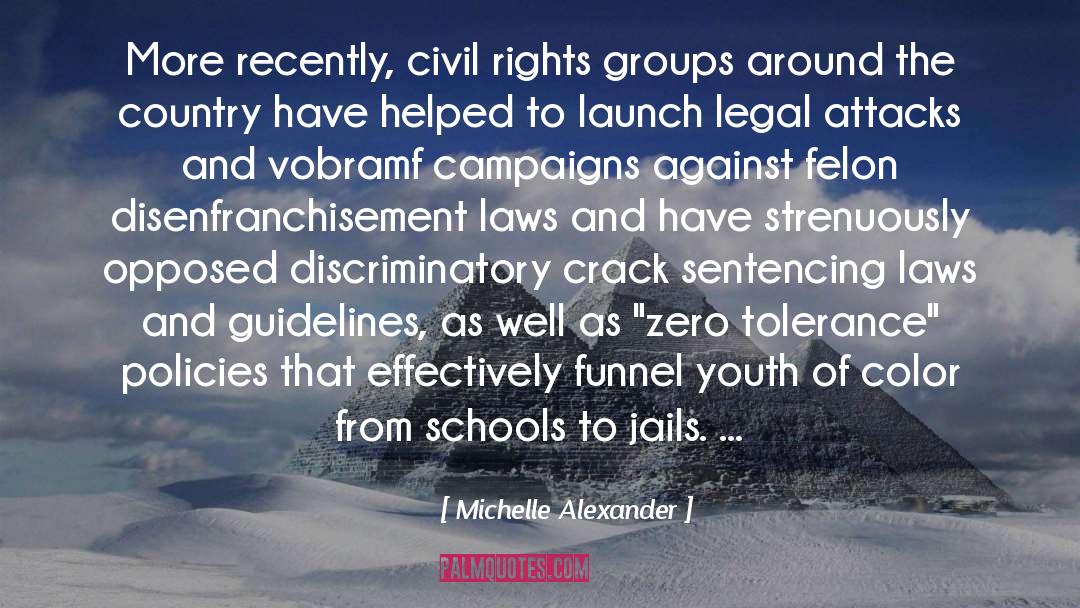
The percentage of drug arrests that result in prison sentences (rather than dismissal, community service, or probation) has quadrupled, resulting in a prison-building boom the likes of which the world has never seen. In two short decades, between 1980 and 2000, the number of people incarcerated in our nation's prisons and jails soared from roughly 300,000 to more than 2 million. By the end of 2007, more than 7 million Americans - or one in every 31 adults - were behind bars, on probation, or on parole.
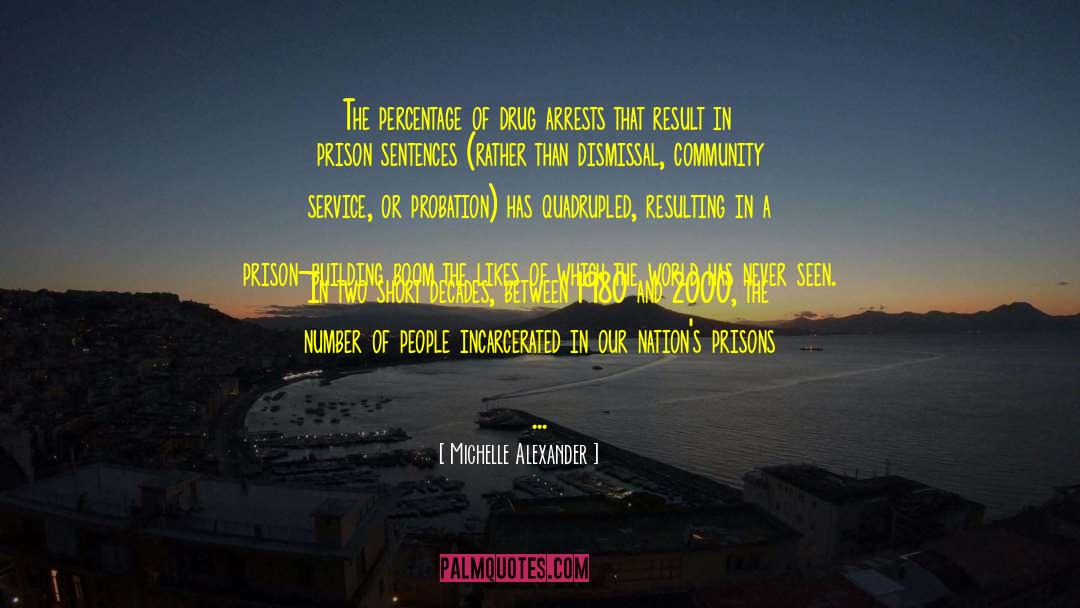
Upon reflection, it is relatively easy to understand how Americans come to deny the evils of mass incarceration. Denial is facilitated by persistent racial segregation in housing and schools, by political demagoguery, by racialized media imagery, and by the ease of changing one's perception of reality simply by changing television channels. There is little reason to doubt the prevailing "common sense" that black and brown men have been locked up en masse merely in response to crime rates when one's sources of information are mainstream media outlets.
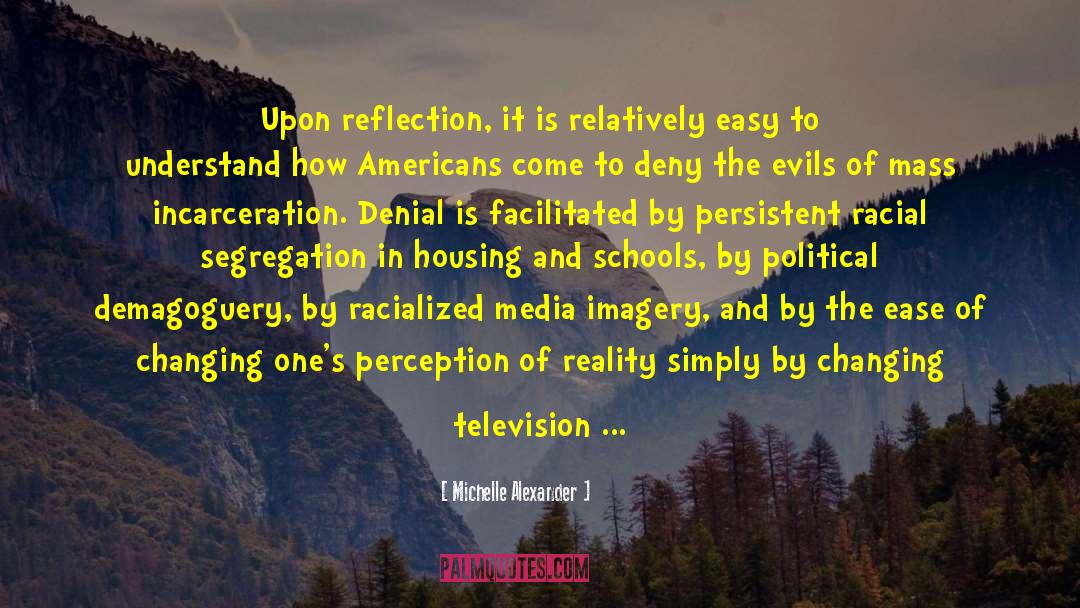
Reagan's promise to enhance the federal government's role in fighting crime was complicated by the fact that fighting street crime has traditionally been the responsibility of state and local law enforcement. After a period of initial confusion and controversy...the Justice Department announced its intention to cut in half the number of specialists assigned to identify and prosecute white collar criminals and to shift its attention to street crime, especially drug-law enforcement.
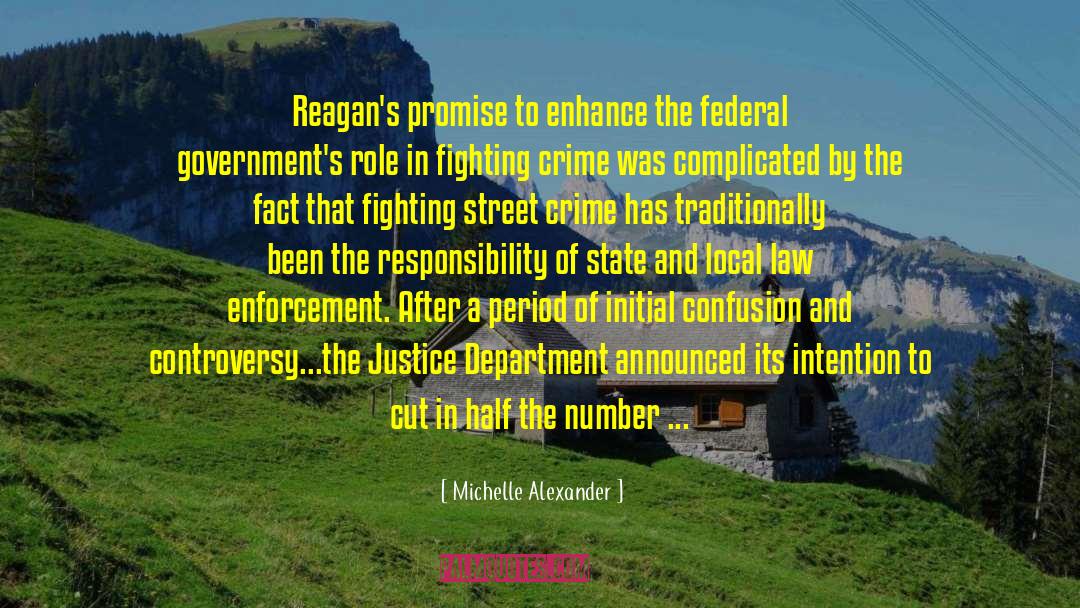
To great effect, Reagan echoed white frustration in race-neutral terms through implicit racial appeals. His 'color-blind' rhetoric on crime, welfare, taxes, and states' rights was clearly understood by white (and black) voters as having a racial dimension, though claims to that effect were impossible to prove. The absence of explicitly racist rhetoric afforded the racial nature of his coded appeals a certain plausible deniability. For example, when Reagan kicked off his presidential campaign at the annual Neshoba County Fair near Philadelphia, Mississippi - the town where three civil rights activists were murdered in 1964 - he assured the crowd 'I believe in states' rights,' and promised to restore to states and local governments the power that properly belonged to them. His critics promptly alleged that he was signaling a racial message to his audience, suggesting allegiance with those who resisted desegregation, but Reagan firmly denied it, forcing liberals into a position that would soon become familiar - arguing that something is racist but finding it impossible to prove in the absence of explicitly racist language.
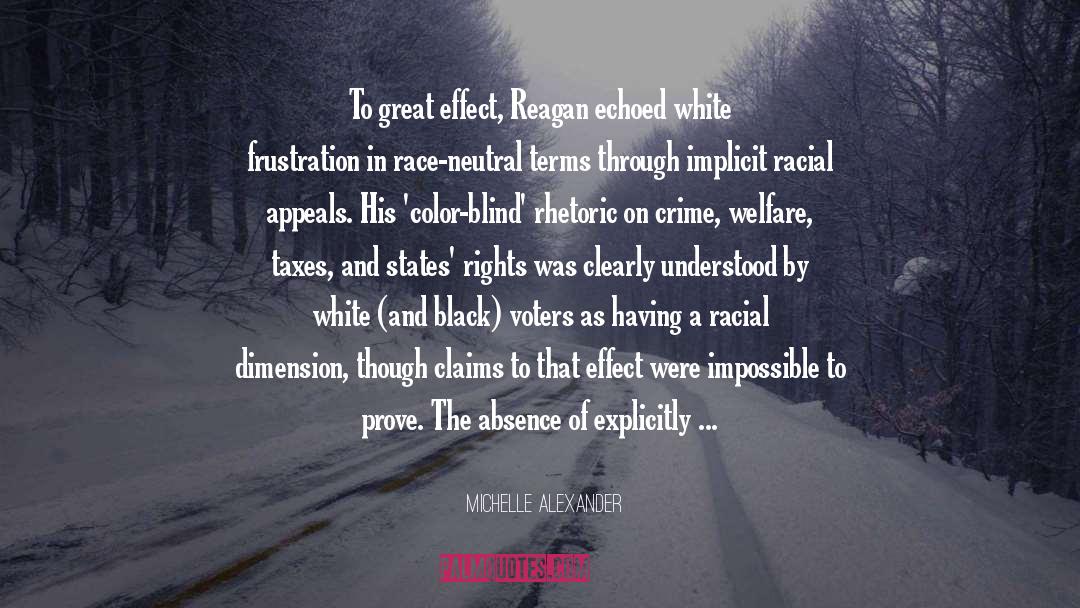
The intuition of those residing in ghetto communities that they had suddenly become disposable was rooted in real changes in the economy - changes that have been devastating to poor black communities as factories have closed, low-skill jobs have disappeared, and all those who had the means to flee the ghetto did. The sense among those left behind that society no longer has use for them, and that the government now aims simply to get rid of them, reflects a reality that many of us who claim to care prefer to avoid simply by changing channels.
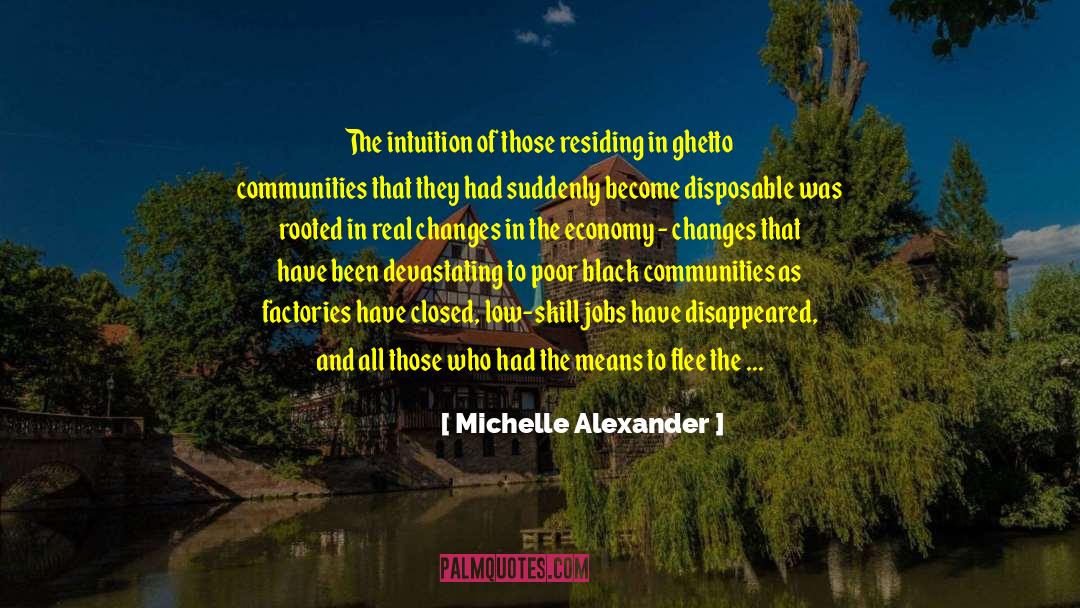
Have we unwittingly exaggerated the importance of individuals succeeding within pre-existing structures of power, and thereby undermined King's call for a "complete restructuring" of our society? Have
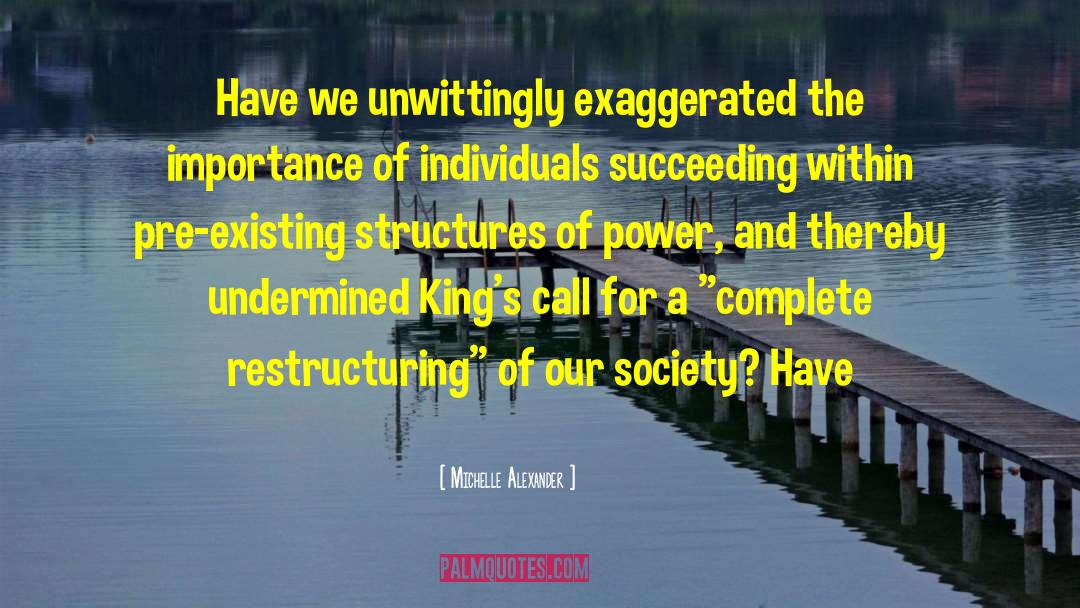
Individuals are forced to make choices in an environment they did not choose. They would surely prefer to have a broader array of good opportunities. The question we should be asking - not instead of but in addition to questions about penal policy - is whether the denizens of the ghetto are entitled to a better set of options, and if so, whose responsibility it is to provide them.

We should hope not for a colorblind society but instead for a world in which we can see each other fully, learn from each other, and do what we can to respond to each other with love.
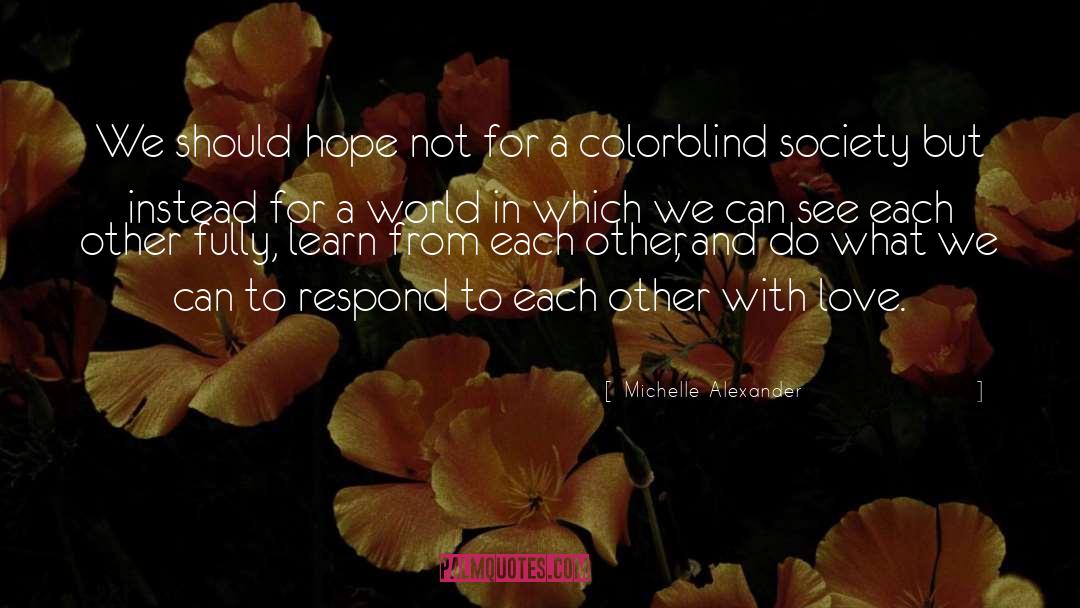
Drug use, once considered a private, public-health matter, was reframed through political rhetoric and media imagery as a grave threat to the national order. Jimmie Reeves and Richard Campbell show in their research how the media imagery surrounding cocaine changed as the practice of smoking cocaine came to be associated with poor blacks.35
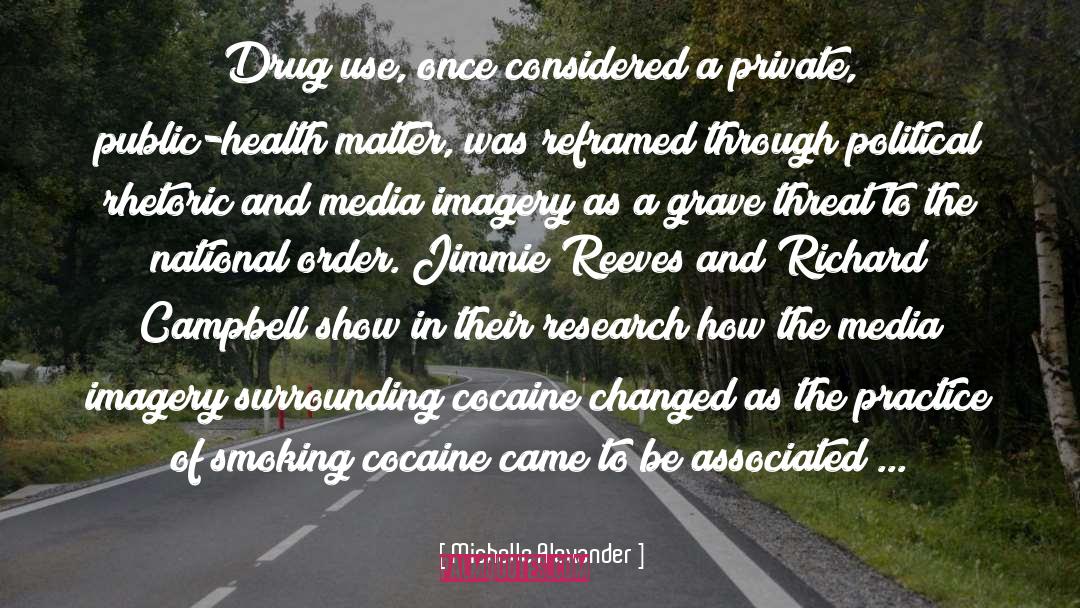
Any racial justice movement, to be successful, must vigorously challenge the public consensus that underlies the prevailing system of control. Nooses,
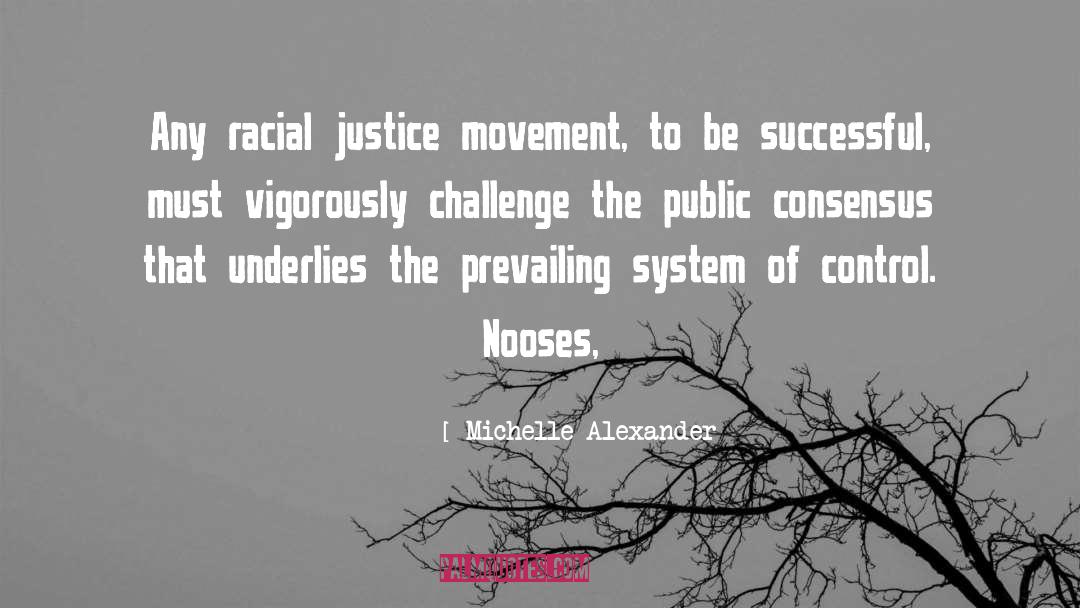
The enduring racial isolation of the ghetto poor has made them uniquely vulnerable in the War on Drugs. What happens to them does not directly affect - and is scarcely noticed by - the privileged beyond the ghetto's invisible walls.
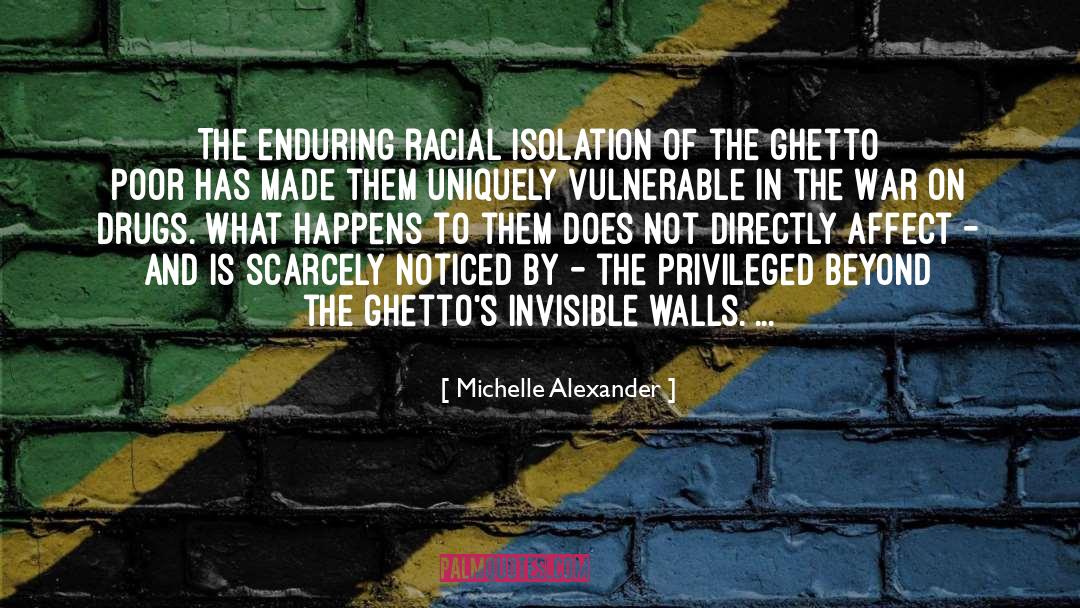
The War on Drugs, cloaked in race-neutral language, offered whites opposed to racial reform a unique opportunity to express their hostility toward blacks and black progress, without being exposed to the charge of racism.
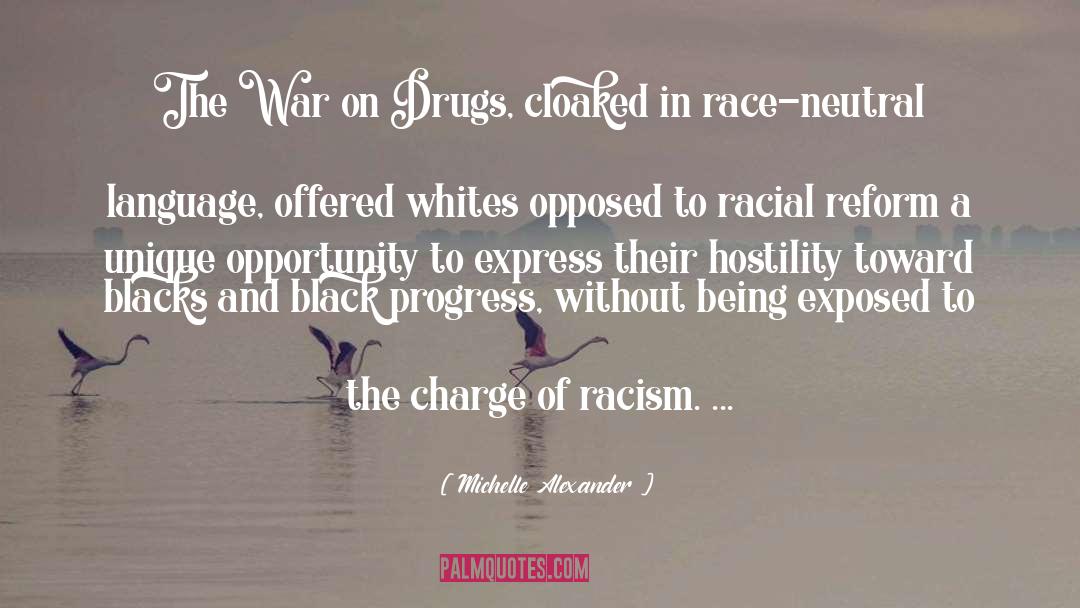
Finally, we must admit, out loud, that it was because of race that we didn't care much what happened to "those people" and imagined the worst possible things about them. The fact that our lack of care and concern may have been, at times, unintentional or unconscious does not mitigate our crime-if we refuse, when given the chance, to make amends.
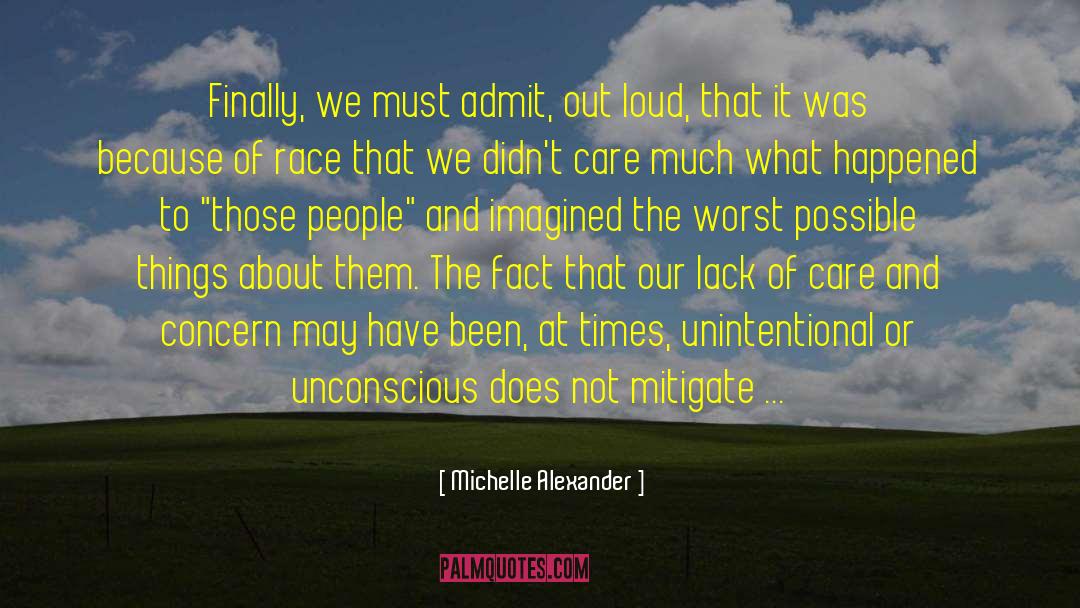
Church? I wouldn't dare tell anyone at church.77 Far from being a place of comfort or refuge, churches can be a place where judgment, shame, and contempt are felt most acutely. Services in black churches frequently contain a strong mixture of concern for the less fortunate and a call to personal responsibility.
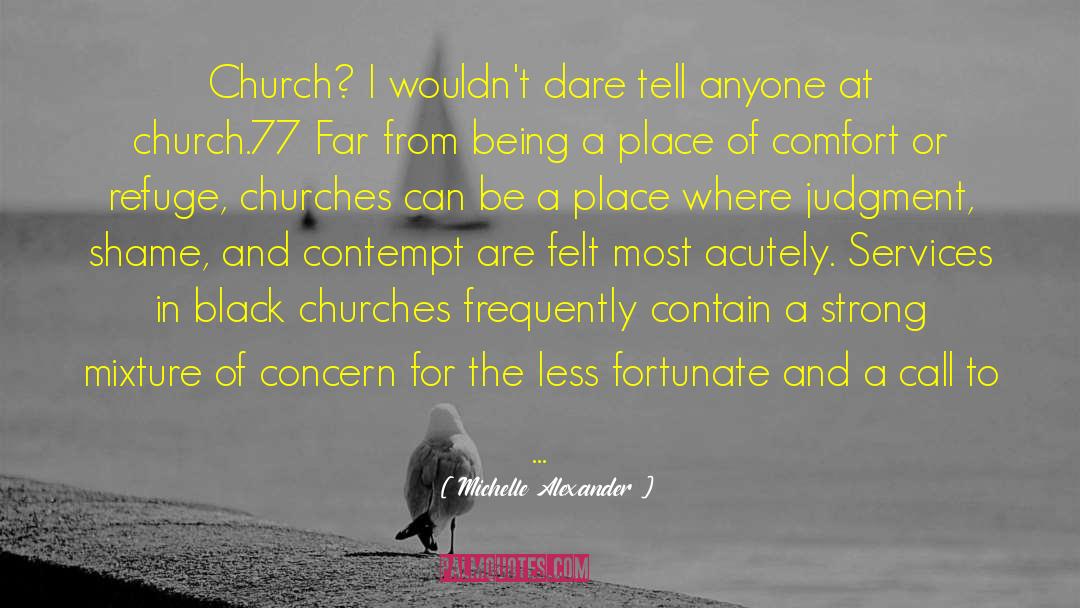
are we willing to demonize a population, declare a war against them, and then stand back and heap shame and contempt upon them for failing to behave like model citizens while under attack?
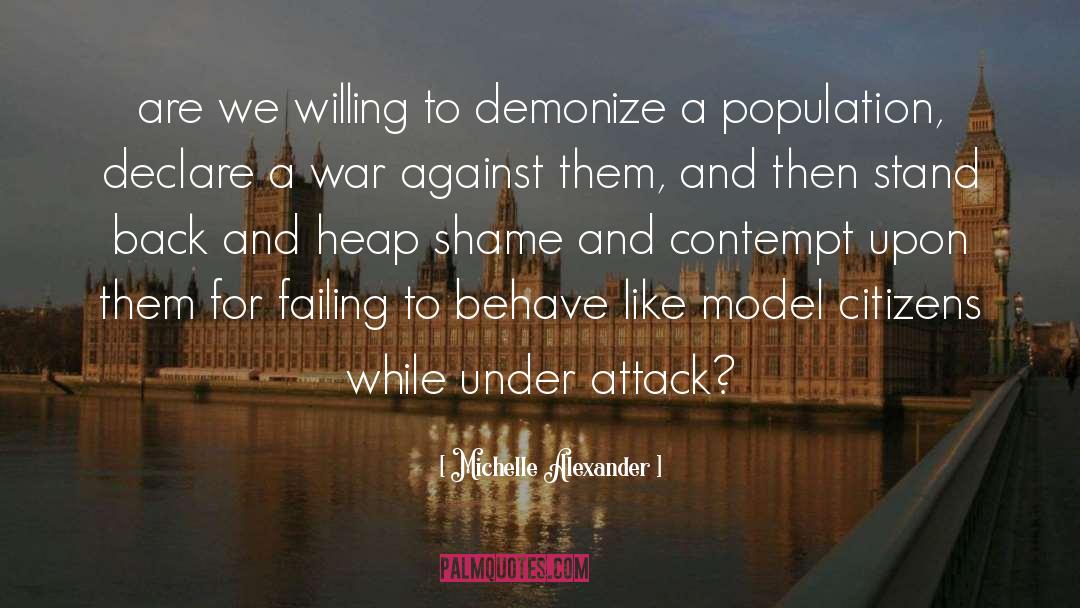
Racial caste systems do not require racial hostility or overt bigotry to thrive. They need only racial indifference, as Martin Luther King Jr. warned more than forty-five years ago.
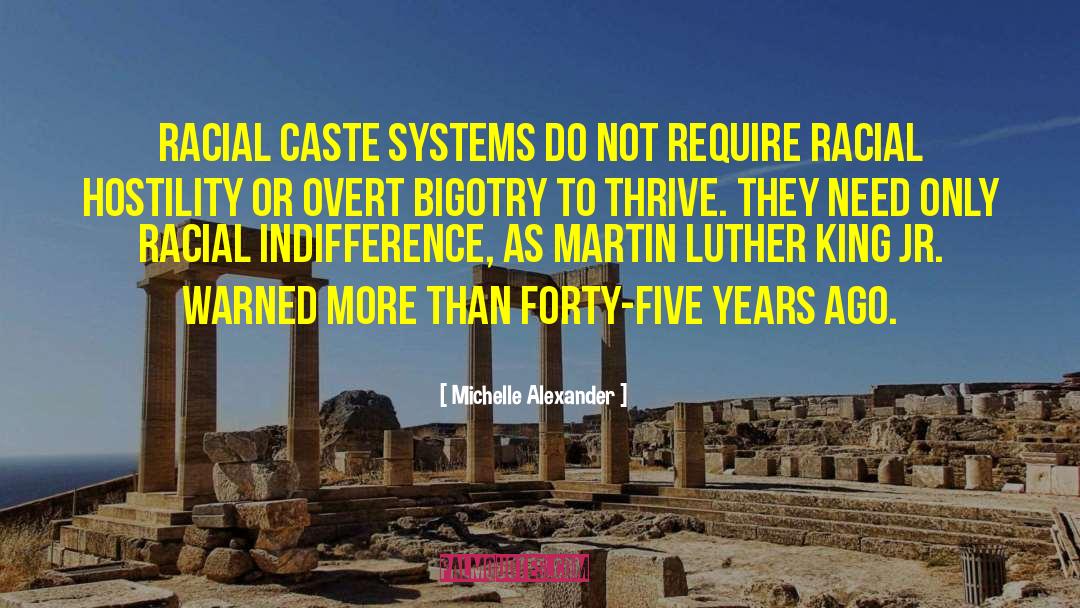
By 1945, a growing number of whites in the North had concluded that the Jim Crow system would have to be modified, if not entirely overthrown. This consensus was due to a number of factors, including the increased political power of blacks due to migration to the North and the growing membership and influence of the NAACP, particularly its highly successful legal campaign challenging Jim Crow laws in federal courts. Far more important in the view of many scholars, however, is the influence of World War II. The blatant contradiction between the country's opposition to the crimes of the Third Reich against European Jews and the continued existence of a racial caste system in the United States was proving embarrassing, severely damaging the nation's credibility as leader of the "free world.
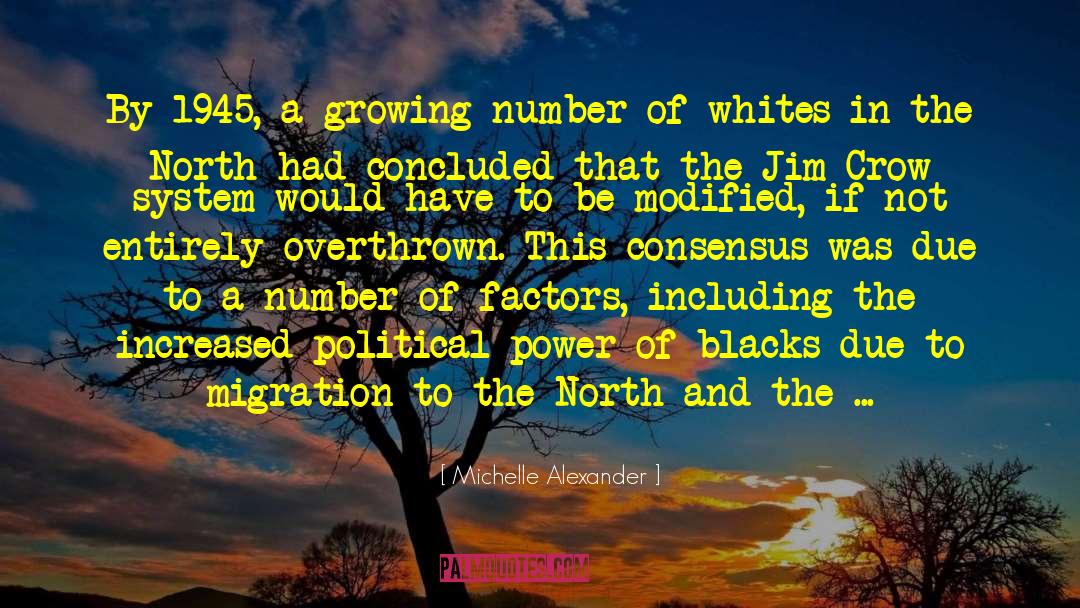
As David Kennedy correctly observes, "[c]rack blew through America's poor black neighborhoods like the Four Horsemen of the Apocalypse," leaving behind unspeakable devastation and suffering.82 As a nation, though, we had a choice about how to respond. Some countries faced with rising drug crime or seemingly intractable rates of drug abuse and drug addiction chose the path of drug treatment, prevention, and education or economic investment in crime-ridden communities. Portugal,
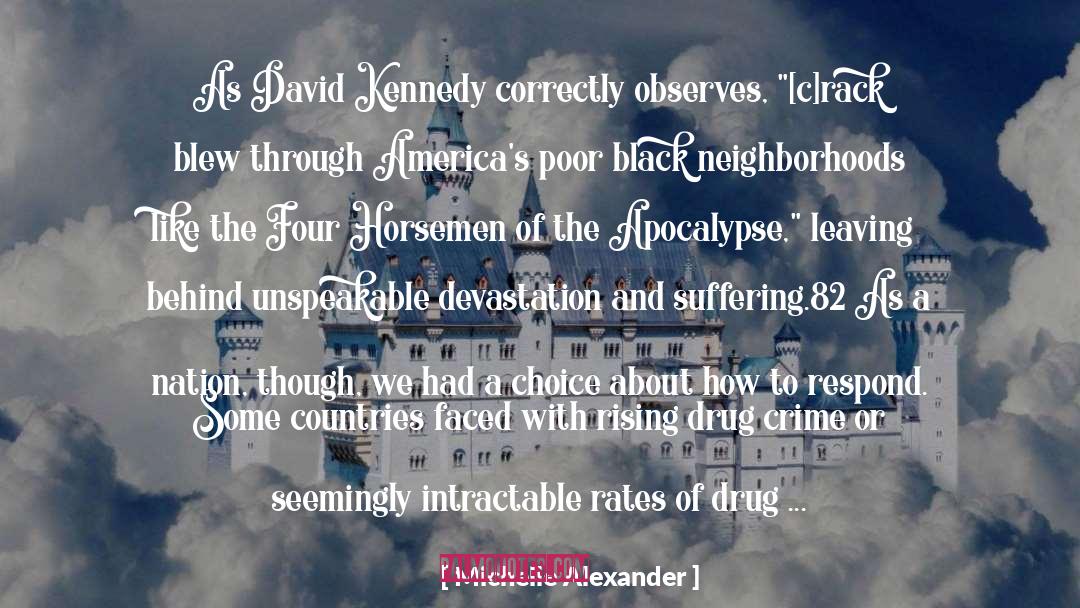
As a society, our decision to heap shame and contempt upon those who struggle and fail in a system designed to keep them locked up and locked out says far more about ourselves than it does about them.
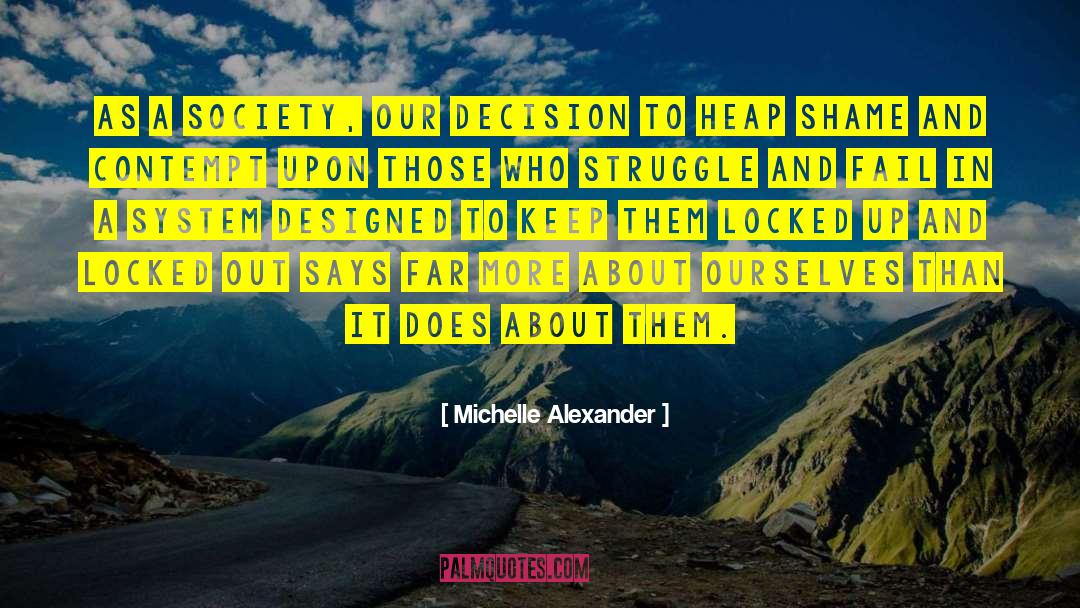
The temptation is to insist that black men 'choose' to be criminals; the system does not make them criminals, at least not in the way that slavery made blacks slaves or Jim Crow made them second-class citizens. The myth of choice here is seductive, but it should be resisted. African Americans are not significantly more likely to use or sell prohibited drugs than whites, but they are made criminals at drastically higher rates for precisely the same conduct. In fact, studies suggest that white professionals may be the most likely of any group to have engaged in illegal drug activity in their lifetime, yet they are the least likely to be made criminals. The prevalence of illegal drug activity among all racial and ethnic groups creates a situation in which, due to limited law enforcement resources and political constraints, some people are made criminals while others are not. Black people have been made criminals by the War on Drugs to a degree that dwarfs its effect on other racial and ethnic groups, especially whites. And the process of making them criminals has produced racial stigma.
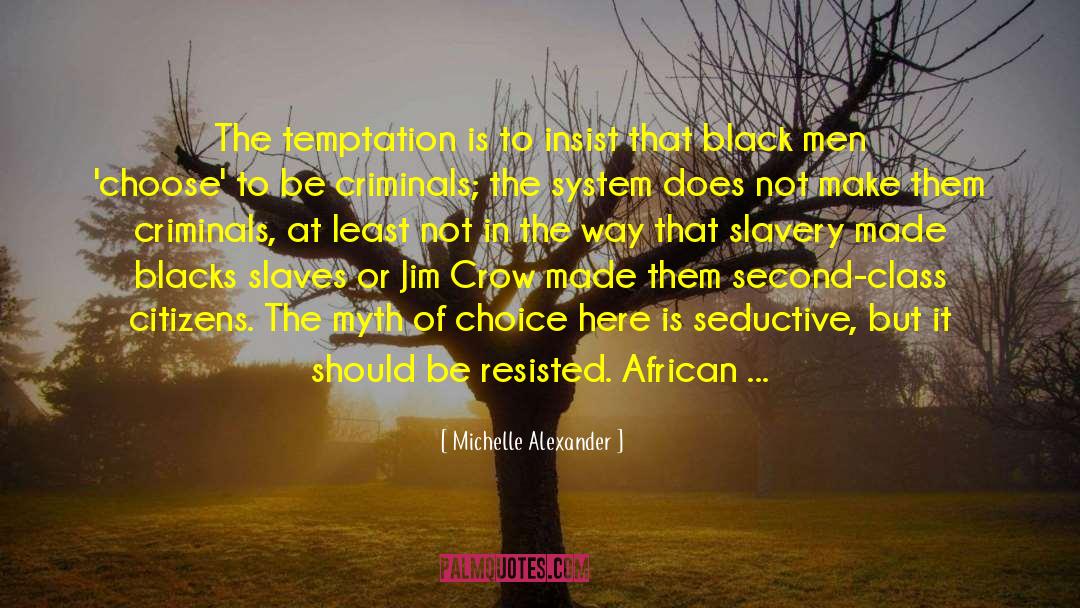
The affluent white liberals who were pressing the legal claims of blacks and other minorities "were often sheltered, in their private lives, and largely immune to the costs of implementing minority claims."58 This reality made it possible for conservatives to characterize the "liberal Democratic establishment" as being out of touch with ordinary working people - thus resolving one of the central problems facing conservatives: how to persuade poor and working-class voters to join in alliance with corporate interests and the conservative elite. By
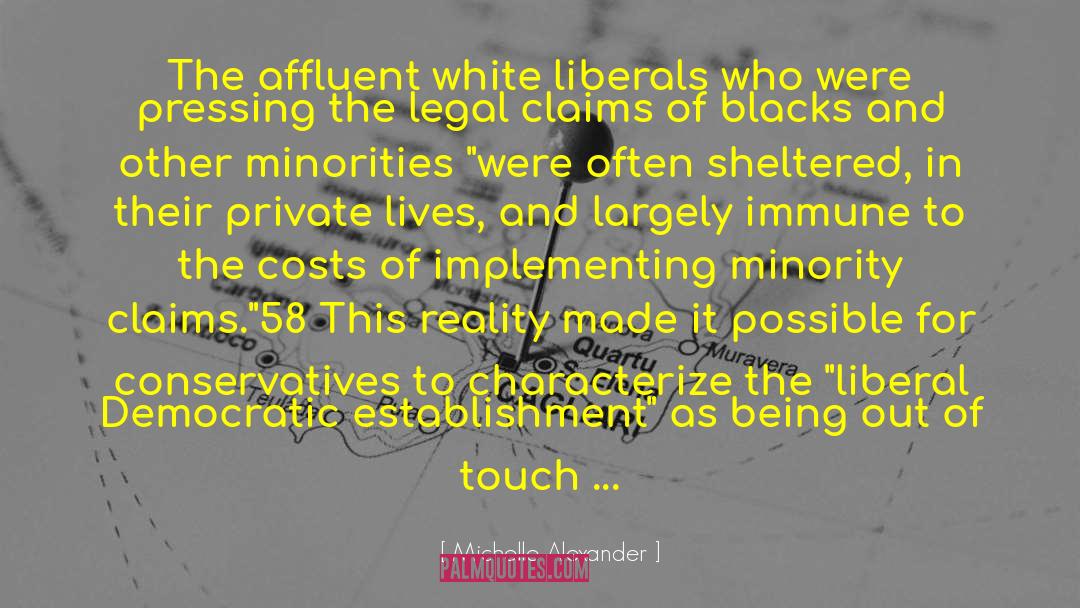
African Americans are not significantly more likely to use or sell prohibited drugs than whites, but they are made criminals at drastically higher rates for precisely the same conduct.
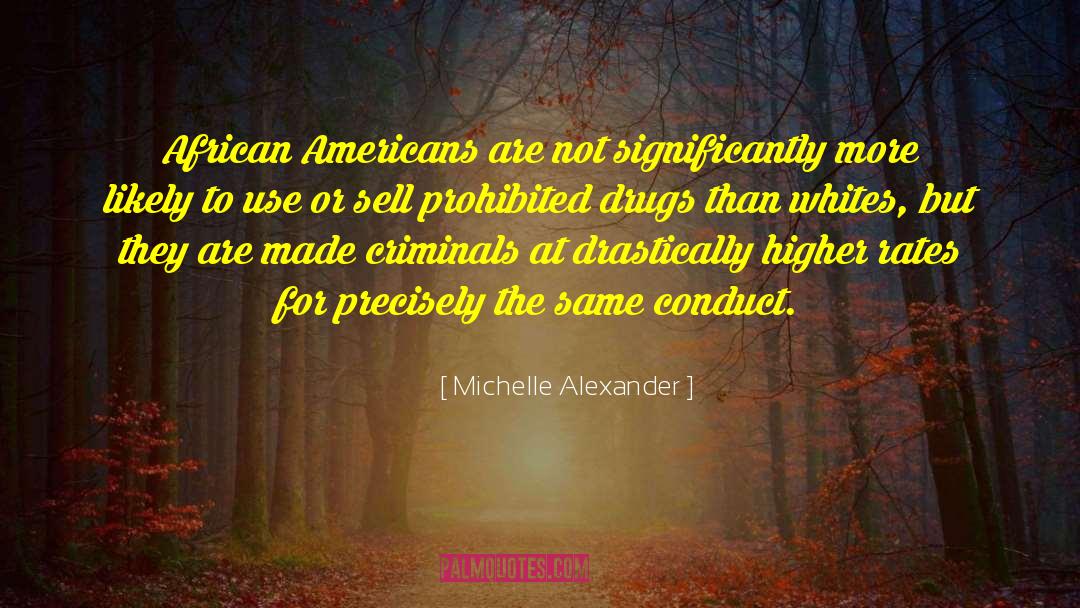
Fore more than a decade - from the mid-1950s until the late 1960s - conservatives systematically and strategically linked opposition to civil rights legislation to calls for law and order, arguing that Martin Luther King Jr.'s philosophy of civil disobedience was a leading cause of crime. Civil rights protests were frequently depicted as criminal rather than political in nature, and federal courts were accused of excessive 'lenience' toward lawlessness, thereby contributing to the spread of crime.
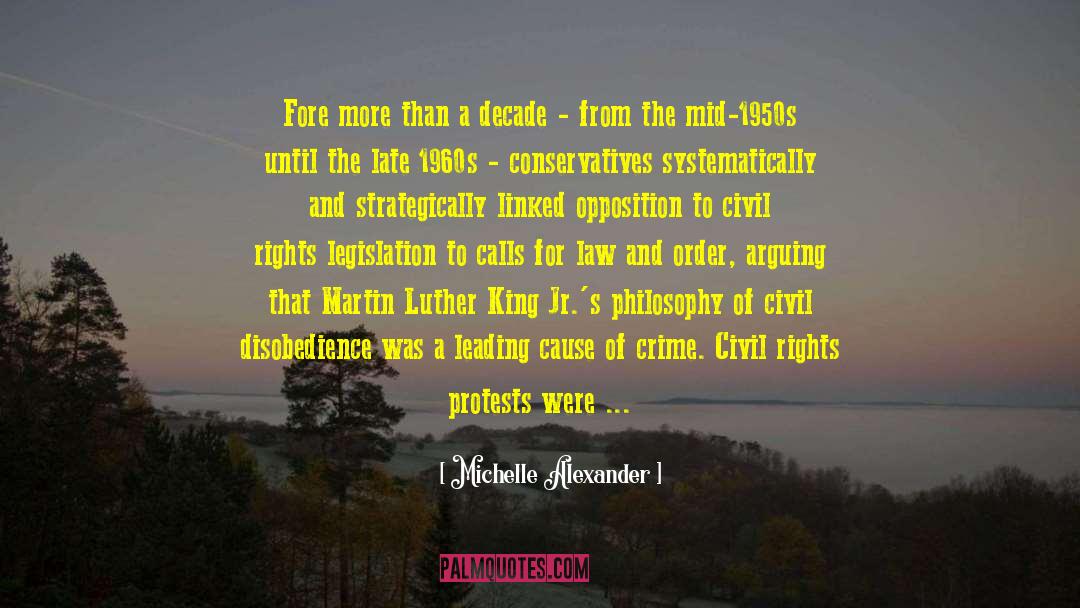
Downright ridiculous legislation (such as laws specifically prohibiting blacks and whites from playing chess together).
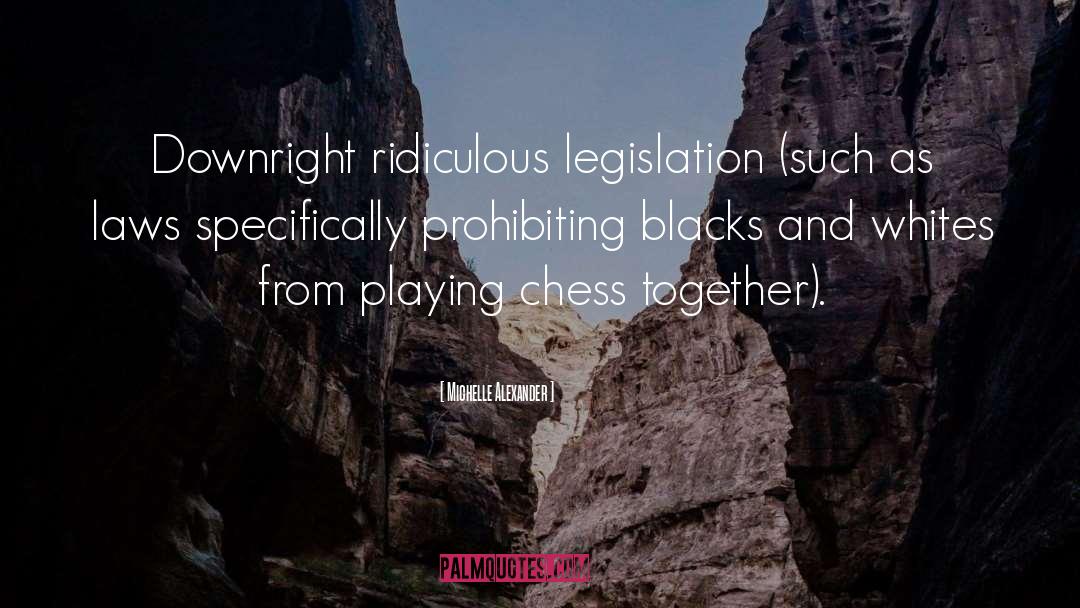
So herein lies the paradox and predicament of young black men labeled criminals. A war has been declared on them, and they have been rounded up for engaging in precisely the same crimes that go largely ignored in middle-and upper-class white communities - possession
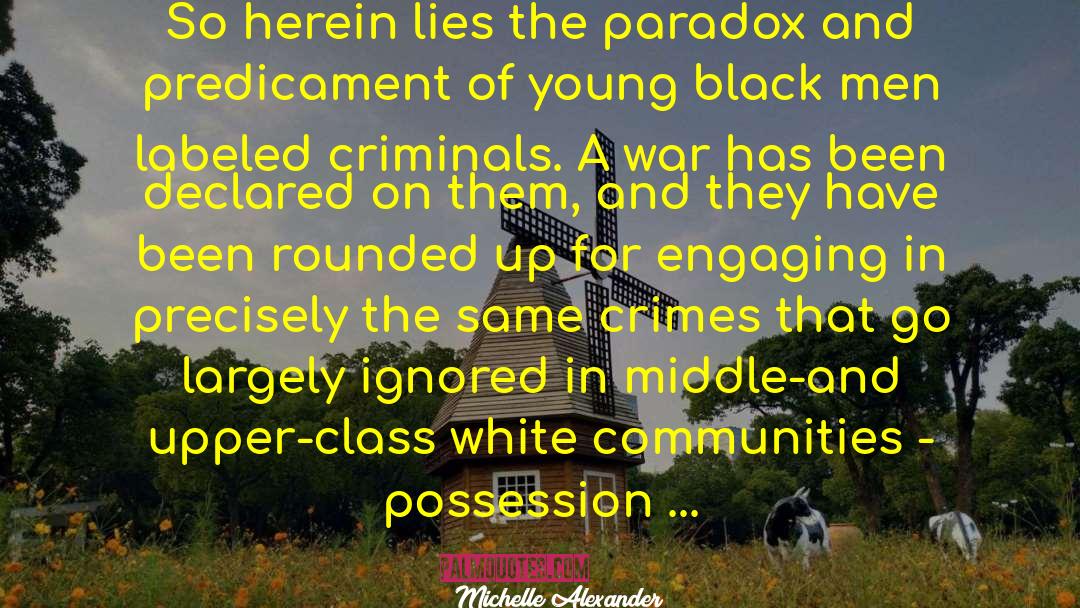
In an effort to address the rampant joblessness among black men labeled criminals, a growing number of advocates in recent years have launched Ban the Box campaigns.
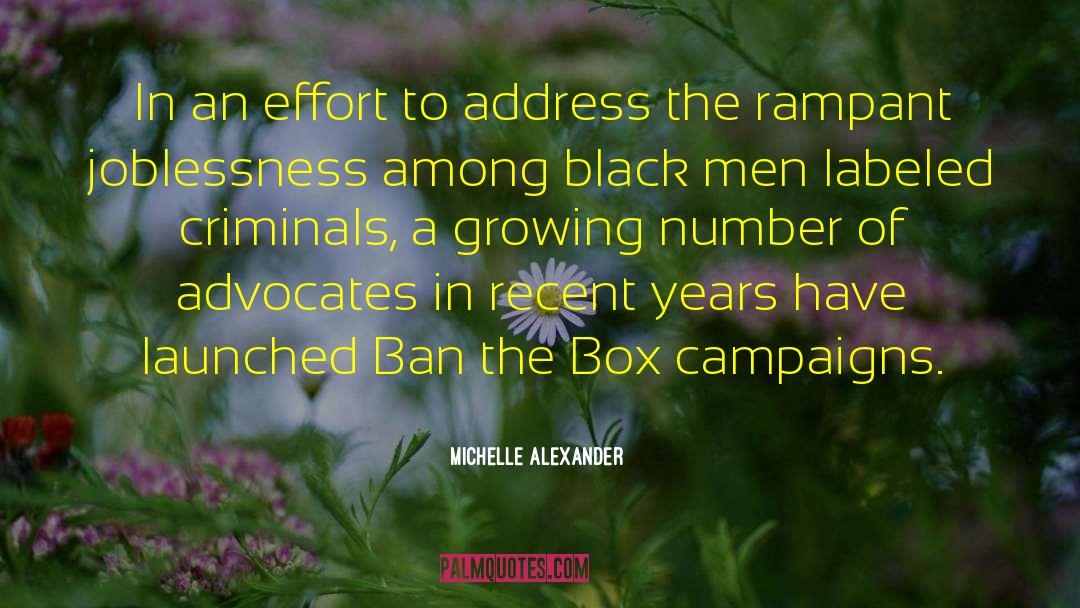
Although the NYPD frequently attempts to justify stop-and-frisk operations in poor communities of color on the grounds that such tactics are necessary to get guns off the streets, less than 1 percent of stops (0.15 percent) resulted in guns being found, and guns were seized less often in stops of African Americans and Latinos than of whites.
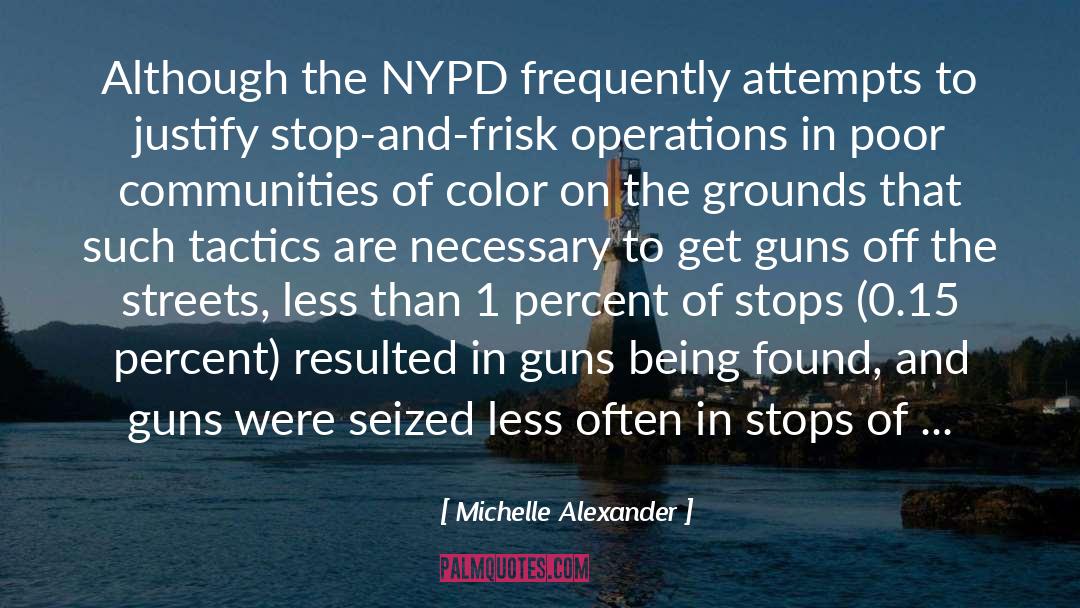
The notion that racial caste systems are necessarily predicated on a desire to harm other racial groups, and that racial hostility is the essence of racism, is fundamentally misguided. Even slavery does not conform to this limited understanding of racism and racial caste. Most plantation owners supported the institution of black slavery not because of a sadistic desire to harm blacks but instead because they wanted to get rich, and black slavery was the most efficient means to that end. By and large, plantation owners were indifferent to the suffering caused by slavery; they were motivated by greed. Preoccupation with the role of racial hostility in earlier caste systems can blind us to the ways in which every caste system, including mass incarceration, has been supported by racial indifference – a lack of caring and compassion for people of other races.
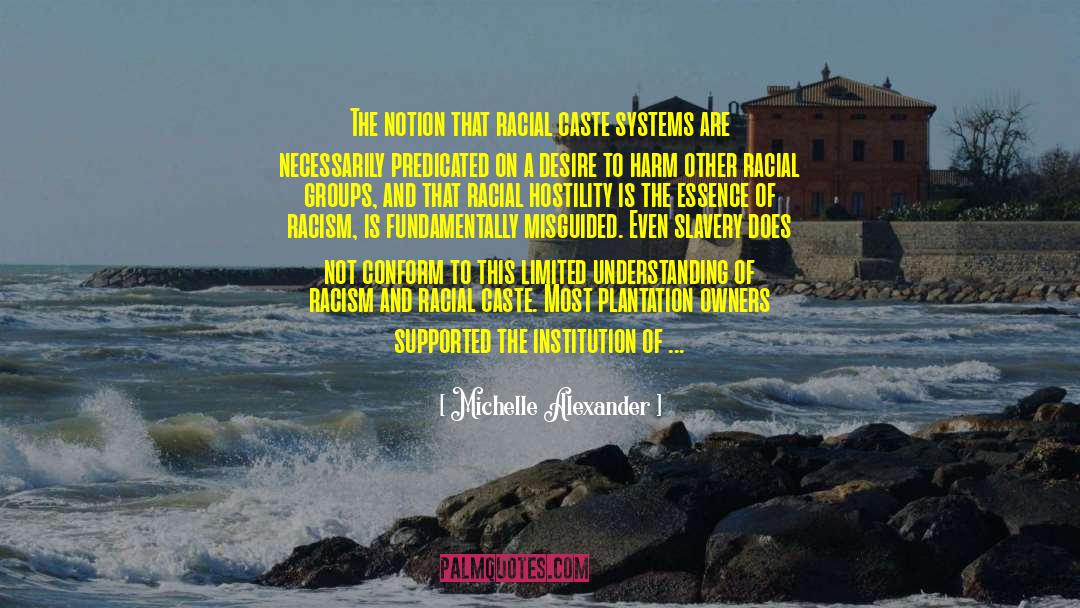
Research conducted by the Corporation for Supportive Housing in New York State shows that the use of state prisons and city jails dropped by 74 percent and 40 percent respectively when people with past criminal records were provided with supportive housing.
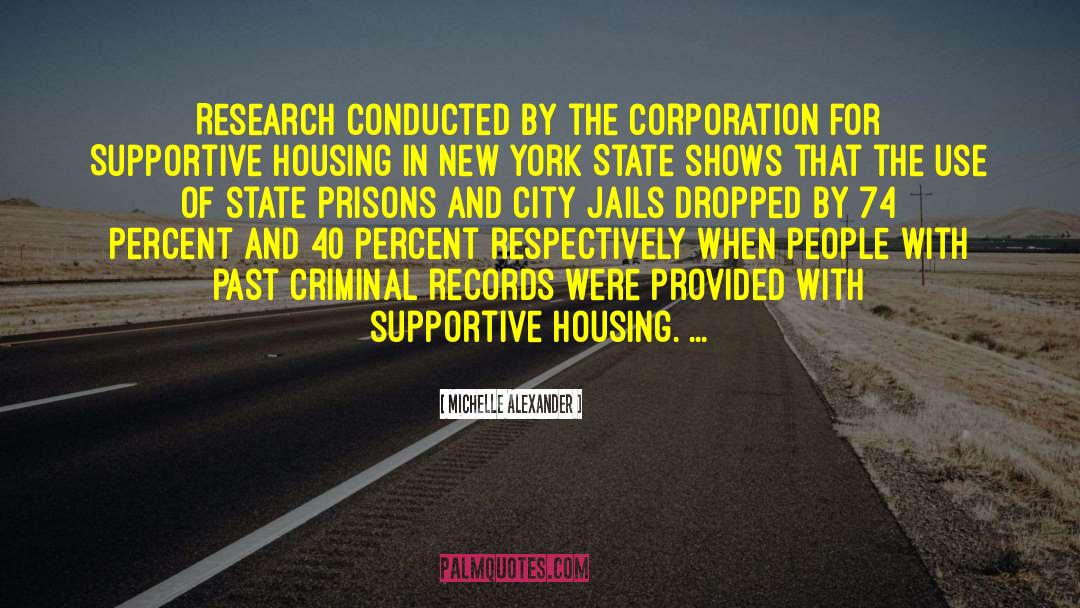
The fact that some African Americans have experienced great success in recent years does not mean that something akin to a racial caste system no longer exists. No caste system in the United States has ever governed all black people; there have always been "free blacks" and black success stories, even during slavery and Jim Crow. The superlative nature of individual black achievement today in formerly white domains is a good indicator that the old Jim Crow is dead, but it does not necessarily mean the end of racial caste. If history is any guide, it may have simply taken a different form.
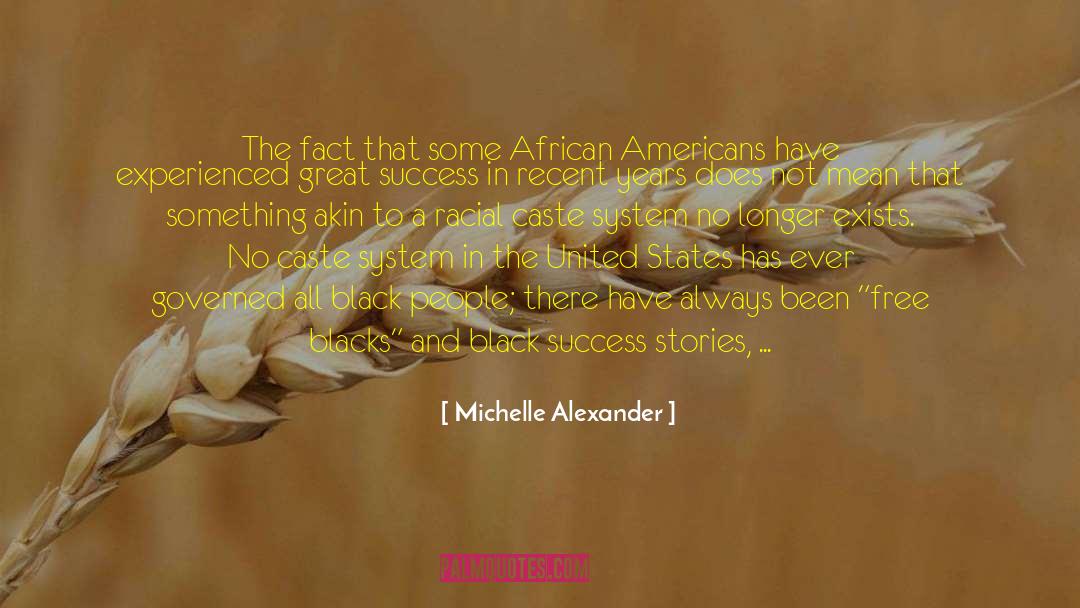
The United States now has the highest rate of incarceration in the world, dwarfing the rates of nearly every developed country, even surpassing those in highly repressive regimes like Russia, China, and Iran.
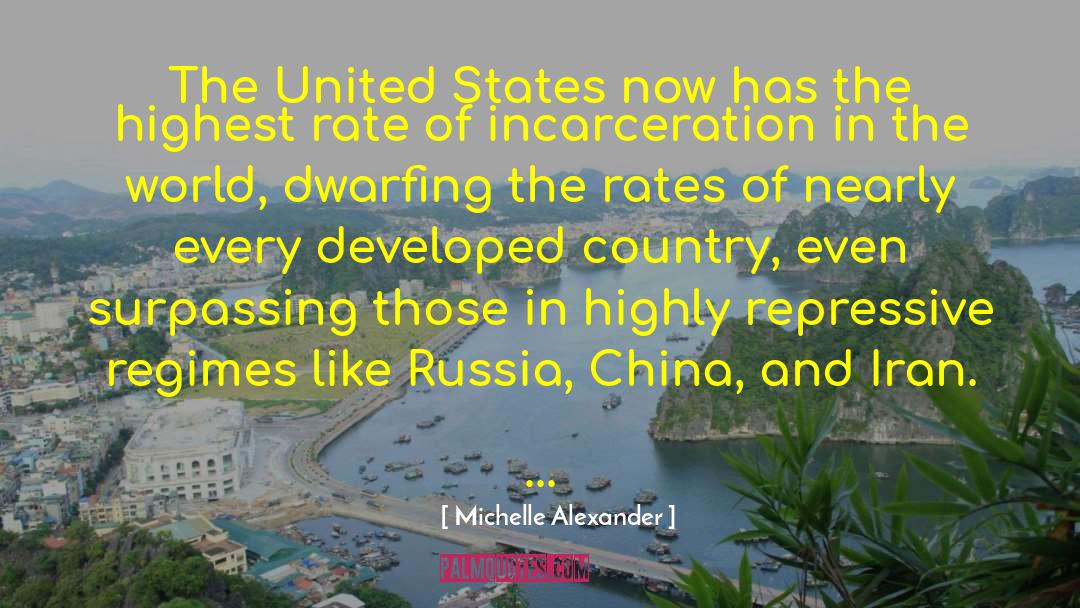
Mass incarceration is the most pressing racial justice issue of our time.
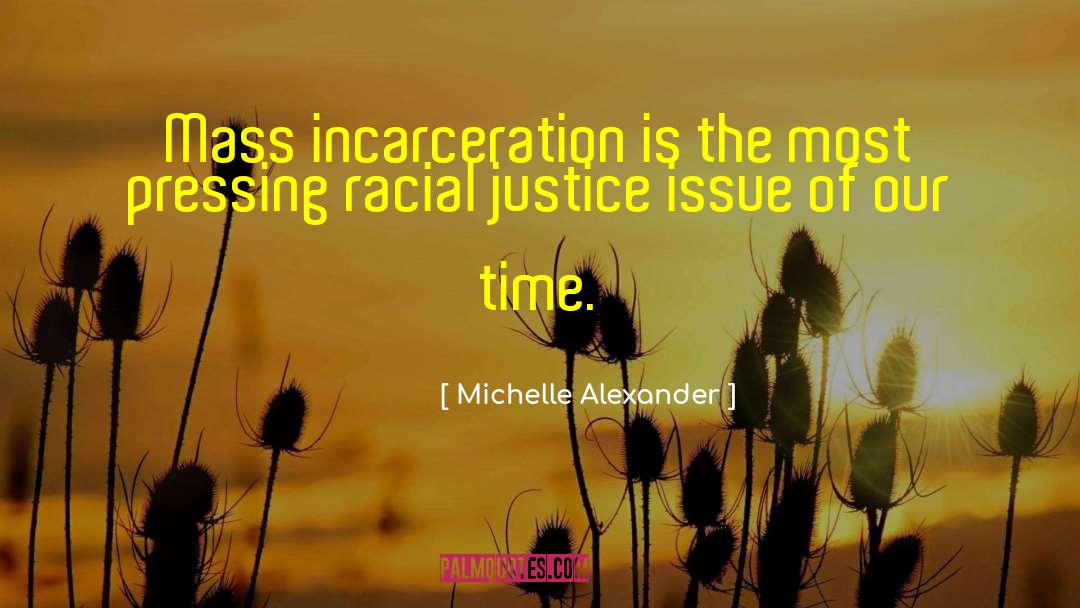
The valiant efforts to abolish slavery and Jim Crow and to achieve greater racial equality have brought about significant changes in the legal framework of American society - new "rules of the game," so to speak. These new rules have been justified by new rhetoric, new language, and a new social consensus, while producing many of the same results. This dynamic, which legal scholar Reva Siegel has dubbed "preservation through transformation," is the process through which white privilege is maintained, though the rules and rhetoric change.
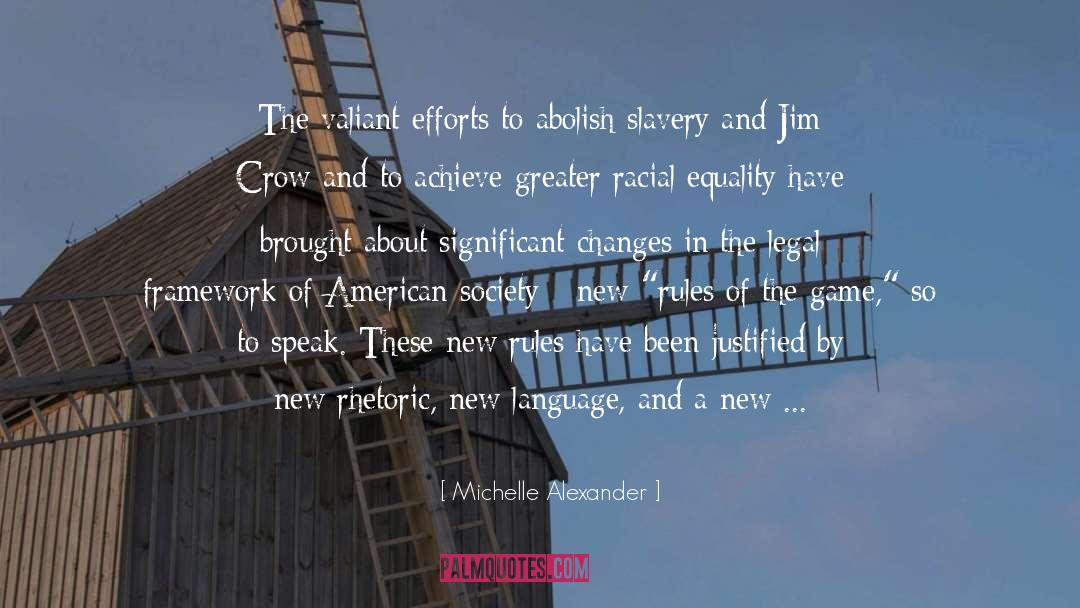
Mass incarceration - not attacks on affirmative action or lax civil rights enforcement - is the most damaging manifestation of the backlash against the Civil Rights Movement
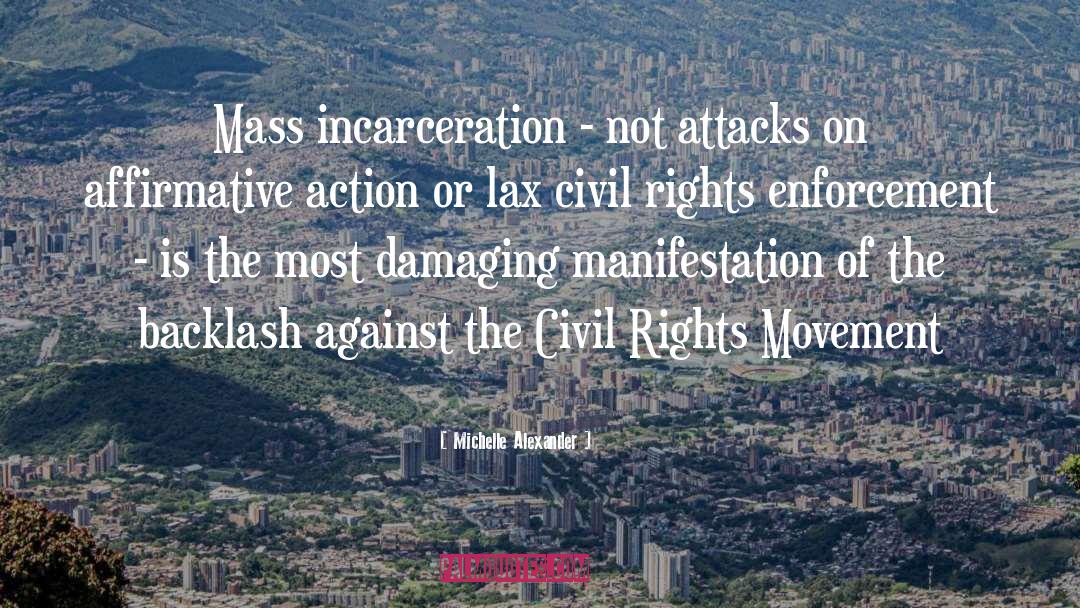
Challenging mass incarceration requires something civil rights advocates have long been reluctant to do: advocacy on behalf of criminals. Even
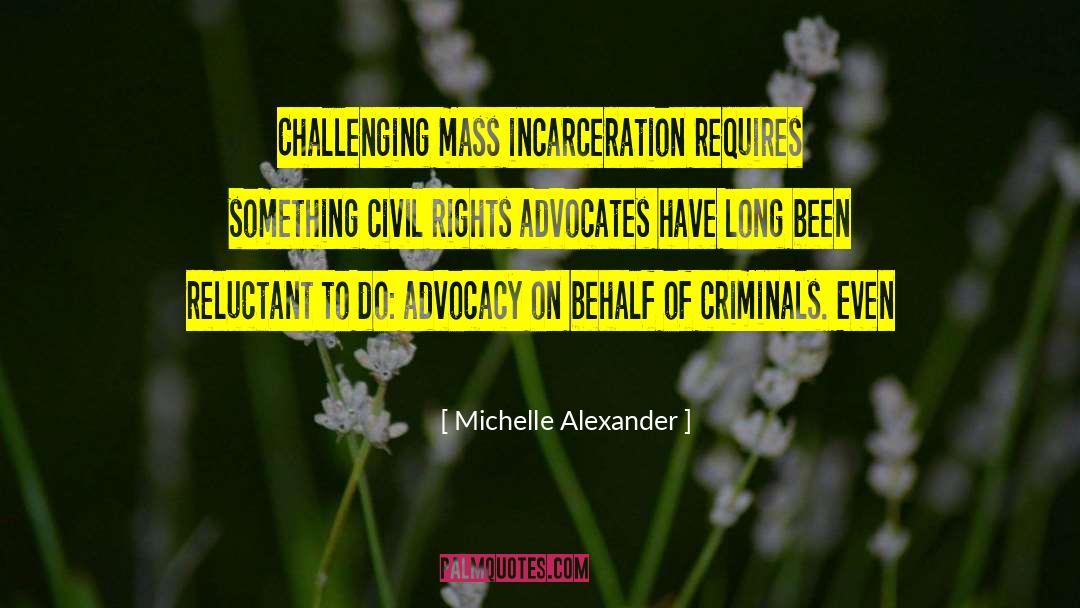
Jarvious Cotton cannot vote. Like his father, grandfather, great-grandfather, and great-great-grandfather, he has been denied the right to participate in our electoral democracy. Cotton's family tree tells the story of several generations of black men who were born in the United States but who were denied the most basic freedom that democracy promises - the freedom to vote for those who will make the rules and laws that govern one's life. Cotton's great-great-grandfather could not vote as a slave. His great-grandfather was beaten to death by the Ku Klux Klan for attempting to vote. His grandfather was prevented from voting by Klan intimidation. His father was barred from voting by poll taxes and literacy tests. Today, Jarvious Cotton cannot vote because he, like many black men in the United States, has been labeled a felon and is currently on parole.
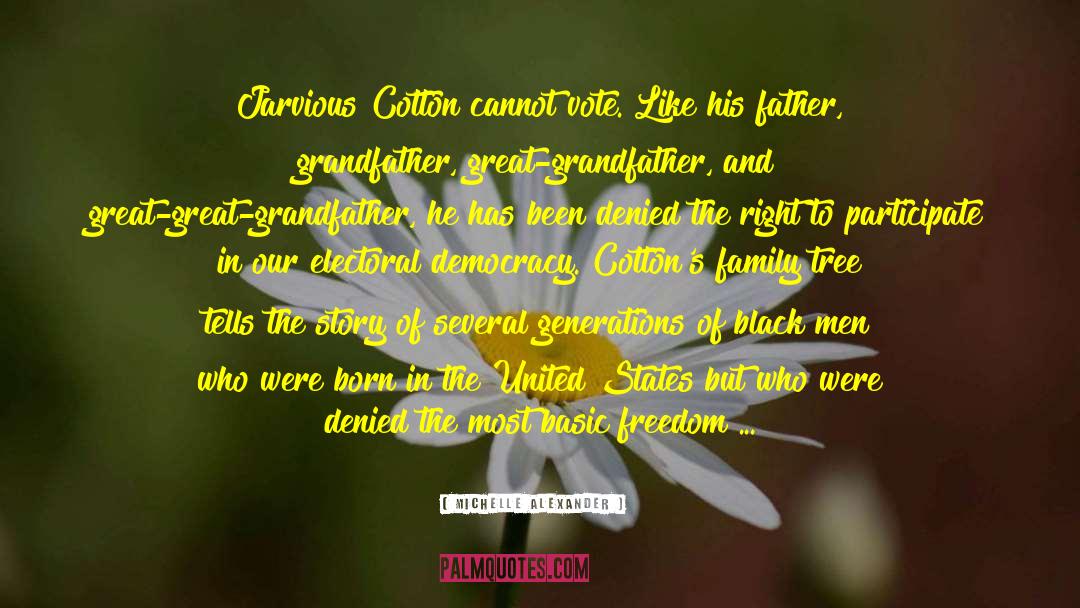
In any war, a tremendous amount of collateral damage is inevitable. Black and brown people are the principal targets in this war; white people are collateral damage.
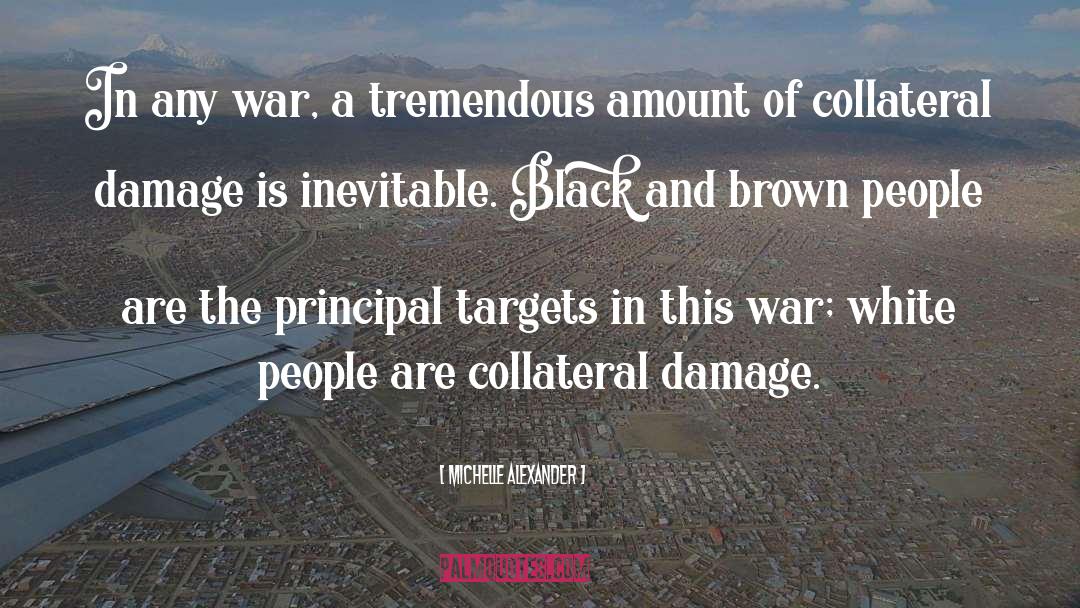
The radical philosophy offered, for many African Americans, the most promise. It was predicated on a searing critique of large corporations, particularly railroads, and the wealthy elite in the North and South. The radicals of the late nineteenth century, who later formed the Populist Party, viewed the privileged classes as conspiring to keep poor whites and blacks locked into a subordinate political and economic position. For many African American voters, the Populist approach was preferable to the paternalism of liberals.
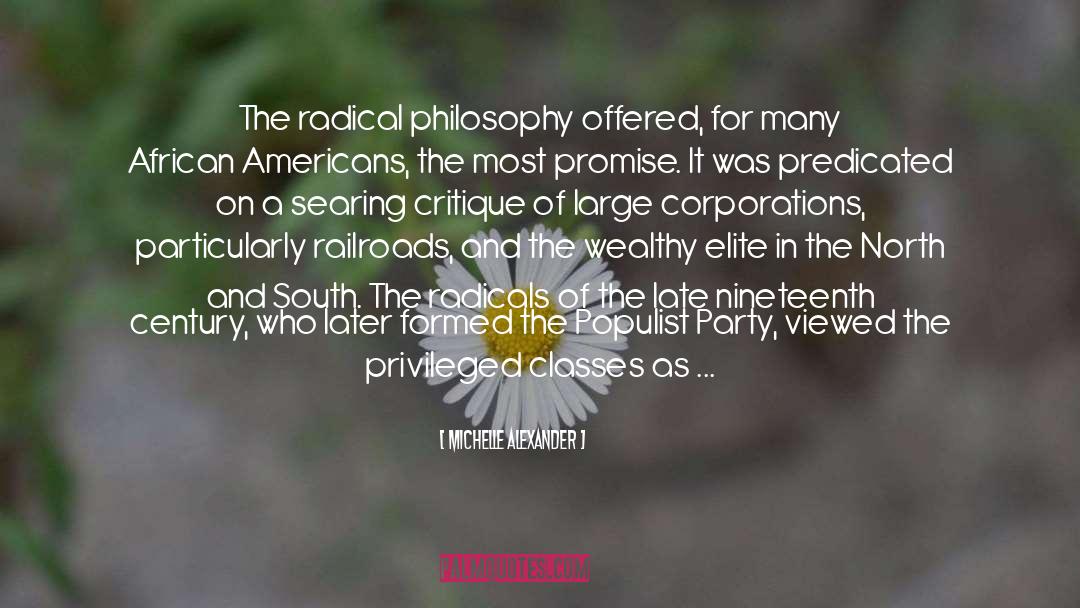
[In late 1989,] a New York Times/CBS News Poll reported that 64 percent of those polled - the highest percentage ever recorded - now thought that drugs were the most significant problem in the United States. This surge of public concern did not correspond to a dramatic shift in illegal drug activity, but instead was the product of a carefully orchestrated political campaign.
![Michelle Alexander Quotes: [In late 1989,] a New Michelle Alexander Quotes: [In late 1989,] a New](https://palmquotes.com/author/michelle-alexander-quotes-588745.jpg)
Mistaken belief that racial animus is necessary for the creation and maintenance of racialized systems of social control is the most important reason that we, as a nation, have remained in deep denial.
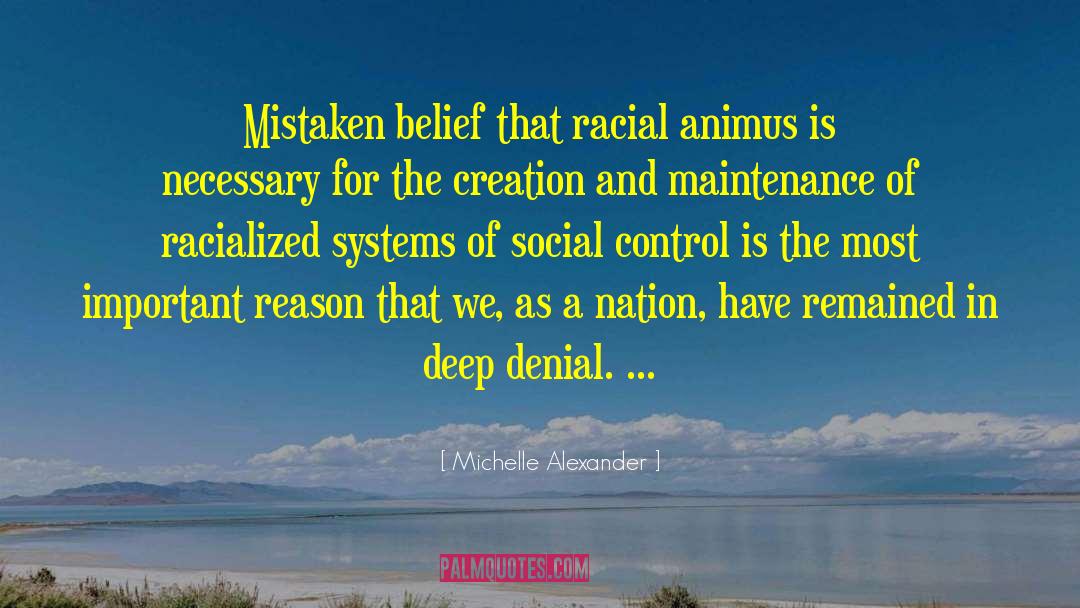
Admittedly, though, the temptation to ignore race in our advocacy may be overwhelming. Race makes people uncomfortable. One study found that some whites are so loath to talk about race and so fearful of violating racial etiquette that they indicate a preference for avoiding all contact with black people. The striking reluctance of whites, in particular, to talk about or even acknowledge race has led many scholars and advocates to conclude that we would be better off not talking about race at all. This view is buttressed by the fact that white liberals, nearly as much as conservatives, seem to lave lost patience with debates about racial equity. Barack Obama noted this phenomenon in his book, The Audacity ofHope: :Rightly or wrongly, white guilt has largely exhausted itself in America; even the most fair-minded of whites, those who would genuinely like to see racial inequality ended and poverty relieved, tend to push back against racial victimization-or race-specific claims based on the history of race discrimination in this country.
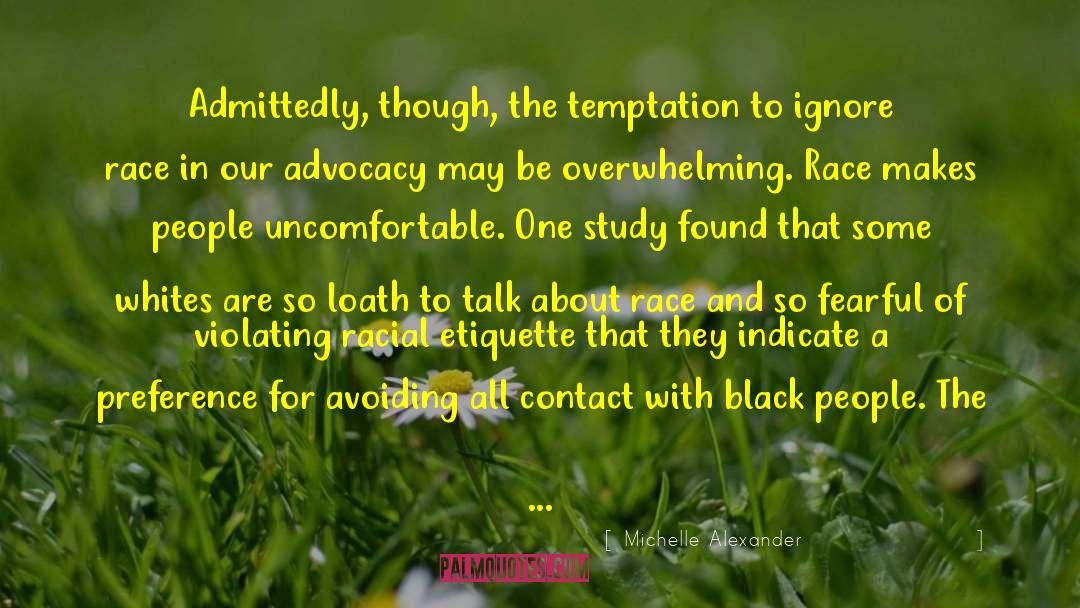
By the mid-1770s, the system of bond labor had been thoroughly transformed into a racial caste system predicated on slavery. The degraded status of Africans was justified on the ground that Negros, like the Indians, were an uncivilized lesser race, perhaps even more lacking in intelligence and laudable human qualities than the red-skinned natives. The notion of white supremacy rationalized the enslavement of Africans, even as whites endeavored to form a new nation based on the ideals of equality, liberty, and justice for all. Before democracy, chattel slavery in America was born.
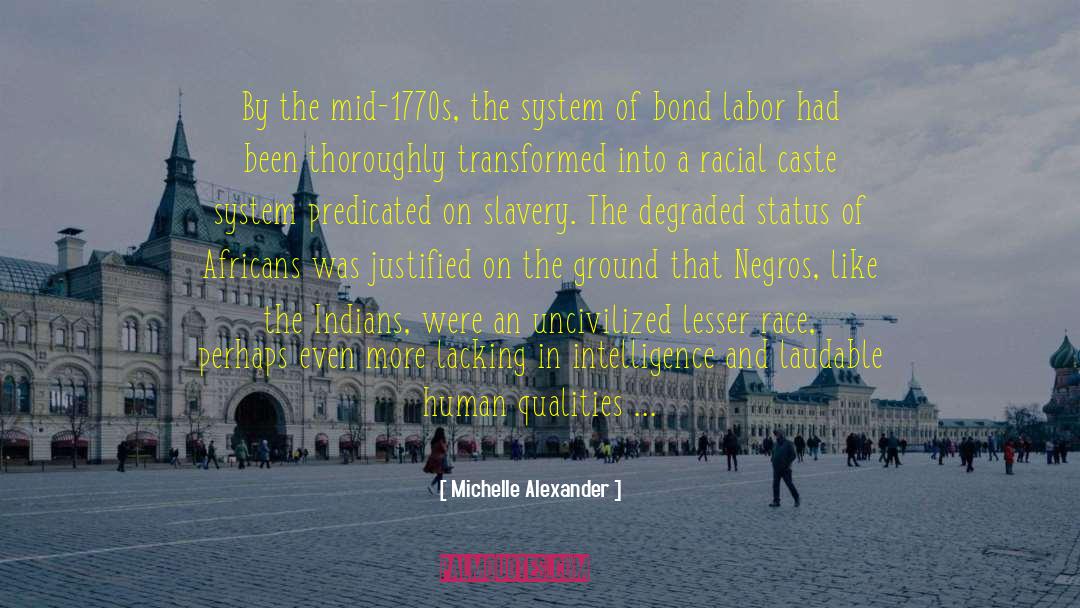
Through a web of laws, regulations, and informal rules, all of which are powerfully reinforced by social stigma, they are confined to the margins of mainstream society and denied access to the mainstream economy.
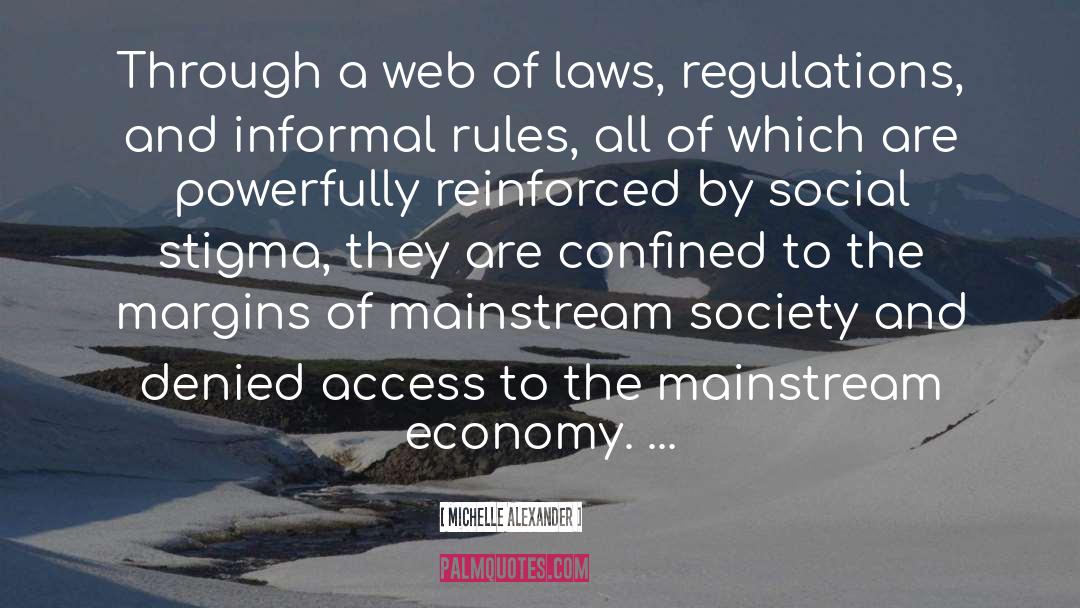
Jim Crow and mass incarceration have similar political origins...both caste systems were born in part, due to desire among white elites to exploit the resentments, vulnerabilities and racial biases of poor and working-class whites for political or economic gain. Segregation laws were proposed as part of a deliberate and strategic effort to deflect anger and hostility that have been brewing against the white elite away from them and toward African Americans. The birth of mass incarceration can be traced to a similar political dynamic. Conservatives in the 1960s and 1970s sought to appeal to the racial biases and economic vulnerabilities of poor and working-class whites through racially coded rhetoric on crime and welfare. In both cases, the racial opportunists offered few, if any, economic reforms to address the legitimate economic anxieties of poor and working-class whites, proposing instead a crackdown on the racially defined "others." In the early years of Jim Crow, conservative white elites competed with each other by passing ever more stringent and oppressive Jim Crow legislation. A century later, politicians in the early years of the drug war competed with each other to prove who could be tougher on crime by passing ever harsher drug laws- a thinly veiled effort to appeal to poor and working-class whites who, once again, proved they were willing to forego economic and structural reform in exchange for an apparent effort to put blacks back "in their place.
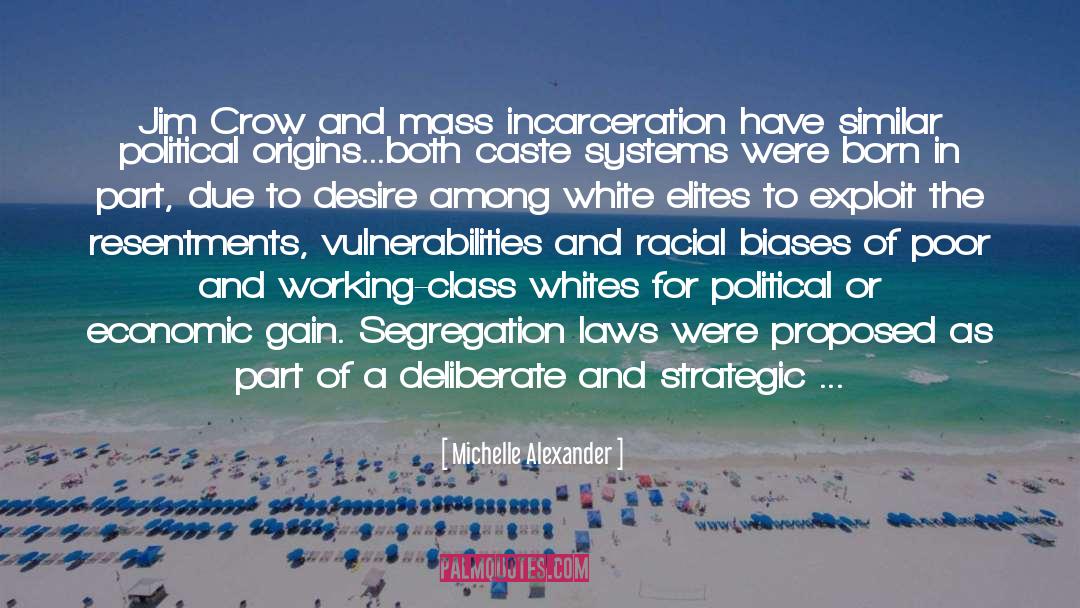
Forty-eight states and the District of Columbia prohibit inmates from voting while incarcerated for a felony offense. Only two states - Maine and Vermont - permit inmates to vote. The vast majority of states continue to withhold the right to vote when prisoners are released on parole. Even after the term of punishment expires, some states deny the right to vote for a period ranging from a number of years to the rest of one's life.
This is far from the norm in other countries - like Germany, for instance, which allows (and even encourages) prisoners to vote. In fact, about half of European countries allow all incarcerated people to vote, while others disqualify only a small number of prisoners from the polls. Prisoners vote either in their correctional facilities or by some version of absentee ballot in their town of previous residence. Almost all of the countries that place some restrictions on voting in prison are in Eastern Europe, part of the former Communist bloc.
No other country in the world disenfranchises people who are released from prison in a manner even remotely resembling the United States. In fact, the United Nations Human Rights Committee has charged that U.S. disenfranchisement policies are discriminatory and violate international law. In those few European countries that permit limited postprison disqualification, the sanction is very narrowly tailored and the number of people disenfranchised is probably in the dozens or hundreds. In th
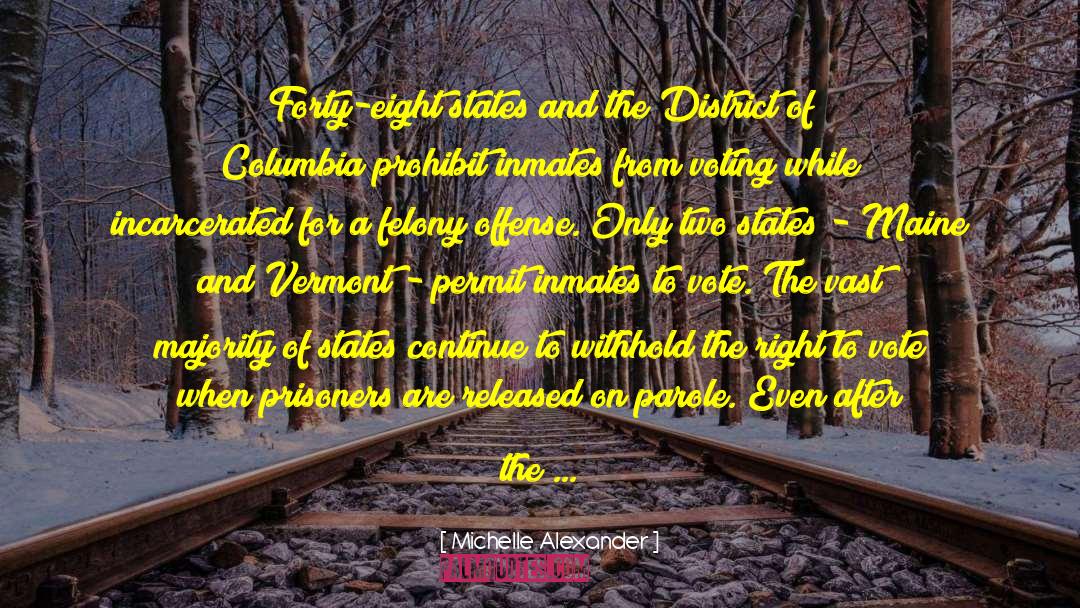
I am writing this book for people like me -- the person I was ten years ago.
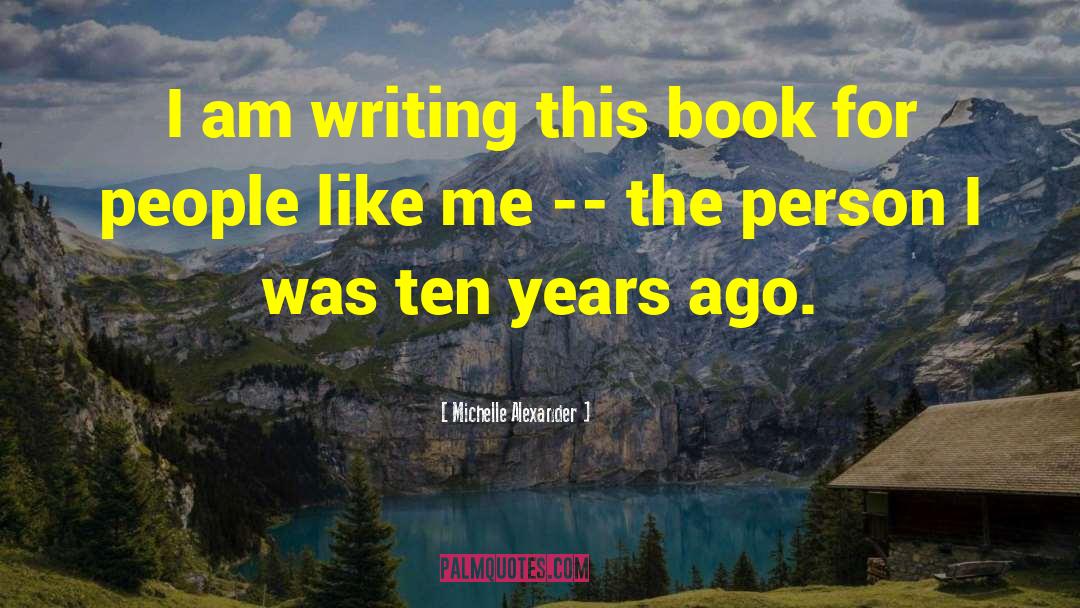
A report in 2000 observed that among youth who have never been sent to a juvenile prison before, African Americans were more than six times as likely as whites to be sentenced to prison for identical crimes.
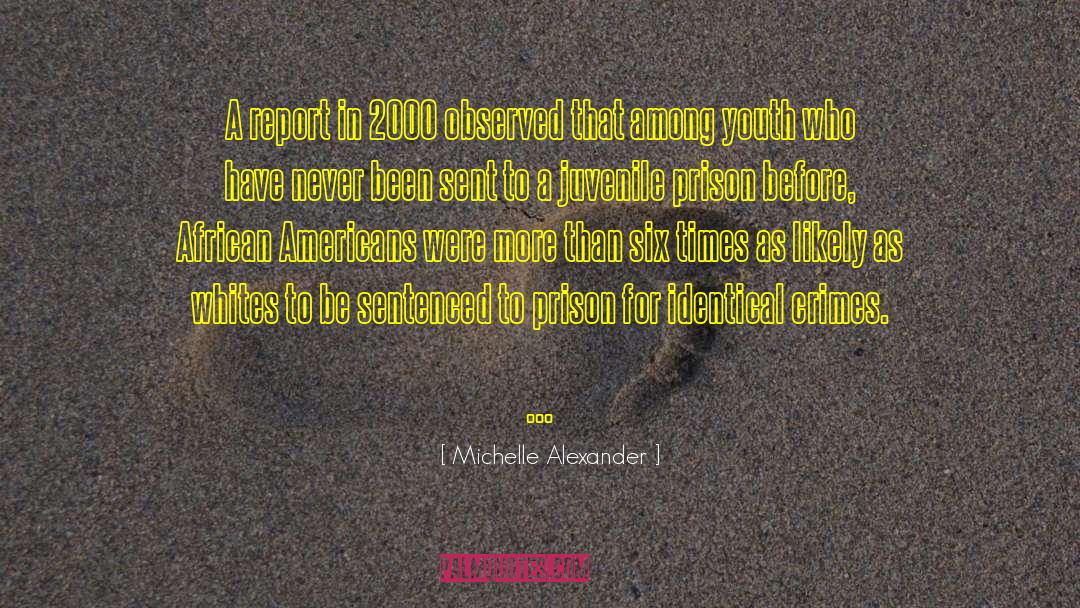
Once a person is labeled a felon, he or she is ushered into a parallel universe in which discrimination, stigma, and exclusion are perfectly legal, and privileges of citizenship such as voting and jury service are off-limits. It does not matter whether you have actually spent time in prison; your second-class citizenship begins the moment you are branded a felon. Most people branded felons, in fact, are not sentenced to prison. As of 2008, there were approximately 2.3 million people in prisons and jails, and a staggering 5.1 million people under 'community correctional supervision' - i.e., on probation or parole. Merely reducing prison terms does not have a major impact on the majority of people in the system. It is the badge of inferiority - the felony record - that relegates people for their entire lives, to second-class status.
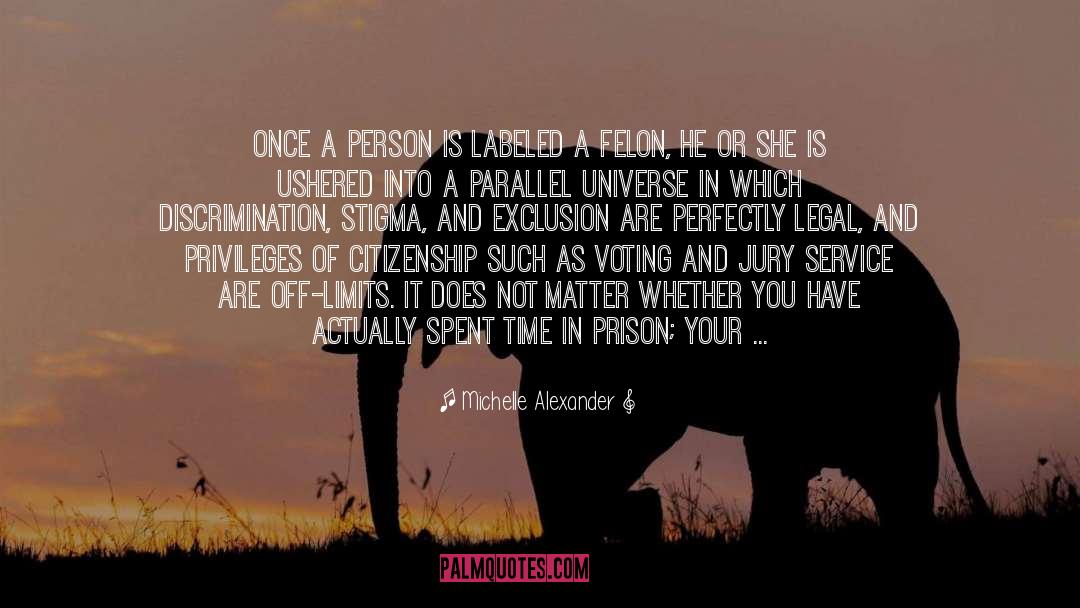
Federal drug forfeiture laws are one reason, Blumenson and Nilsen note, why state and federal prisons now confine large numbers of men and women who had relatively minor roles in drug distribution networks, but few of their bosses.
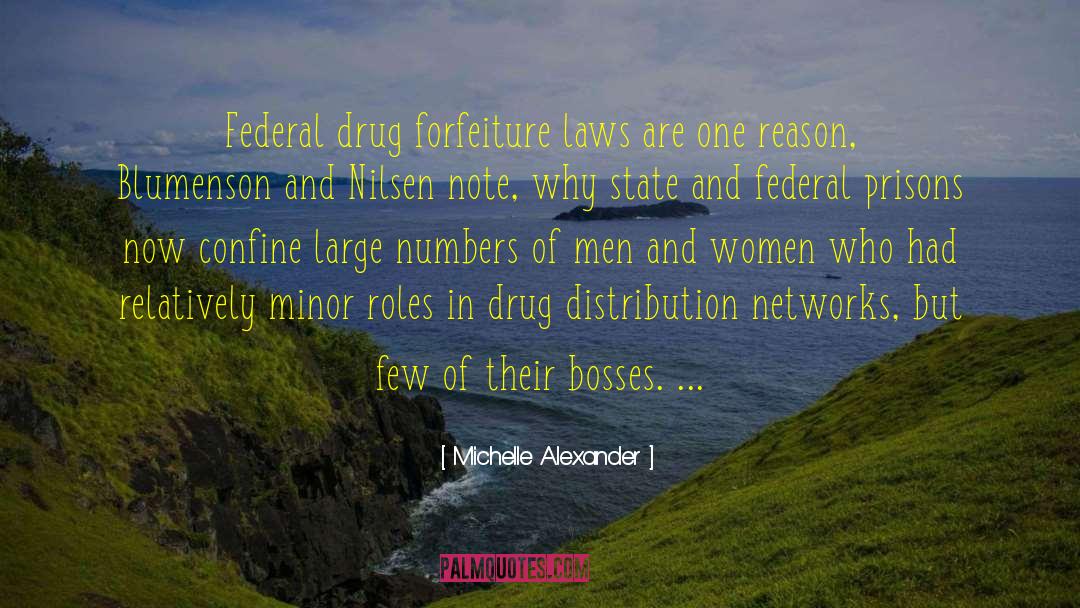
The shift may, in fact, come as something of a relief, as it moves our collective focus away from a wholly unrealistic goal to one that is within anyone's reach right now. After all, to aspire to colorblindness is to aspire to a state of being in which you are not capable of seeing racial difference - a practical impossibility for most of us. The shift also invites a more optimistic view of human capacity. The colorblindness ideal is premised on the notion that we, as a society, can never be trusted to see race and treat each other fairly or with genuine compassion. A commitment to color consciousness, by contrast, places faith in our capacity as humans to show care and concern for others, even as we are fully cognizant of race and possible racial differences.
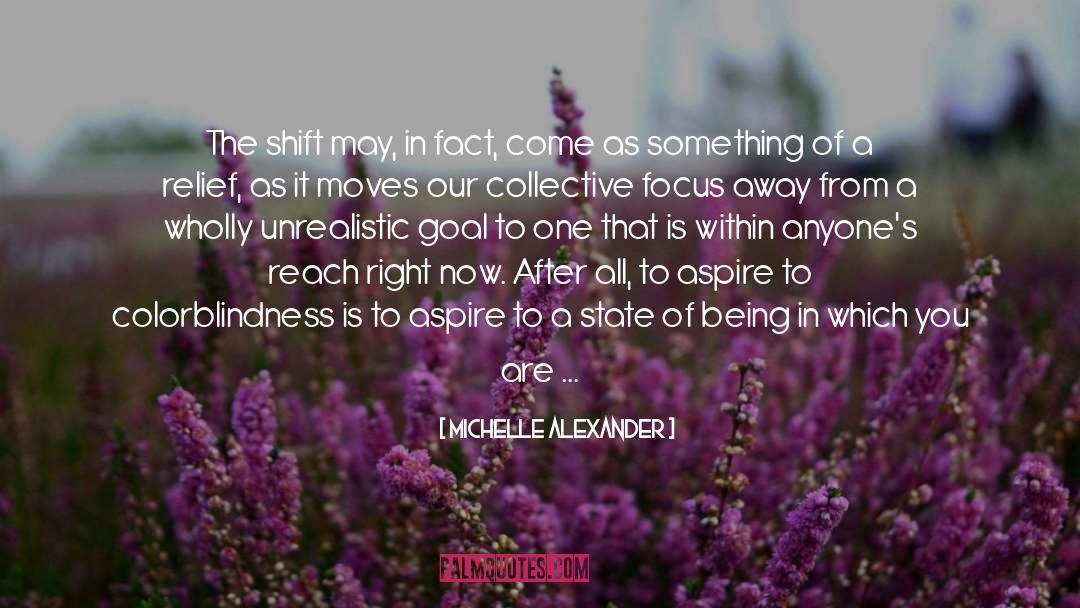
There is another, more sinister consequence of affirmative action: the carefully engineered appearance of great racial progress strengthens the "colorblind" public consensus that personal and cultural traits, not structural arrangements, are largely responsible for the fact that the majority of young black men in urban areas across the United States are currently under the control of the criminal justice system or branded as felons for life. In
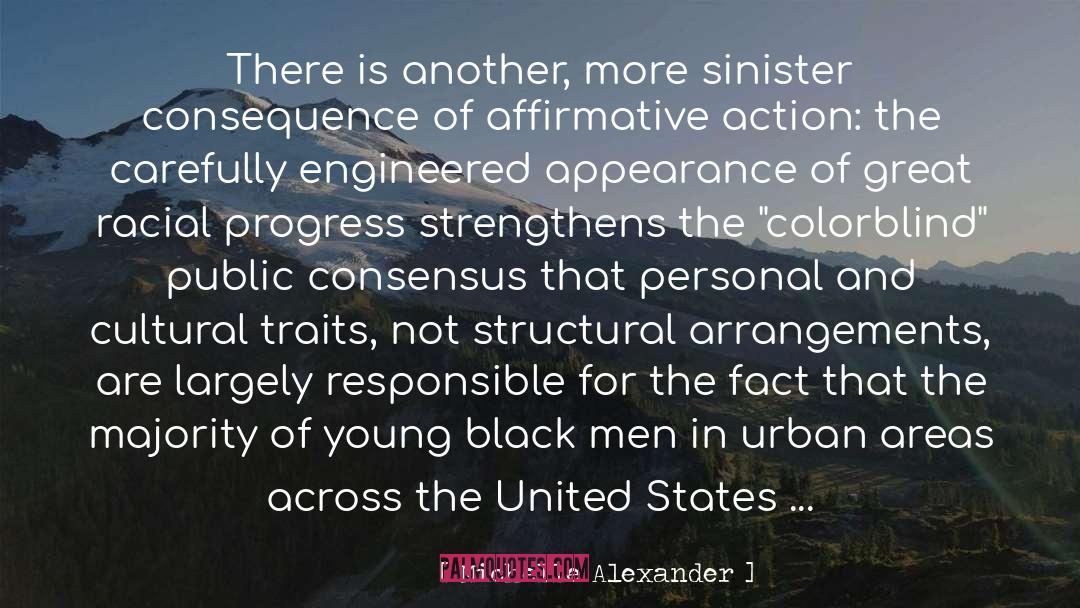
There is no inconsistency whatsoever between the election of Barack Obama to the highest office in the land and the existence of a racial caste system in the era of colorblindness. The current system of control depends on black exceptionalism; it is not disproved or undermined by it.
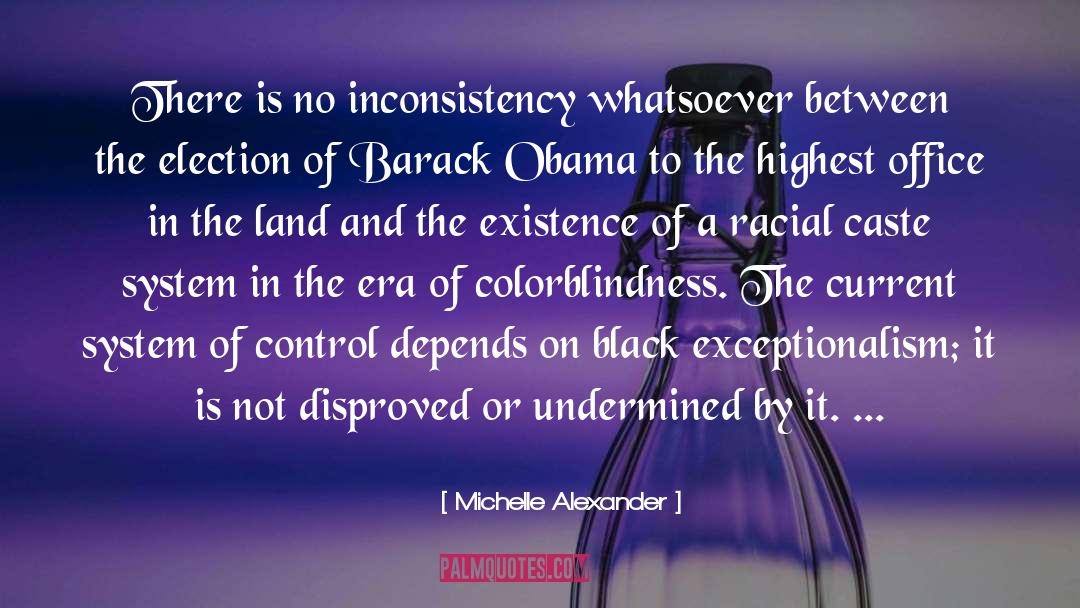
Academics have developed complicated theories and obscure jargon in an effort to describe what is now referred to as st7-uctunal racism, yet the concept is fairly straightforward. One theorist, Iris Marion Young, relying on a famous "birdcage" metaphor, explains it this way: If one thinks about racism by examining only one wire of the cage, or one form of disadvantage, it is difficult to understand how and why the bird is trapped. Only a large number of wires arranged in a specific way, and connected to one another, serve to enclose the bird and to ensure that it cannot escape.11
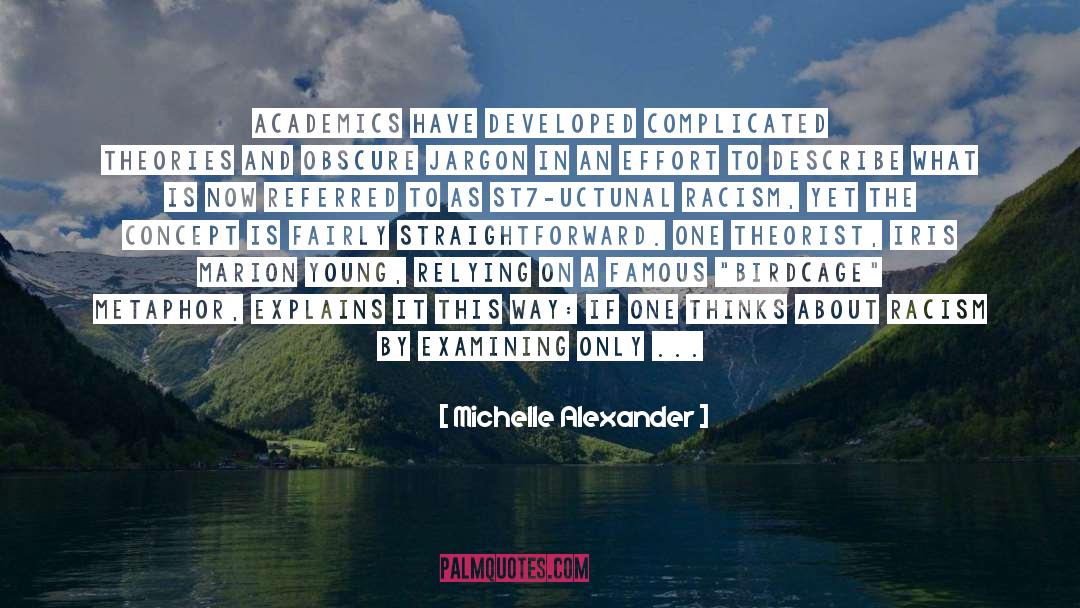
Segregation laws were proposed as part of a deliberate effort to drive a wedge between poor whites and African Americans. These discriminatory barriers were designed to encourage lower-class whites to retain a sense of superiority over blacks, making it far less likely that they would sustain interracial political alliances aimed at toppling the white elite.
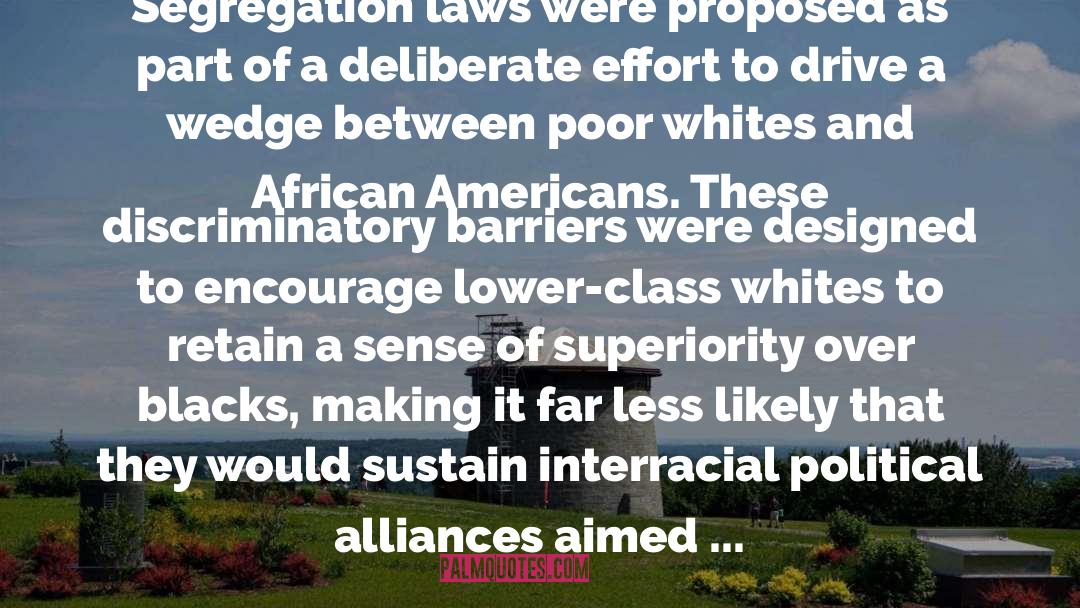
No other country in the world imprisons so many of its racial or ethnic minorities. The United States imprisons a larger percentage of its black population than South Africa did at the height of apartheid
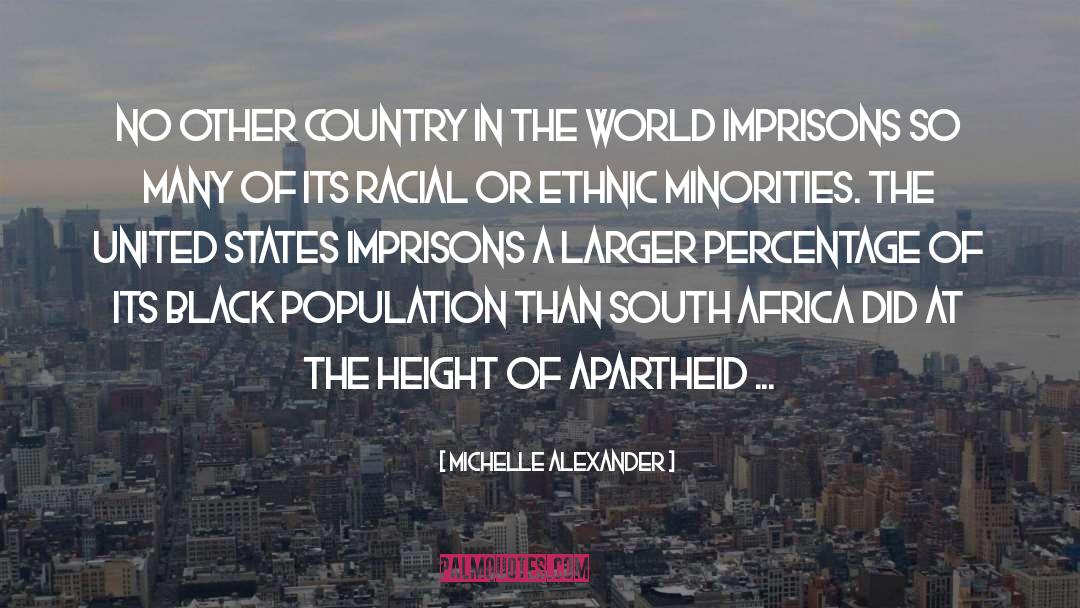
Major cities wracked by the drug war, as many as 80 percent of young African American men now have criminal records and are thus subject to legalized discrimination for the rest of their lives.
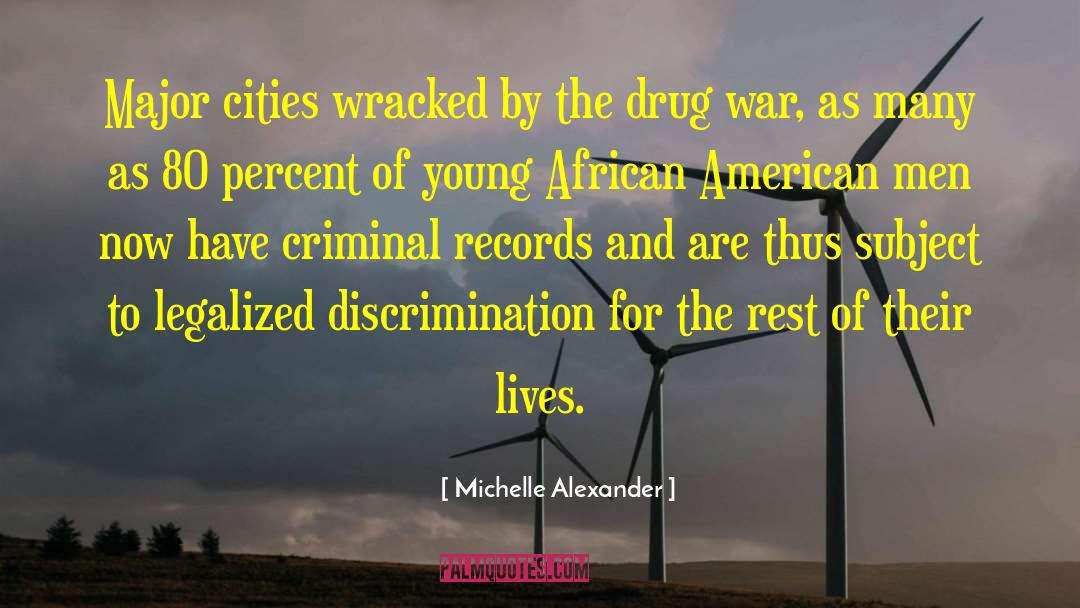
This book argues that mass incarceration is, metaphorically, the New Jim Crow and that all those who care about social justice should fully commit themselves to dismantling this new racial caste system.
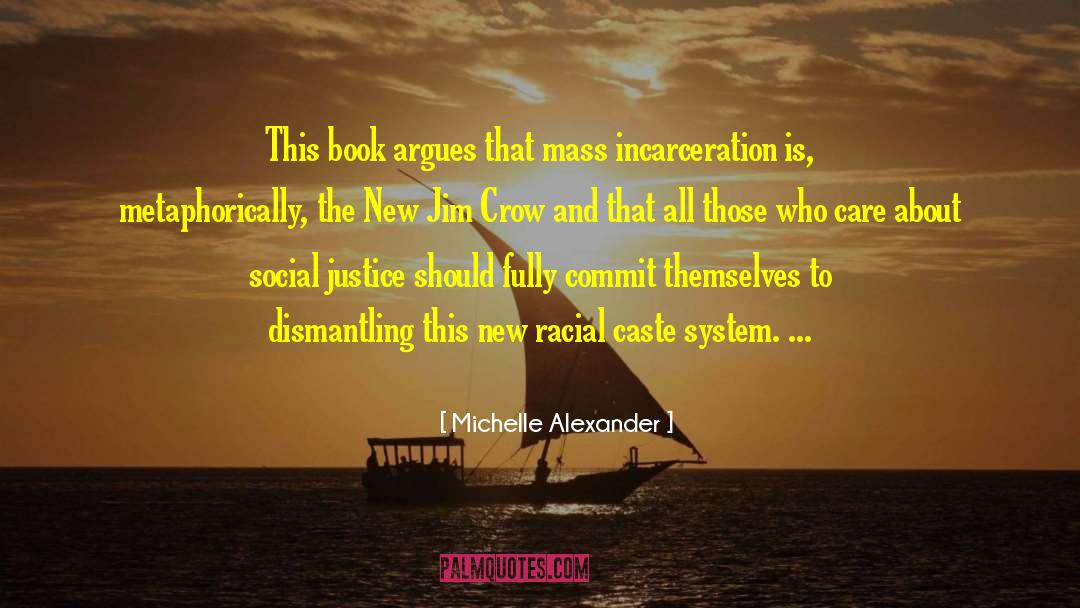
More than 2 million people found themselves behind bars at the turn of the twenty-first century, and millions more were relegated to the margins of mainstream society, banished to a political and social space not unlike Jim Crow, where discrimination in employment, housing, and access to education was perfectly legal, and where they could be denied the right to vote.
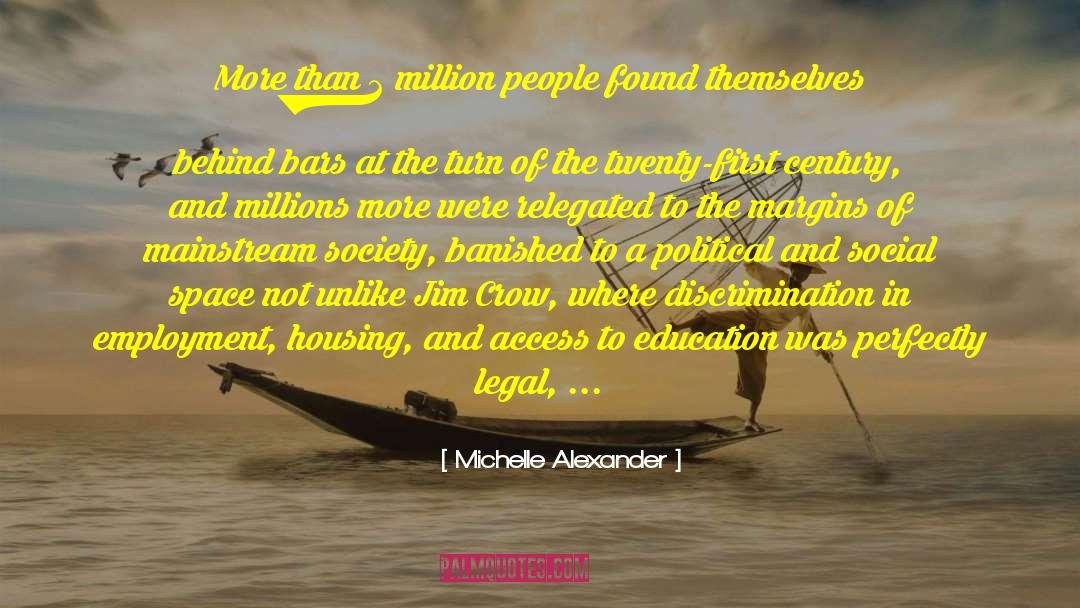
The genius of the current caste system, and what most distinguishes it from its predecessors, is that it appears voluntary. People choose to commit crimes, and that's why they are locked up or locked out, we are told. This feature makes the politics of responsibility particularly tempting, as it appears the system can be avoided with good behavior. But herein lies the trap. All people make mistakes. All of us are sinners. All of us are criminals. All of us violate the law at some point in our lives. In fact, if the worst thing you have ever done is speed ten miles over the speed limit on the freeway, you have put yourself and others at more risk of harm than someone smoking marijuana in the privacy of his or her living room. Yet there are people in the United States serving life sentences for first-time drug offenses, something virtually unheard of anywhere else in the world.
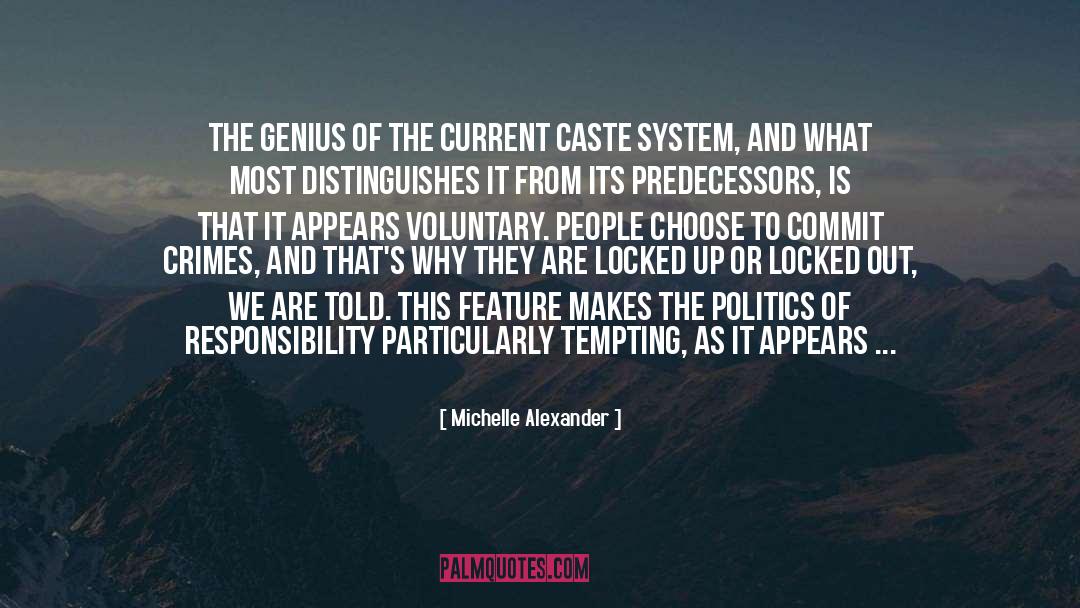
The "whites only" signs may be gone, but new signs have gone up - notices placed in job applications, rental agreements, loan applications, forms for welfare benefits, school applications, and petitions for licenses, informing the general public that "felons" are not wanted here. A criminal record today authorizes precisely the forms of discrimination we supposedly left behind - discrimination in employment, housing, education, public benefits, and jury service. Those labeled criminals are even denied the right to vote.
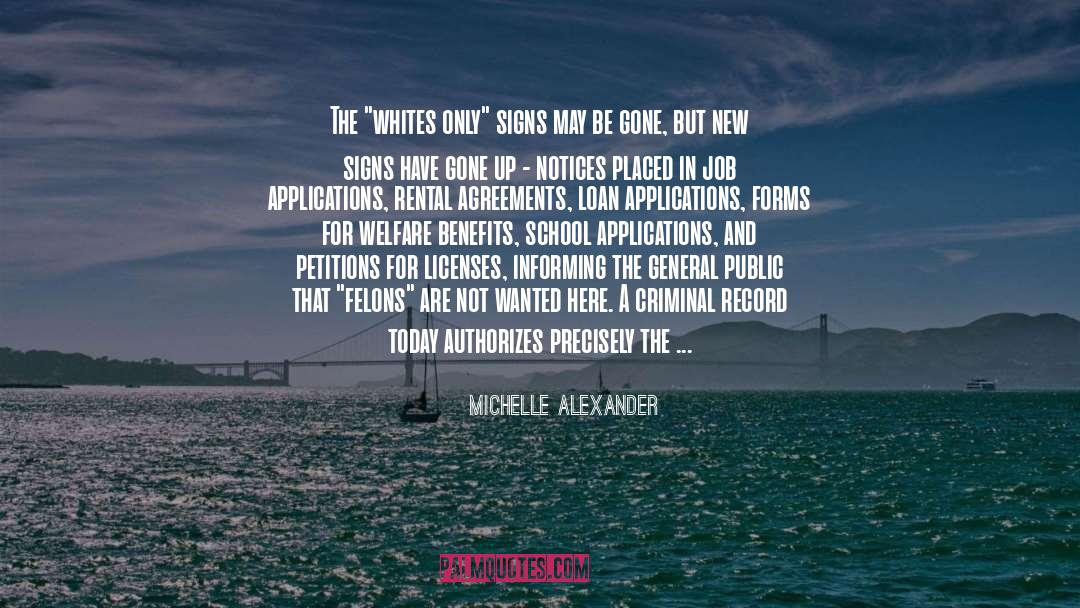
If you ask for good schools, you aren't likely to get them. If you ask for jobs or economic investment, you won't get that either. But what we have learned, is that the one thing that poor folks of color can ask for and get are Police & Prisons.
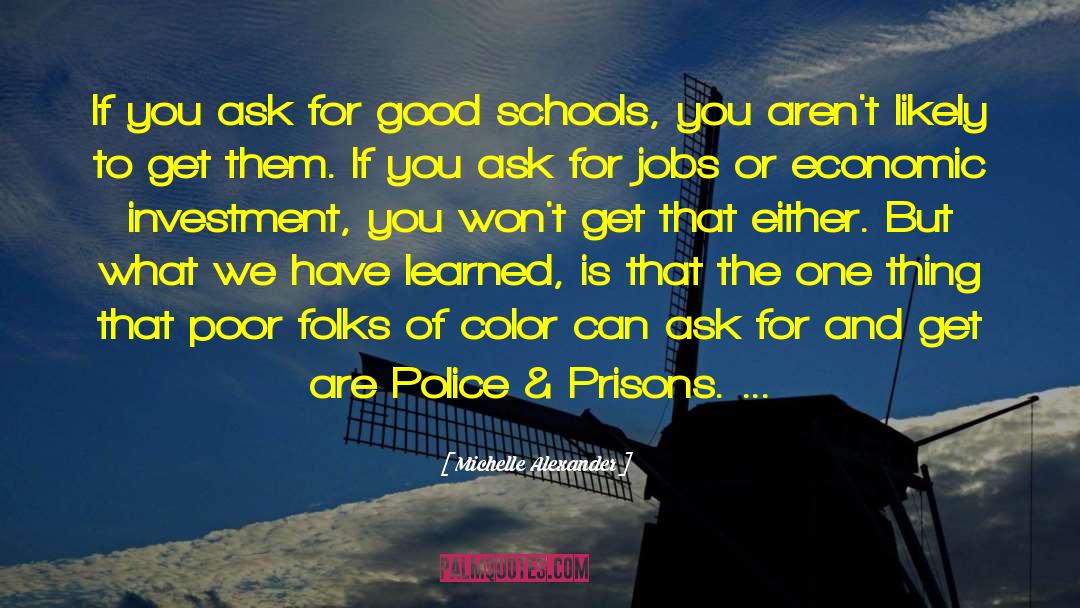
It is impossible to know for certain how many innocent drug defendants convict themselves every year by accepting a plea bargain out of fear of mandatory sentences,
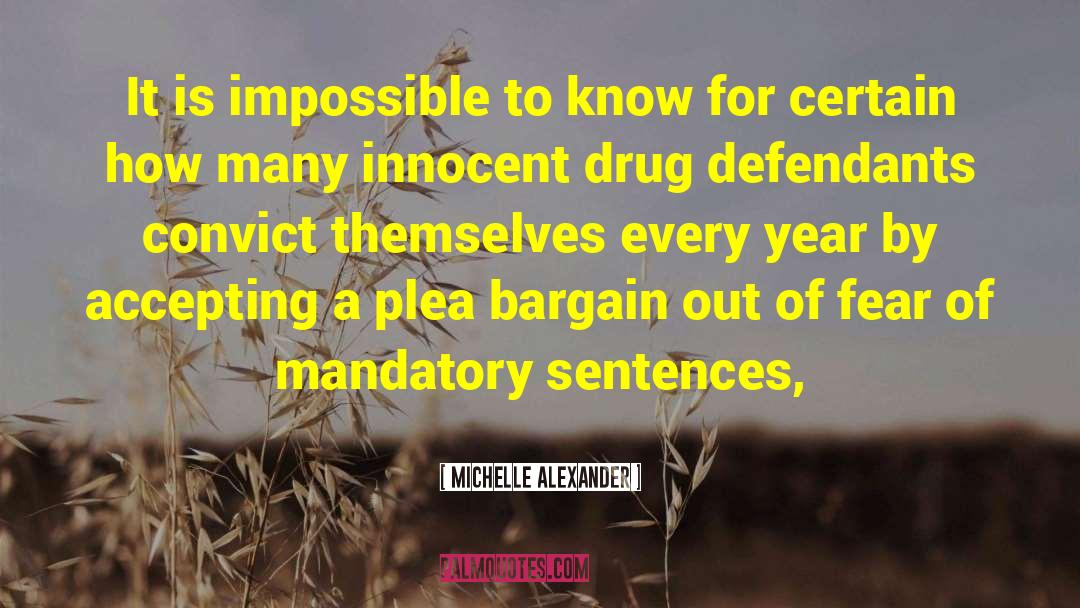
Conversations about class are resisted in part because there is a tendency to imagine that one's class reflects upon one's character. What is key to America's understanding of class is the persistent belief - despite all evidence to the contrary - that anyone, with the proper discipline and drive, can move from a lower class to a higher class. We recognize that mobility may be difficult, but the key to our collective self-image is the assumption that mobility is always possible, so failure to move up reflects on one's character. By extension, the failure of a race or ethnic group to move up reflects very poorly on the group as a whole. What
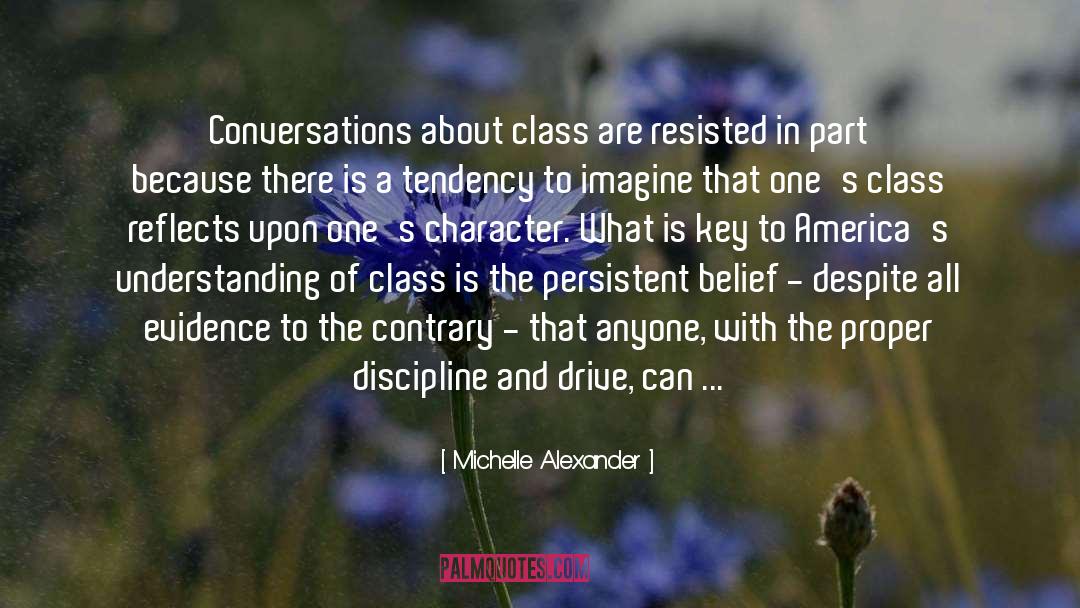
Seeing race is not the problem. Refusing to care for the people we see is the problem. The fact that the meaning of race may evolve over time or lose much of its significance is hardly a reason to be struck blind. We should hope not for a colorblind society but instead for a world in which we can see each other fully, learn from each other, and do what we can to respond to each other with love. That was King's dream - a society that is capable of seeing each of us, as we are, with love. That is a goal worth fighting for.
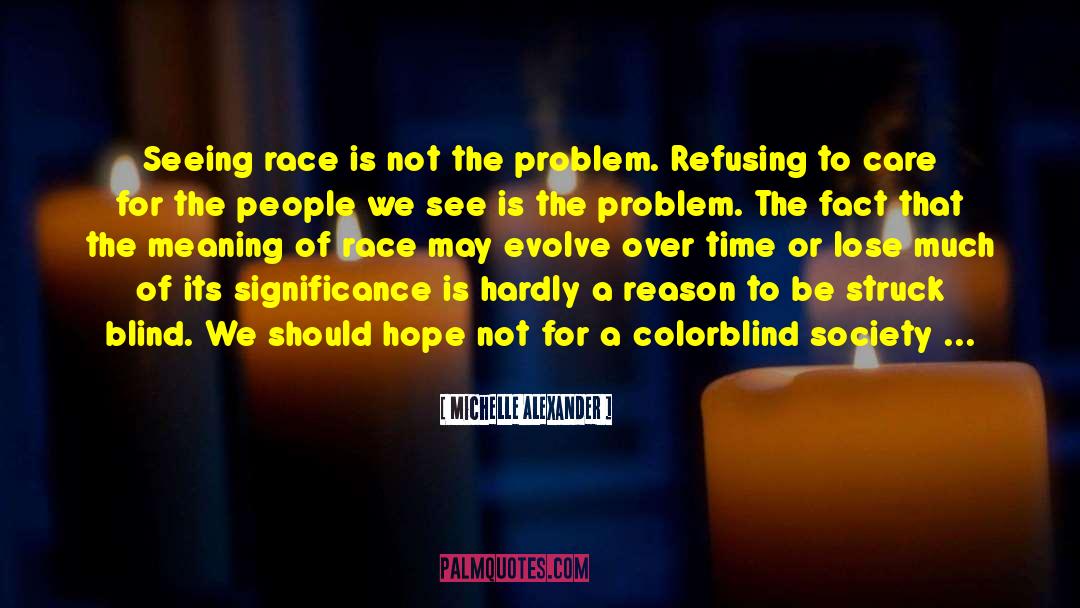
In Waquant's words: "Racial division was a consequence, not a precondition of slavery, but once it was instituted it became detached from its initial function and acquired a social potency all its own." After the death of slavery, the idea of race lived on/
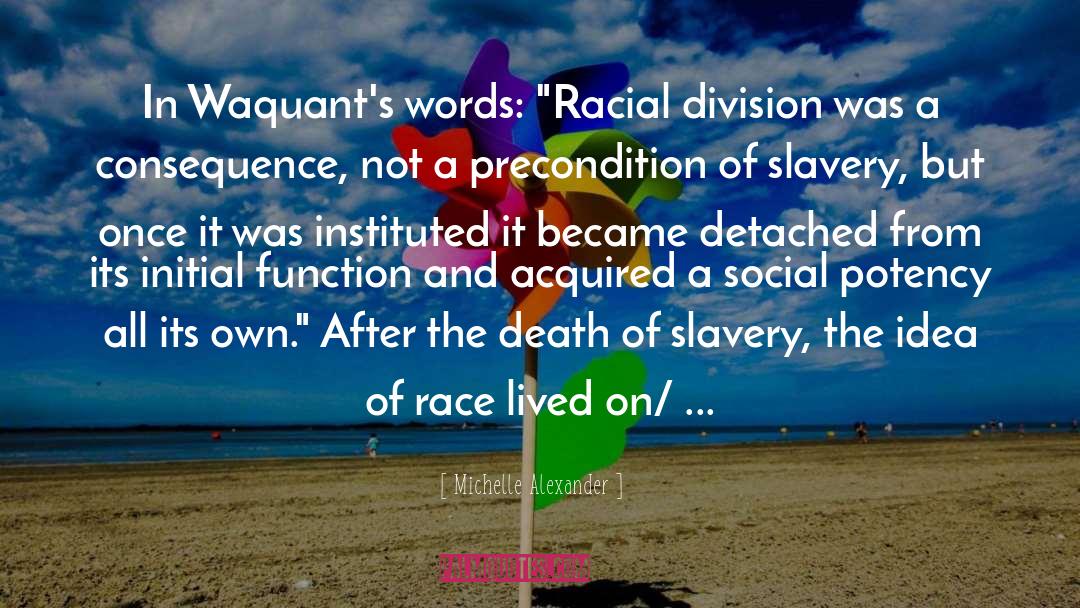
There is absolutely nothing surprising about a severely stigmatized group embracing their stigma. Psychologists have long observed that when people feel hopelessly stigmatized, a powerful coping strategy–often the only apparent route to self-esteem–is embracing one's stigmatized identity. Hence, 'black is beautiful' and 'gay pride'–slogans and anthems of the political movements aimed at ending not only legal discrimination, but the stigma that justified it. Indeed, the act of embracing one's stigma is never merely a psychological maneuver; it is a political act–an act of resistance and deviance in a society that seeks to demean a group based on an inalterable trait. As a gay activist once put it, 'Only by fully embracing the stigma itself can one neutralize the sting and make it laughable.
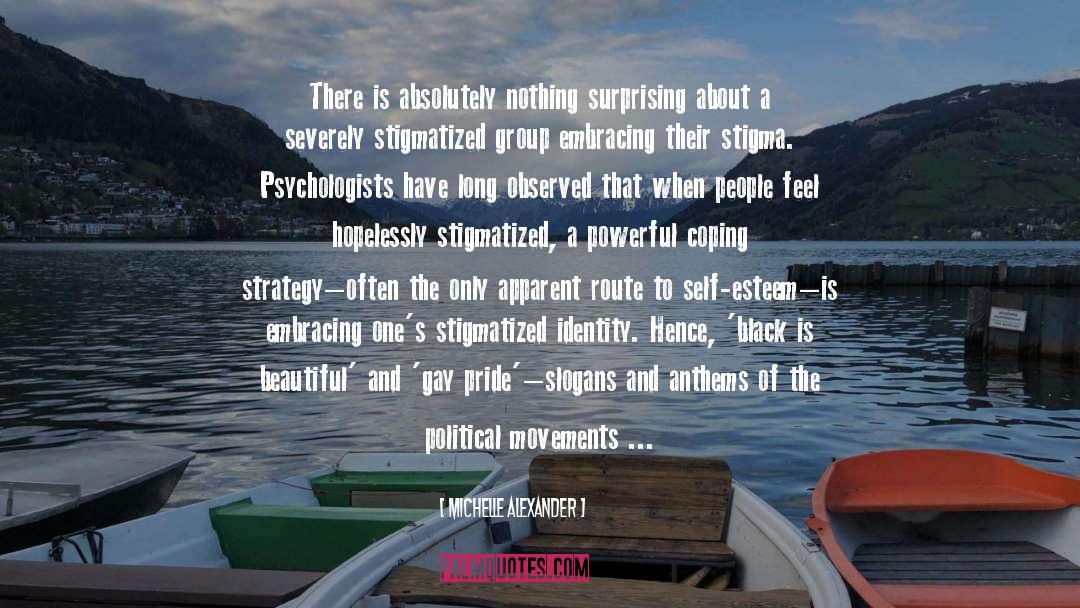
As legal scholar David Cole has observed, "The Court has imposed nearly insurmountable barriers to persons challenging race discrimination at all stages of the criminal justice system."92 The barriers are so high that few lawsuits are even filed, notwithstanding shocking and indefensible racial disparities.
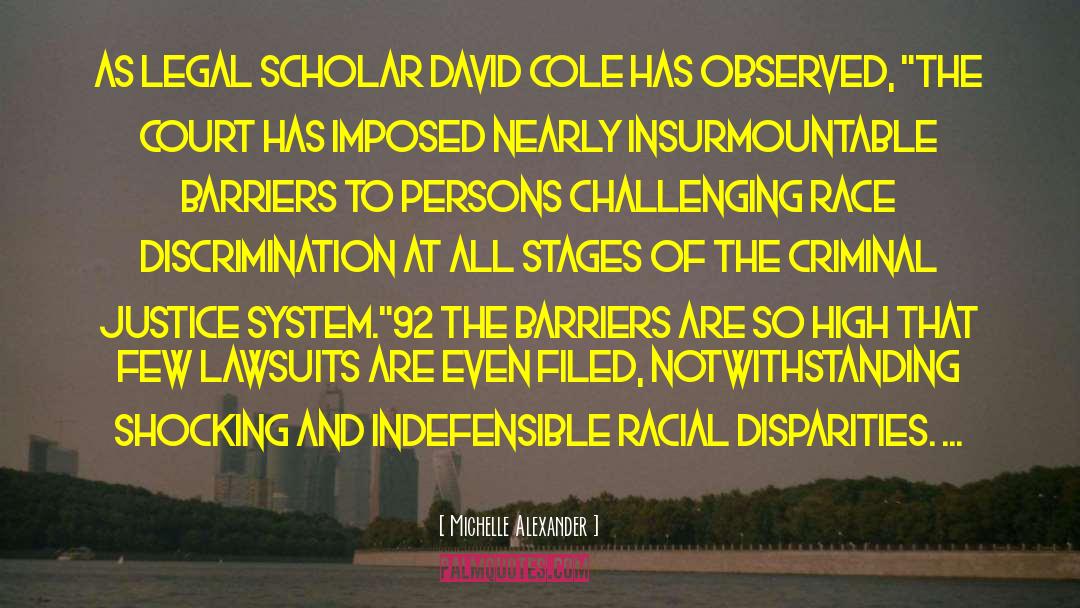
Service was practically
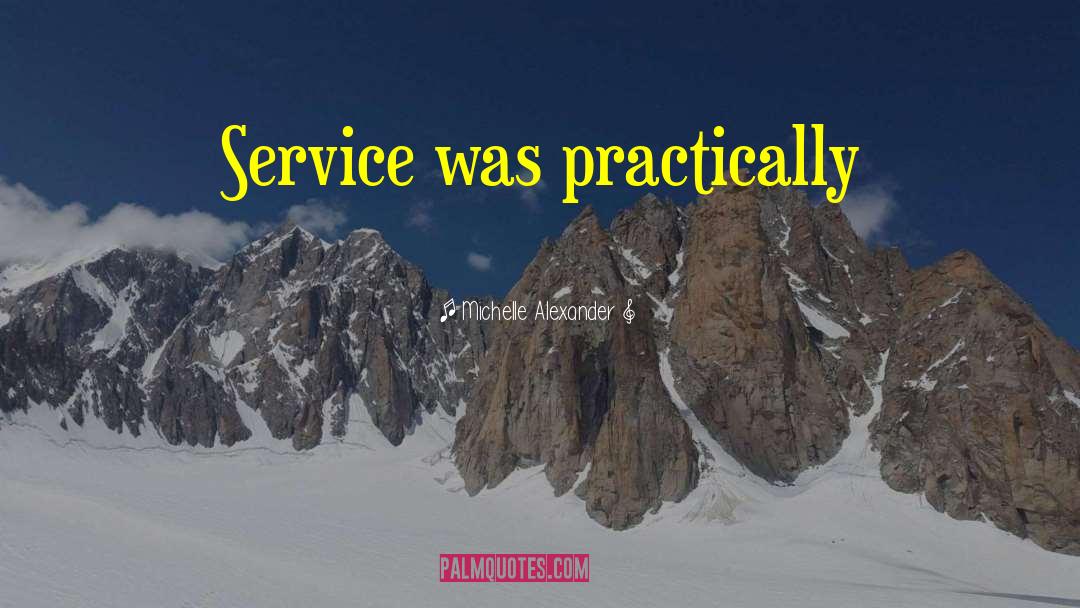
In the era of colorblindness, it is no longer socially permissible to use race, explicitly, as a justification for discrimination, exclusion, and social contempt. So we don't. Rather than rely on race, we use our criminal justice system to label people of color "criminals" and then engage in all the practices we supposedly left behind. Today it is perfectly legal to discriminate against criminals in nearly all the ways that it was once legal to discriminate against African Americans. Once you're labeled a felon, the old forms of discrimination - employment discrimination, housing discrimination, denial of the right to vote, denial of educational opportunity, denial of food stamps and other public benefits, and exclusion from jury service - are suddenly legal. As a criminal, you have scarcely more rights, and arguably less respect, than a black man living in Alabama at the height of Jim Crow. We have not ended racial caste in America; we have merely redesigned it.
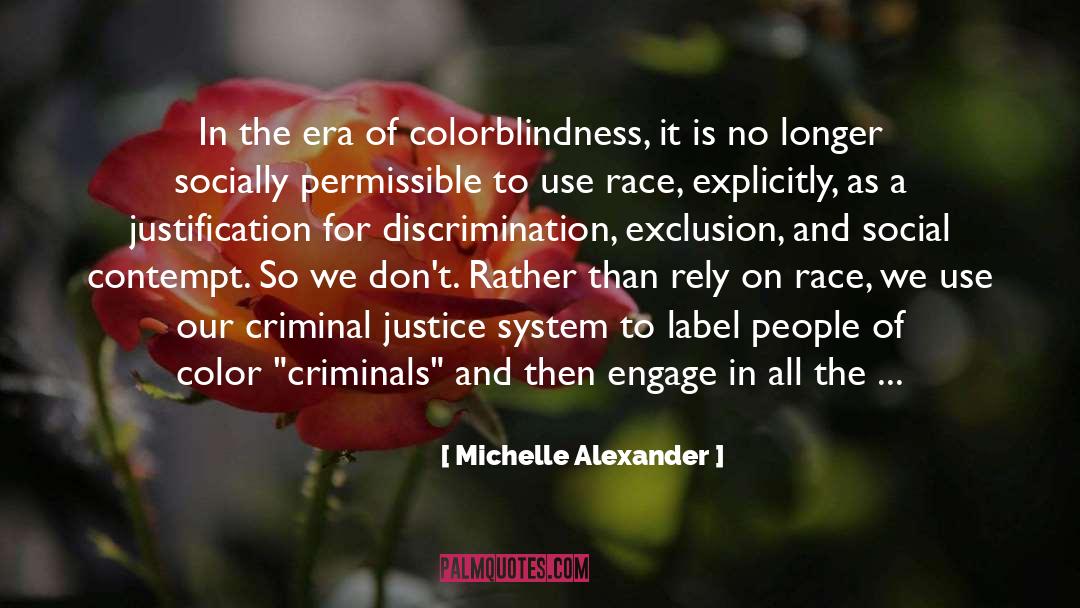
The rhetoric of 'law and order' was first mobilized in the late 1950s as Southern governors and law enforcement officials attempted to generate and mobilize white opposition to the Civil Rights Movement. In the years following Brown v. Board of Education, civil rights activists used direct-action tactics in an effort to force reluctant Southern States to desegregate public facilities. Southern governors and law enforcement officials often characterized these tactics as criminal and argued that the rise of the Civil Rights Movement was indicative of a breakdown of law and order. Support of civil rights legislation was derided by Southern conservatives as merely 'rewarding lawbreakers.'
For more than a decade – from the mid 1950s until the late 1960s – conservatives systematically and strategically linked opposition to civil rights legislation to calls for law and order, arguing that Martin Luther King Jr.'s philosophy of civil disobedience was a leading cause of crime.
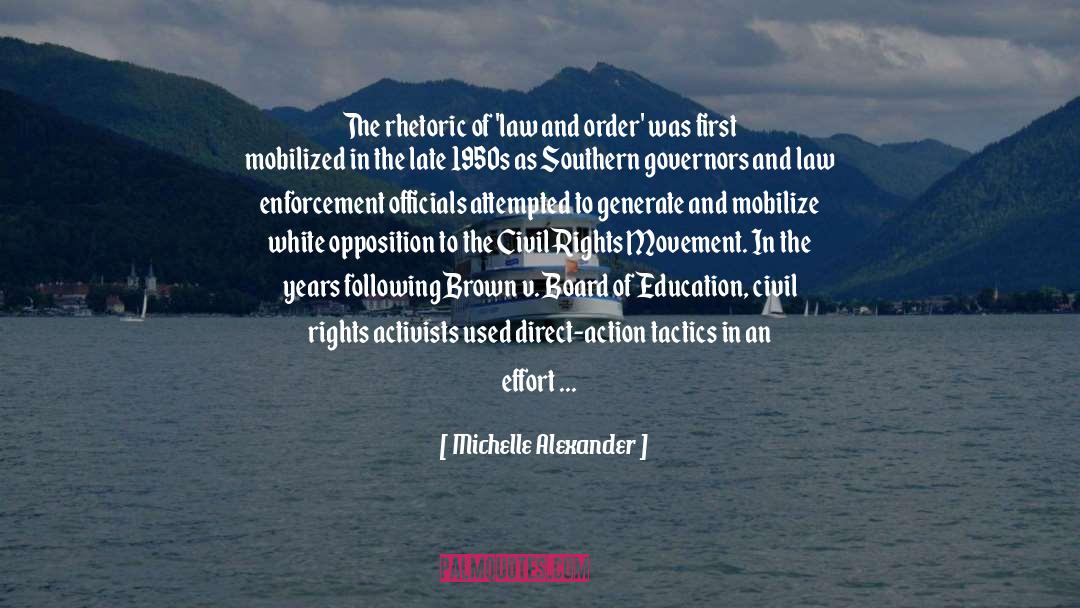
President Reagan officially announced his administration's War on Drugs. At the time...less than 2 percent of the American public viewed drugs as the most important issue facing the nation. This fact was no deterrent to Reagan, for the drug war from the outset had little to do with public concern about drugs and much to do with public concern about race.
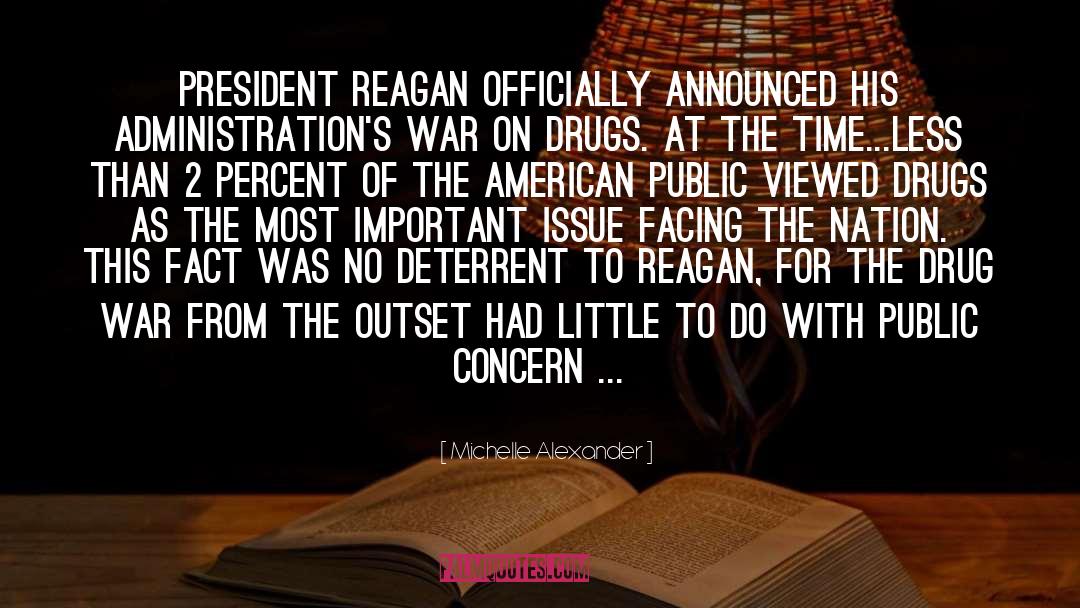
Drug-war forfeiture laws are frequently used to allow those with assets to buy their freedom, while drug users and small-time dealers with few assets to trade are subjected to lengthy prison terms.
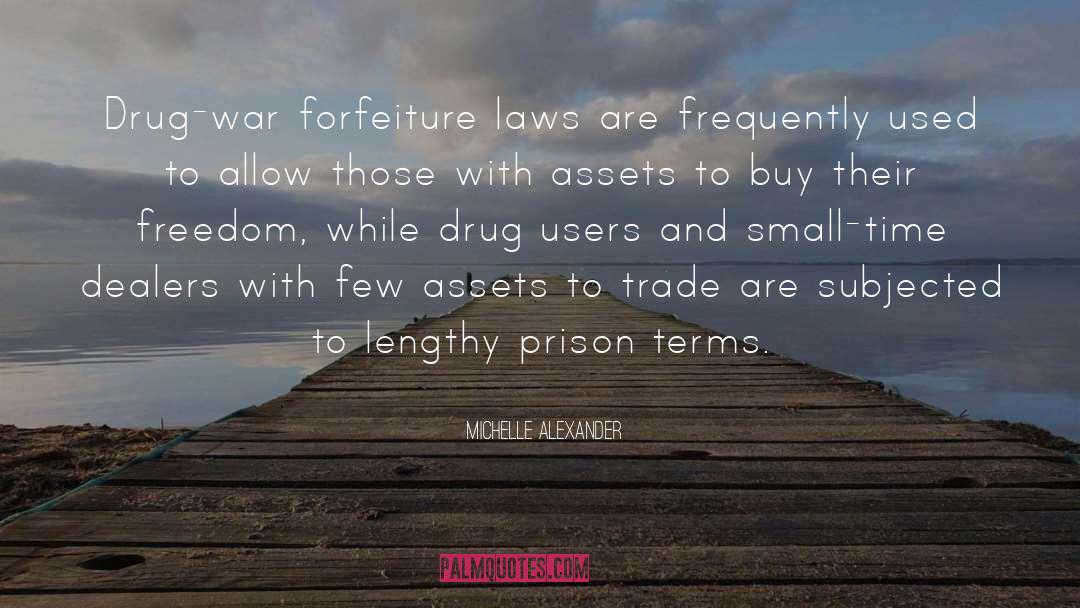
The number of annual drug arrests more than tripled between 1980 and 2005, as drug sweeps and suspicionless stops and searches proceeded in record numbers.
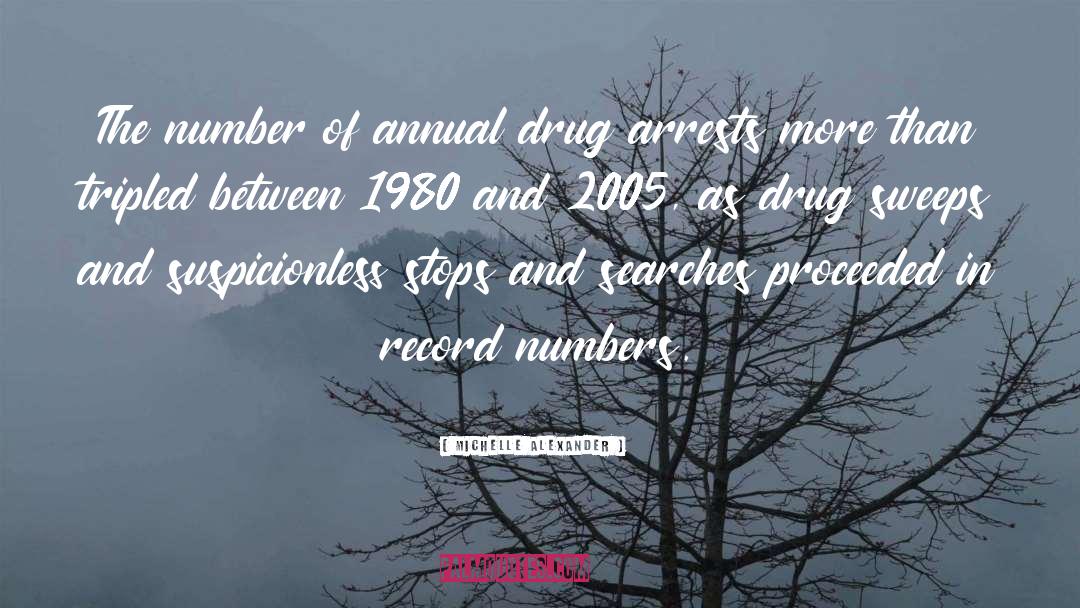
White supremacy, over time, became a religion of sorts. Faith in the idea that people of the African race were bestial, that whites were inherently superior, and that slavery was, in fact, for black's own good, served to alleviate the white conscience and reconcile the tension between slavery and the democratic ideals espoused by whites in the so-called New World. There was no contradiction in the bold claim made by Thomas Jefferson in the Declaration of Independence that 'all men are created equal' if Africans were not really people.
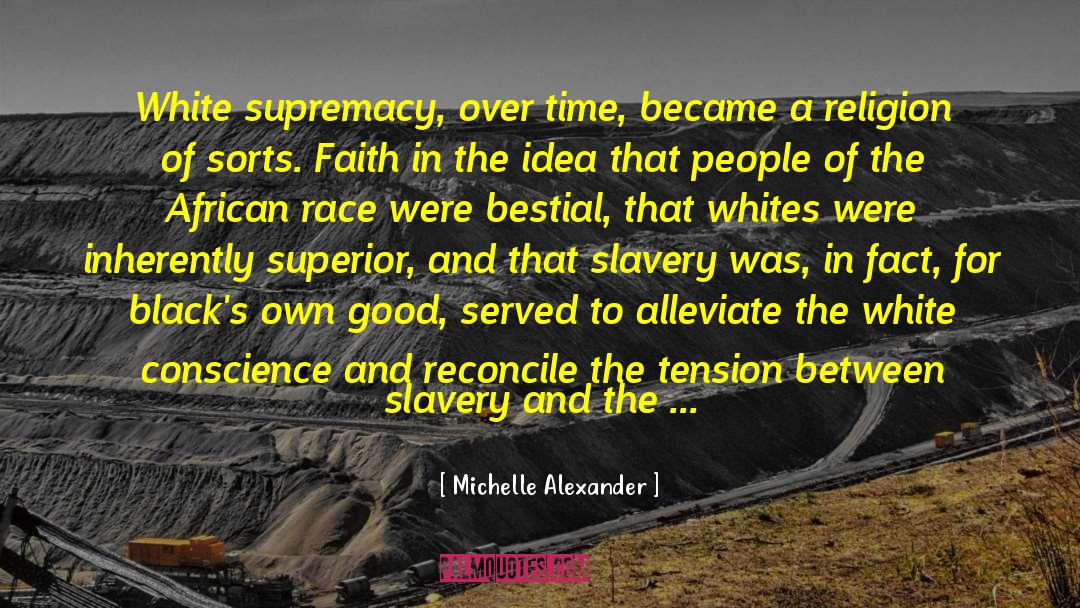
Although a million black men can be found in prisons and jails, public acknowledgment of the role of the criminal justice system in "disappearing" black men is surprisingly rare. ... Hundreds of thousands of black men are unable to be good fathers for their children, not because of a lack of commitment or desire but because they are warehoused in prisons, locked in cages. They did not walk out on their families voluntarily; they were taken away in handcuffs, often due to a massive federal program known as the War on Drugs.
